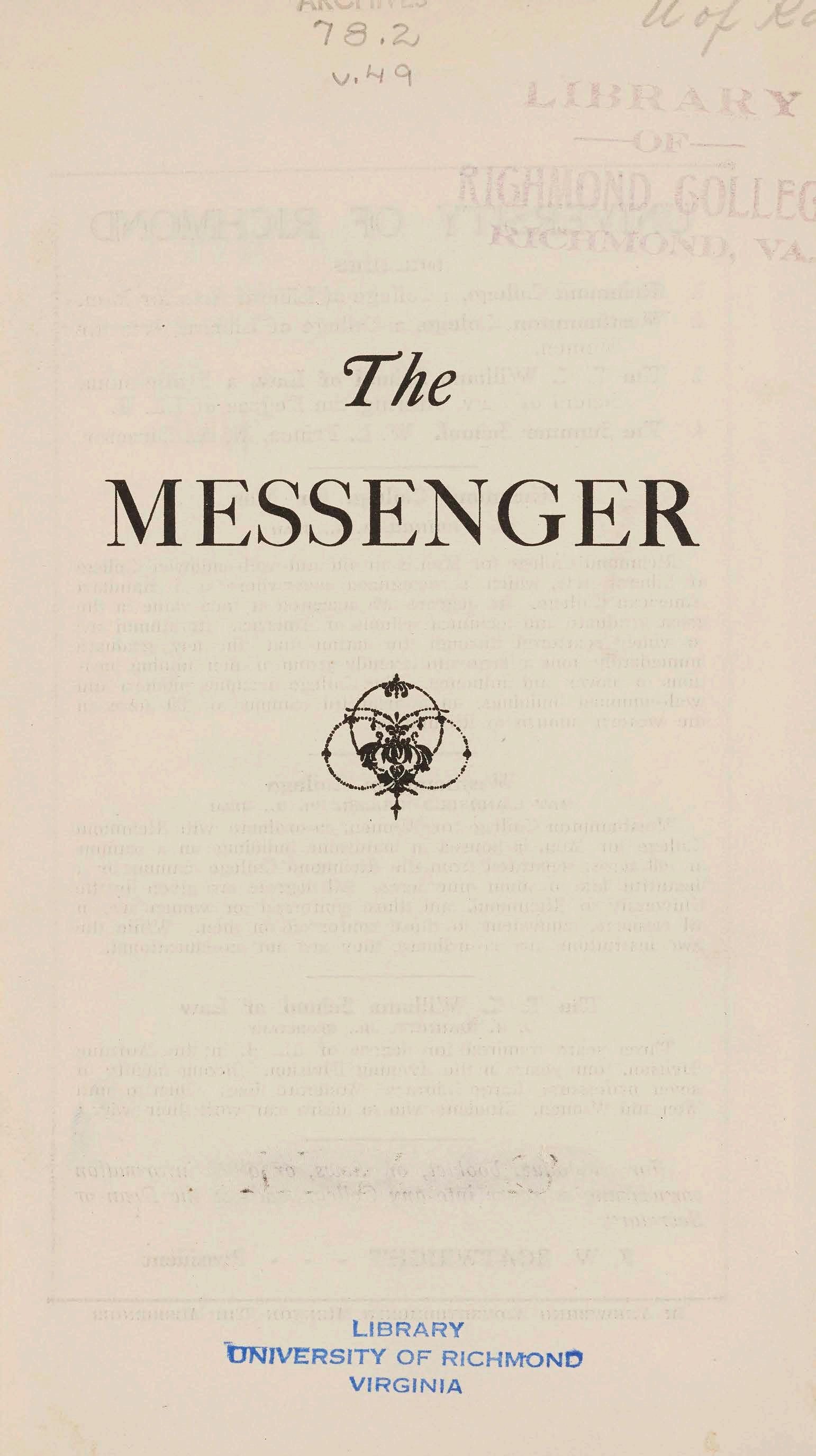

'The MESSENGER
UNIVERSITYOF RICHMONDl
1. 2. 3.
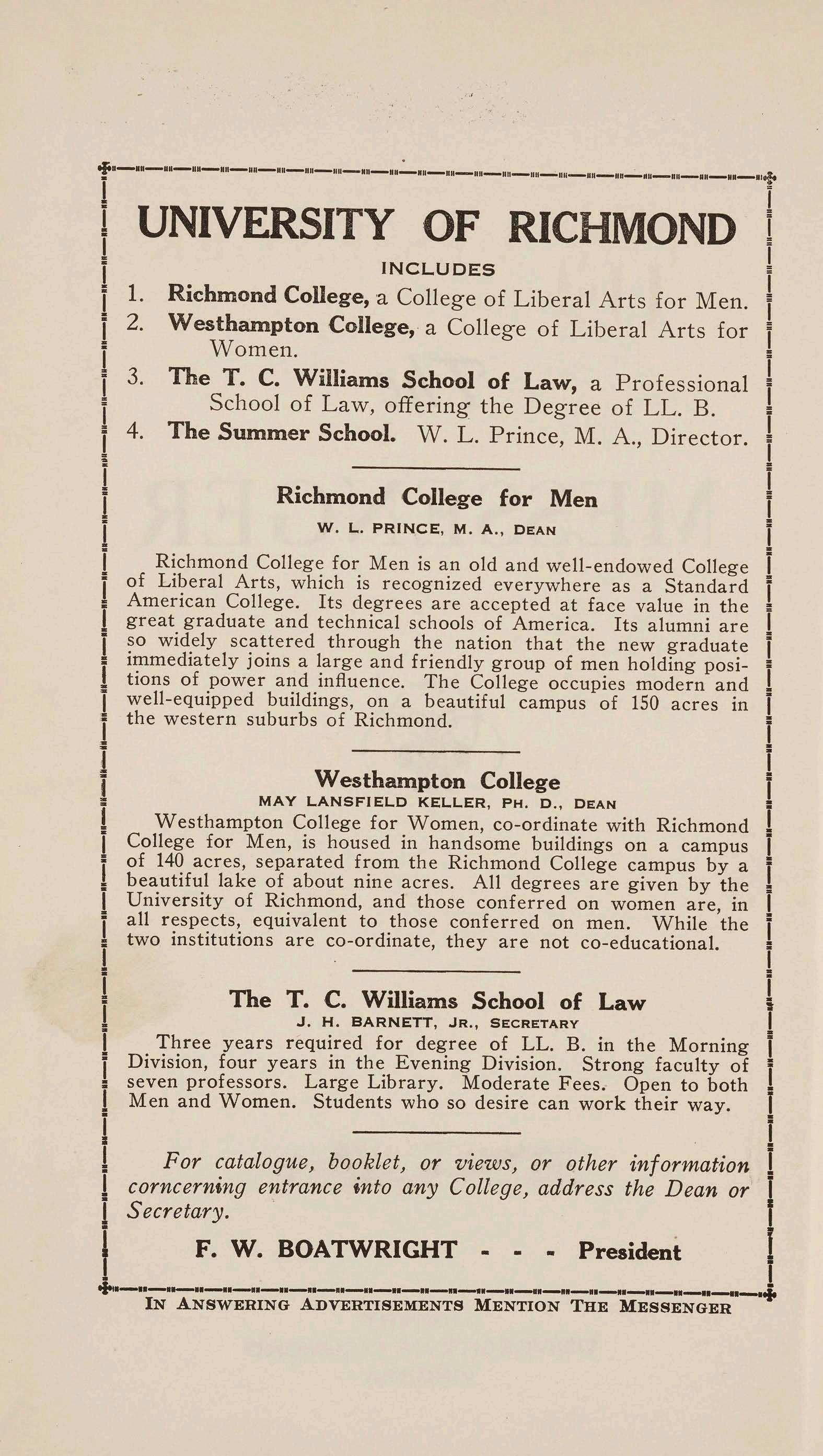
INCLUDES
Richmond College, a College of Liberal Arts for Men. Westhampton College, a College of Liberal Arts for Women.
The T. C. Williams School of Law, a Professional School of Law, offering the Degree of LL. B.
• 4. The Summer School. W. L. Prince, M.A., Director .
Richmond College for Men
W . L. PRINCE, M. A., DEAN
Richmond College for Men is an old and well-endowed College of Liberal Arts, which is recognized everywhere as a Standard American College. Its degrees are accepted at face value in the great graduate and technical schools of America. Its alumni are so widely scattered through the nation that the new graduate immediately joins a large and friendly group of men holding posi- tions of power and influence. The College occupies modern and j well-equipped buildings, on a beautiful campus of 150 acres in j the western suburbs of Richmond. i i i I
Westhampton College
MAY LANSFIELD KELLER, PH. D. , DEAN
Westhampton College for Women, co-ordinate with Richmond College for Men, is housed in handsome buildings on a campus of 140 acres, separated from the Richmond College campus by a beautiful lake of about nine acres. All degrees are given by the University of Richmond, and those conferred on women are, in all respects, equivalent to those conferred on men. While the two institutions are co-ordinate, they are not co-educational.
The T. C. Williams School of Law
J. H. BARNETT, JR., SECRETARY
Three years required for degree of LL. B. in the Morning Division, four years in the Evening Division Strong faculty of seven professors. Large Library. Moderate Fees. Open to both Men and Women. Students who so desire can work their way.
For catalogue, booklet, or views, or other information j corncerning entrance tnto any Callege, address the Dean or i Secretary. f
THE MESSENGER
Subscription Price, $1.50 Per Annum
Entered at the Post Office at University of Richmond, Va., as second-class matter.
VOL. XLIX
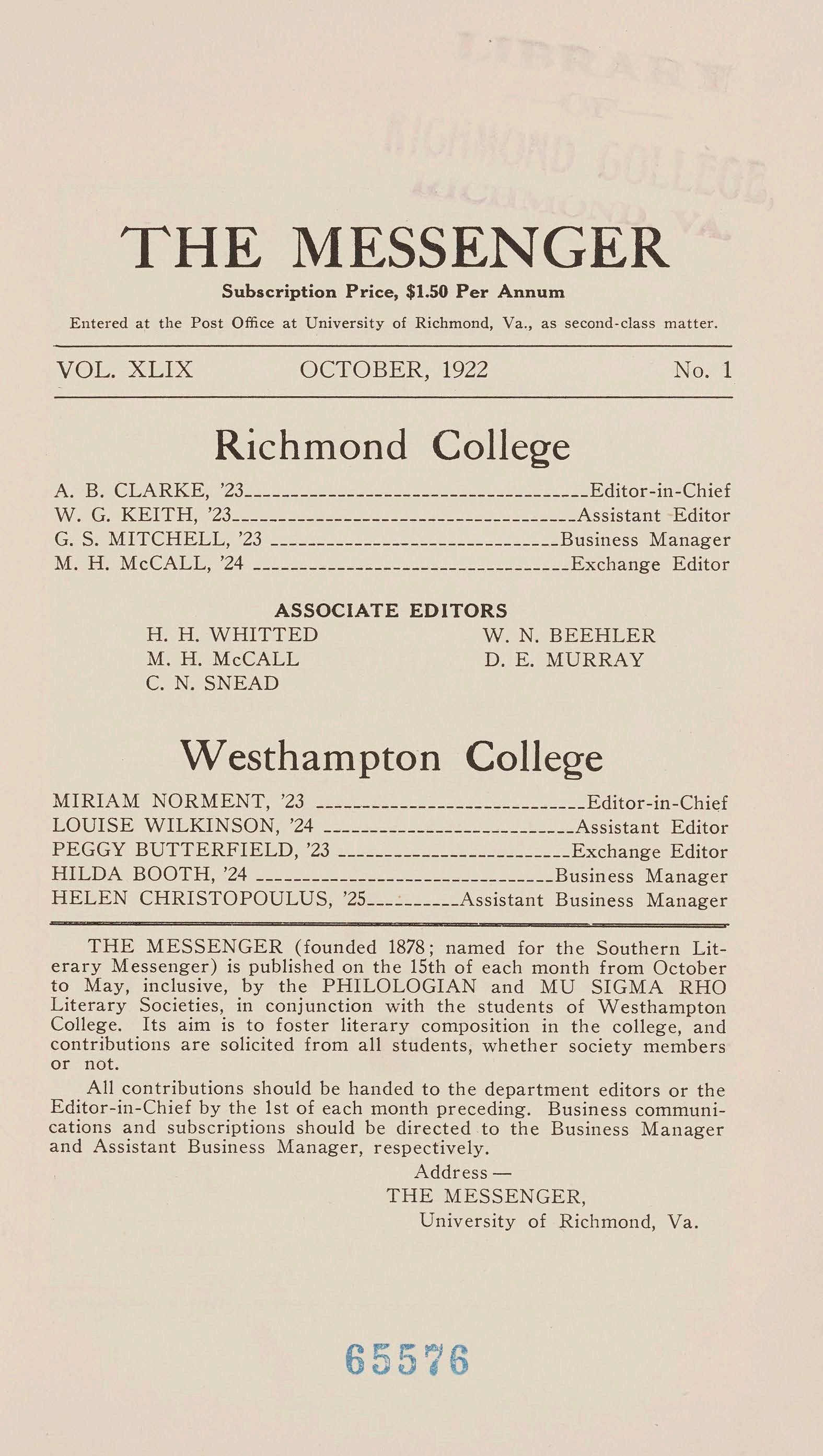
OCTOBER, 1922 No. 1
Richmond College
A. B. CLARKE, '23_____________________________________Editor-in-Chief
W. G. KEITH, '23 _____________________________________Assistant Editor
G. S. MITCHELL, '23 _______________________________Business Manager
M. H. McCALL, '24 __________________________________Exchange Editor
ASSOCIATE EDITORS
H. H. WHITTED
M. H. McCALL
C. N. SNEAD
W. N. BEEHLER
D . E. MURRAY
Westhampton College
MIRIAM NORMENT, '23 _____________________________Editor-in-Chief
LOUISE WILKINSON, '24 ___________________________Assistant Editor
PEGGY BUTTERFIELD, '23 _________________________Exchange Editor
HILDA BOOTH, '24 ________________________________Business Manager HELEN CHRISTOPOULUS, '25__________Assistant Business Manager
THE MESSENGER (founded 1878; named for the Southern Literary Messenger) is published on the 15th of each month from October to May, inclusive, by the PHILOLOGIAN and MU SIGMA RHO Literary Societies, in conjunction with the students of Westhampton College. Its aim is to foster literary composition in the college, and contributions are solicited from all students, whether society members or not.
All contributions should be handed to the department editors or the Editor-in-Chief by the 1st of each month preceding. Business communications and subscriptions should be directed to the Business Manager and Assistant Business Manager, respectively.
AddressTHE MESSENGER, University of Richmond, Va.
MRS. M. L. SIZER
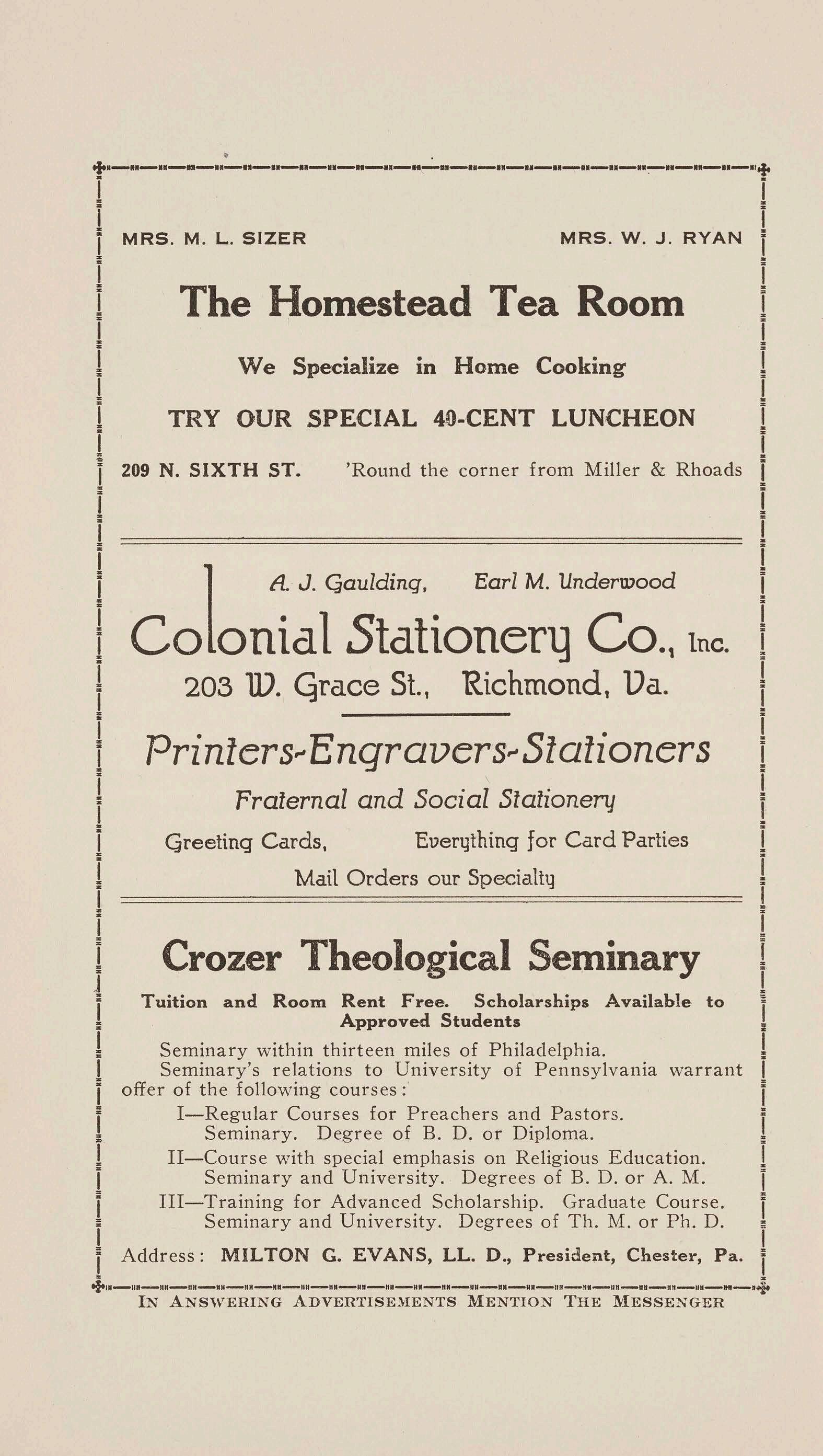
MRS. W. J RYAN
The Homestead Tea Room
We Specialize in Home Cooking
TRY OUR SPECIAL 40-CENT LUNCHEON
I 209 N. SIXTH ST. ' Round the corner from Miller & Rhoads
Prinlers.-Enqravers.-Stalioners
Fraternal and Social Stationery
Greeting Cards, EvertJthing for Card Parties
Mail Orders our Specialtl.]
Crozer Theological Seminary
Tuition and Room Rent Free. Scholarships Available to Approved Student&
Seminary within thirteen miles of Philadelphia.
Seminary's relations to University of Pennsylvania warrant offer of the following courses :·
I-Regular Courses for Preachers and Pastors. Seminary Degree of B. D. or Diploma.
II-Course with special emphasis on Religious Education. Seminary and University. Degrees of B. D. or A. M.
III-Training for Advanced Scholarship. Graduate Course . Seminary and University. Degrees of Th. M. or Ph. D.
Address: MIL TON G. EV ANS, LL. D., President, Chester, Pa.
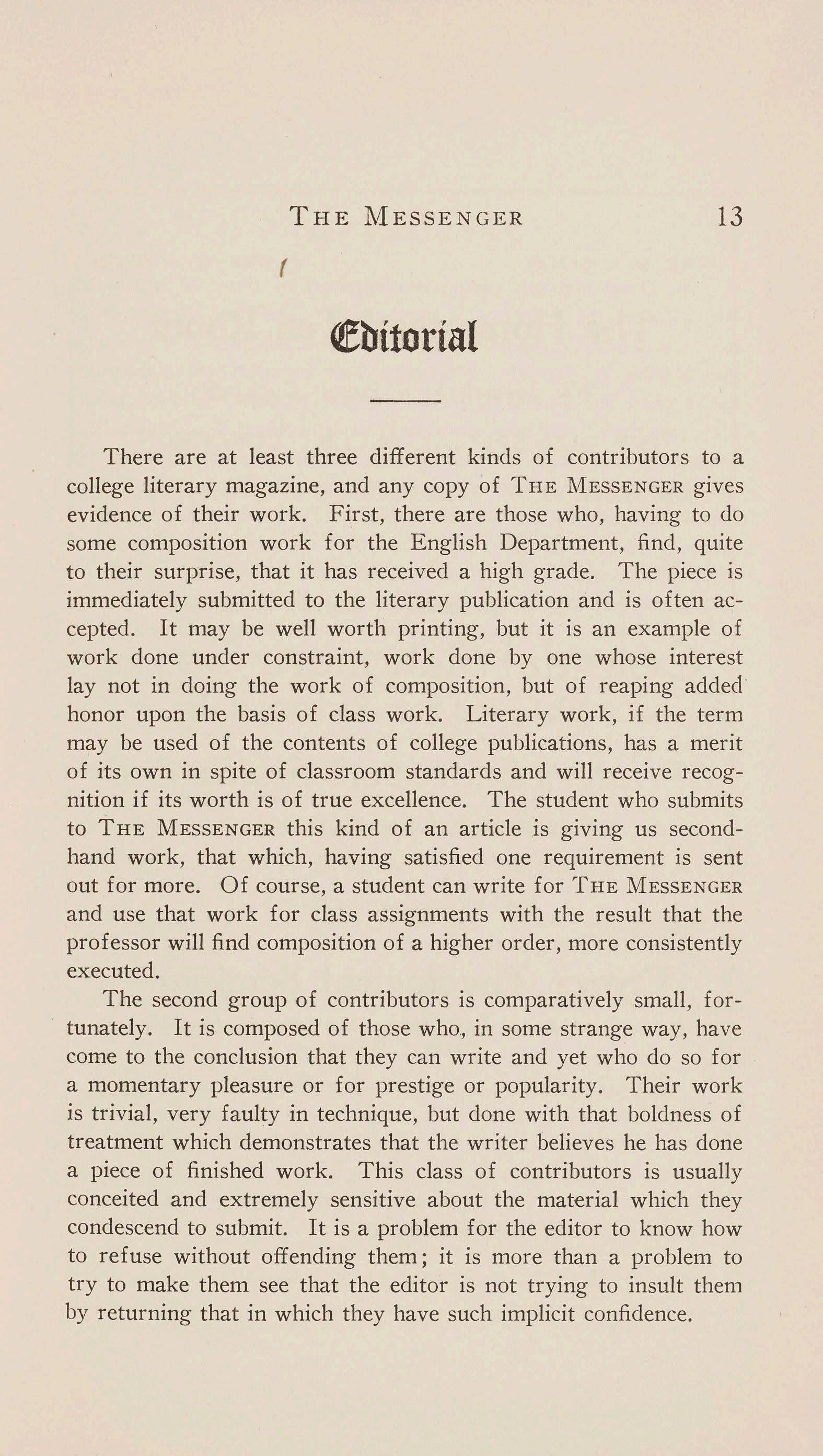
There are at least three different kinds of contributors to a college literary magazine, and any copy of THE MESSENGERgives evidence of their work. First, there are those who, having to do some composition work for the English Department, find, quite to their surprise, that it has received a high grade. The piece is immediately submitted to the literary publication and is often accepted. It may be well worth printing, but it is an example of work done under constraint, work done by one whose interest lay not in doing the work of composition, but of reaping added honor upon the basis of class work. Literary work, if the term may be used of the contents of college publications, has a merit of its own in spite of classroom standards and will receive recognition if its worth is of true excellence. The student who submits to THE MESSENGERthis kind of an article is giving us secondhand work, that which, having satisfied one requirement is sent out for more. Of course, a student can write for THE MESSENGER and use that work for class assignments with the result that the professor will find composition of a higher order, more consistently executed.
The second group of contributors is comparatively small, fortunately. It is composed of those who, in some strange way, have come to the conclusion that they can write and yet who do so for a momentary pleasure or for prestige or popularity. Their work is trivial, very faulty in technique, but done with that boldness of treatment which demonstrates that the writer believes he has done a piece of finished work. This class of contributors is usually conceited and extremely sensitive about the material which they condescend to submit. It is a problem for the editor to know how to refuse without offending them; it is more than a problem to try to make them see that the editor is not trying to insult them by returning that in which they have such implicit confidence.
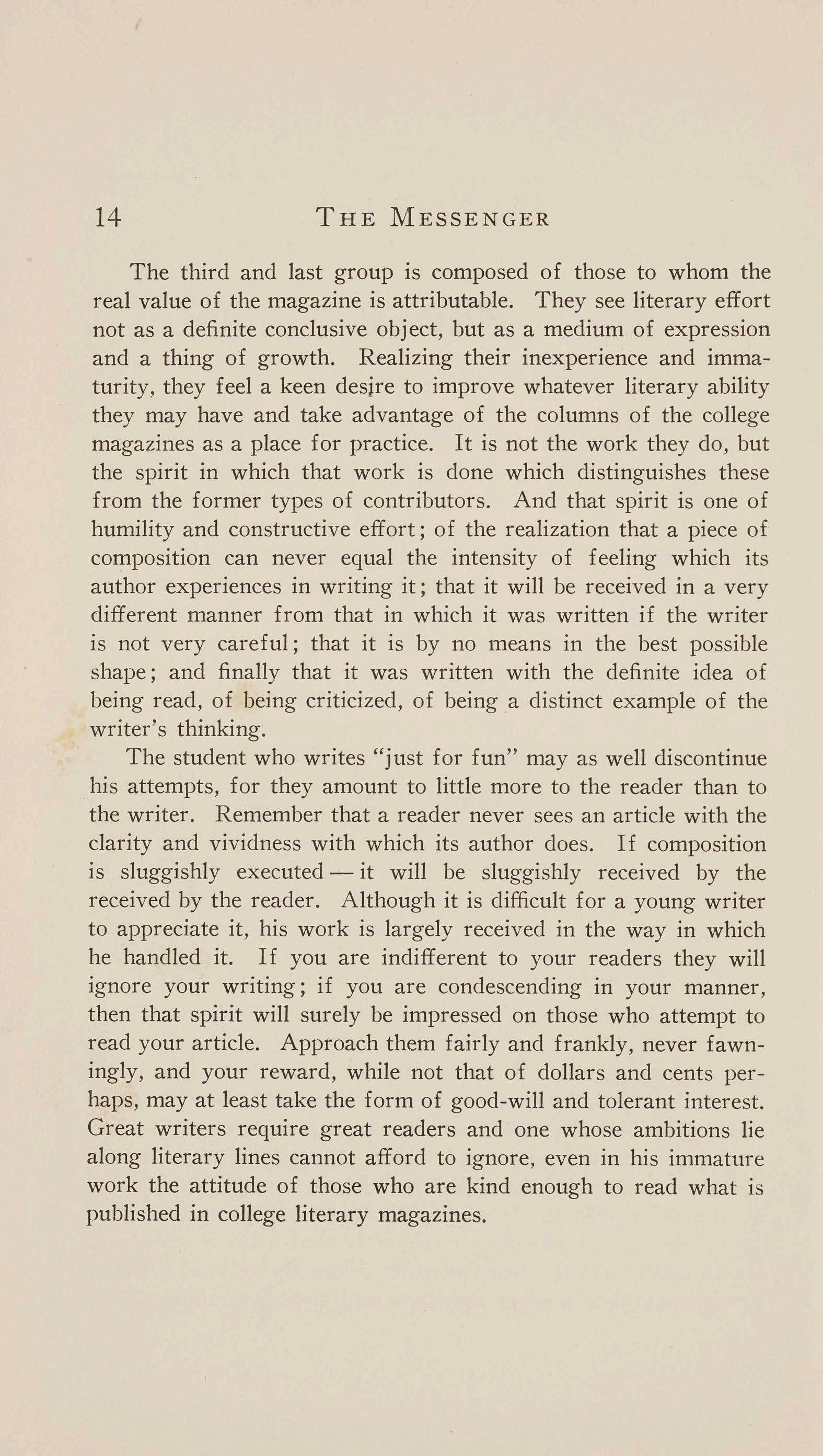
THE MESSENGER
The third and last group is composed of those to whom the real value of the magazine is attributable. They see literary effort not as a definite conclusive object, but as a medium of expression and a thing of growth. Realizing their inexperience and immaturity, they feel a keen desire to improve whatever literary ability they may have and take advantage of the columns of the college magazines as a place for practice. It is not the work they do, but the spirit in which that work is done which distinguishes these from the former types of contributors. And that spirit is one of humility and constructive effort; of the realization that a piece of composition can never equal the intensity of feeling which its author experiences in writing it; that it will be received in a very different manner from that in which it was written if the writer is not very careful; that it is by no means in the best possible shape; and finally that it was written with the definite idea of being read, of being criticized, of being a distinct example of the writer's thinking.
The student who writes "just for fun" may as well discontinue his attempts, for they amount to little more to the reader than to the writer. Remember that a reader never sees an article with the clarity and vividness with which its author does. If composition is sluggishly executed -it will be sluggishly received by the received by the reader. Although it is difficult for a young writer to appreciate it, his work is largely received in the way in which he handled it. If you are indifferent to your readers they will ignore your writing; if you are condescending in your manner, then that spirit will surely be impressed on those who attempt to read your article. Approach them fairly and frankly, never fawningly, and your reward, while not that of dollars and cents perhaps, may at least take the form of good-will and tolerant interest. Great writers require great readers and one whose ambitions lie along literary lines cannot afford to ignore, even in his immature work the attitude of those who are kind enough to read what is published in college literary magazines.
THE MESSENGER
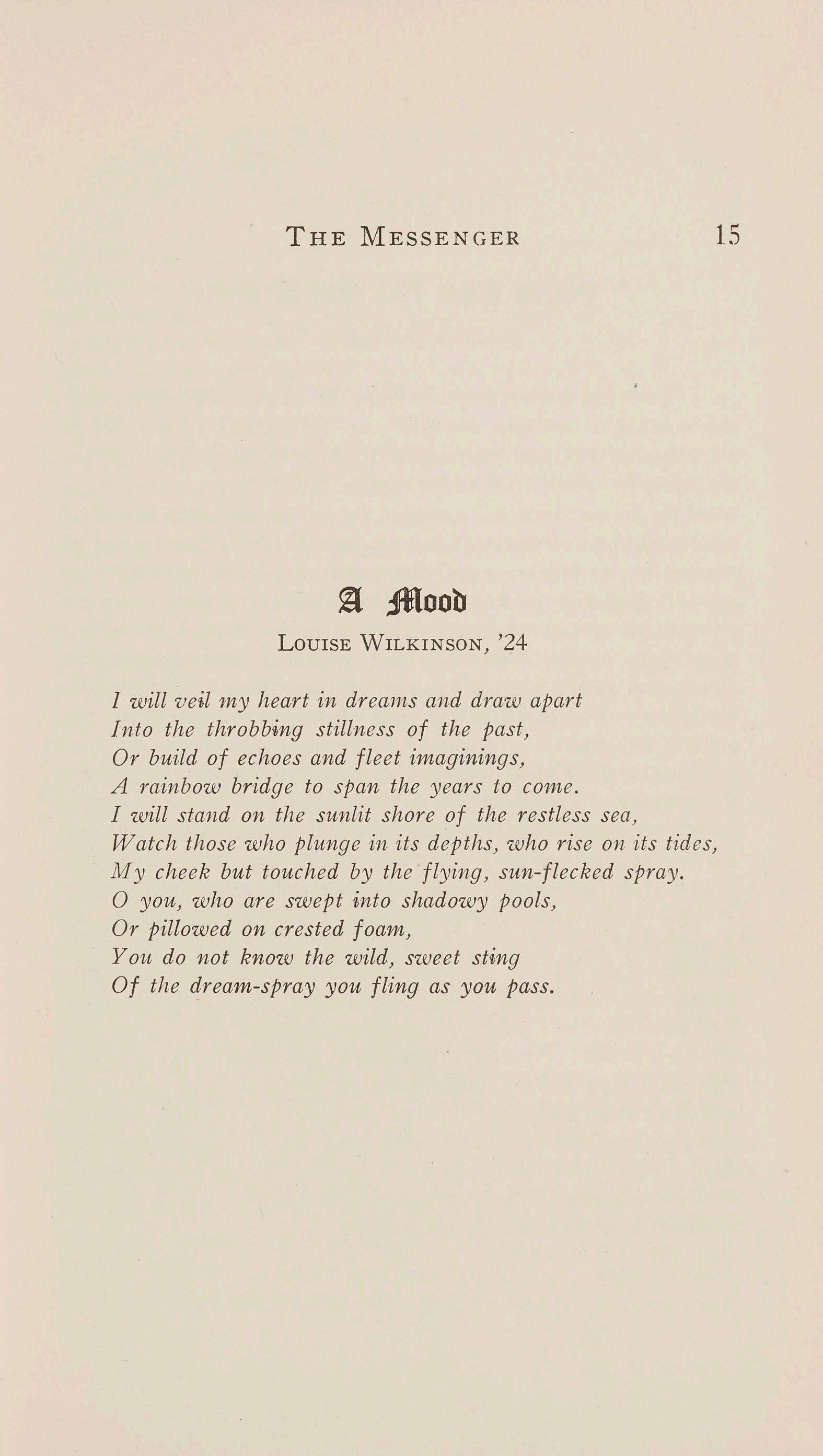
Jfloob
LOUISE WILKINSON, '24
I will veil my heart in dreams and draw apart Into the throbbing stillness of the past , Or build of echoes and fleet imaginings , A rainbow bridge to span the years to com e. I will stand on the sunlit shore of the restless sea, Watch those who plunge in its depths, who rise on i ts tid es, My cheek but touched by the flying, sun-flecked spra y . 0 you, who are swept into shadowy pools, Or pillowed on crested foam, You do not know the wild, sweet sting Of the dream-spray you fling as you pass.
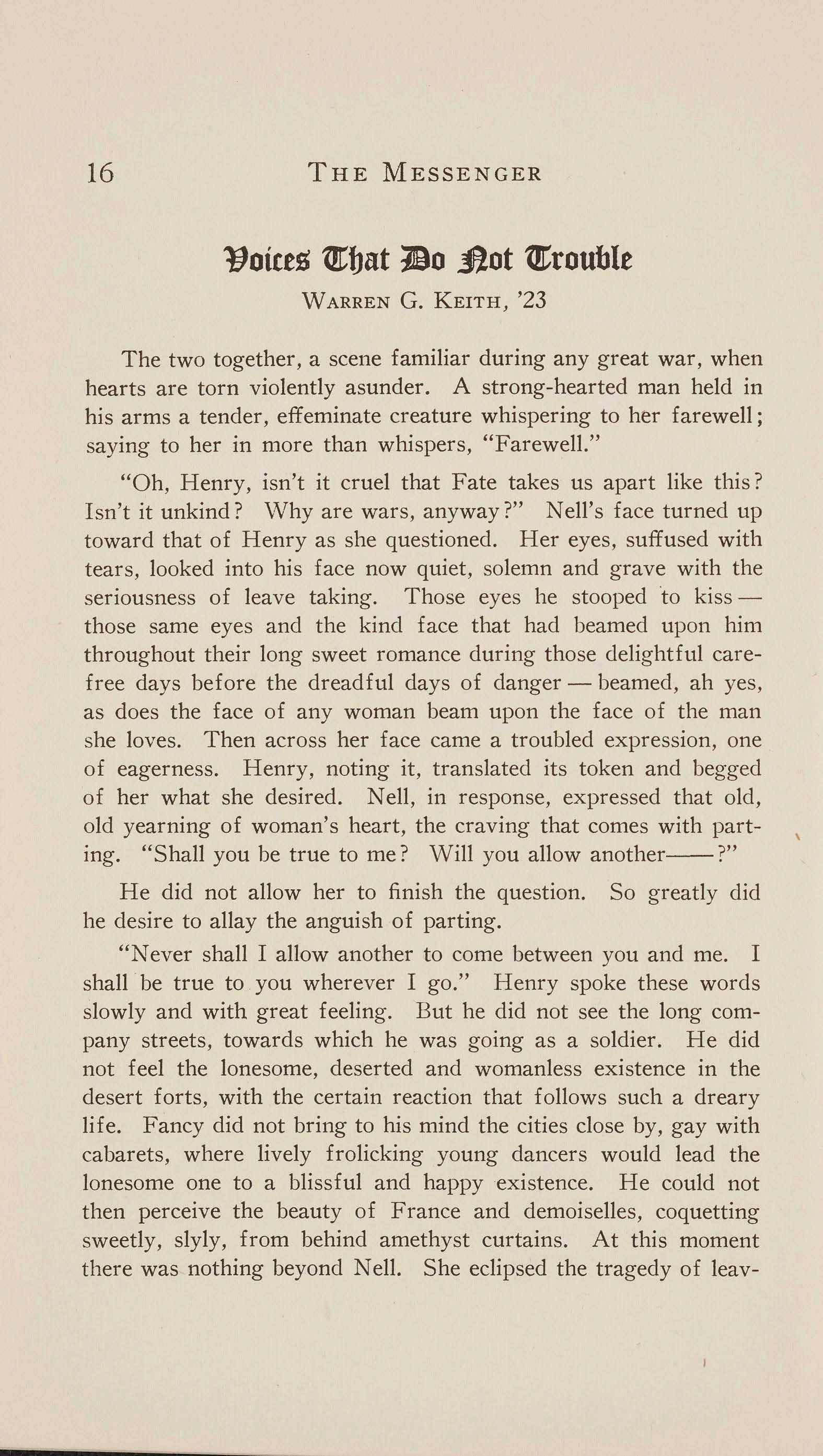
'.lJoicestlbat
mo J}ot tlroublt
WAR REN G. KEITH, '23
The two together, a scene familiar during any great war, when hearts are torn violently asunder. A strong-hearted man held in his arms a tender, effeminate creature whispering to her farewell; saying to her in more than whispers, "Farewell."
"Oh, Henry, isn't it cruel that Fate takes us apart like this? Isn't it unkind? \Vhy are wars, anyway?" Nell's face turned up toward that of Henry as she questioned. Her eyes, suffused with tears, looked into his face now quiet, solemn and grave with the seriousness of leave taking. Those eyes he stooped to kissthose same eyes and the kind face that had beamed upon him throughout their long sweet romance during those delightful carefree days before the dreadful days of danger -beamed, ah yes, as does the face of any woman beam upon the face of the man she loves. Then across her face came a troubled expression, one of eagerness. Henry, noting it, translated its token and begged of her what she desired. Nell, in response, expressed that old, old yearning of woman's heart, the craving that comes with parting. "Shall you be true to me? Will you allow another--?"
He did not allow her to finish the question. So greatly did he desire to allay the anguish of parting.
"Never shall I allow another to come between you and me. I shall be true to you wherever I go." Henry spoke these words slowly and with great feeling. But he did not see the long company streets, towards which he was going as a soldier. He did not feel the lonesome, deserted and womanless existence in the desert forts, with the certain reaction that follows such a dreary life. Fancy did not bring to his mind the cities close by, gay with cabarets, where lively frolicking young dancers would lead the lonesome one to a blissful and happy existence. He could not then perceive the beauty of France and demoiselles, coquetting sweetly, slyly, from behind amethyst curtains. At this moment there was nothing beyond Nell. She eclipsed the tragedy of leav-
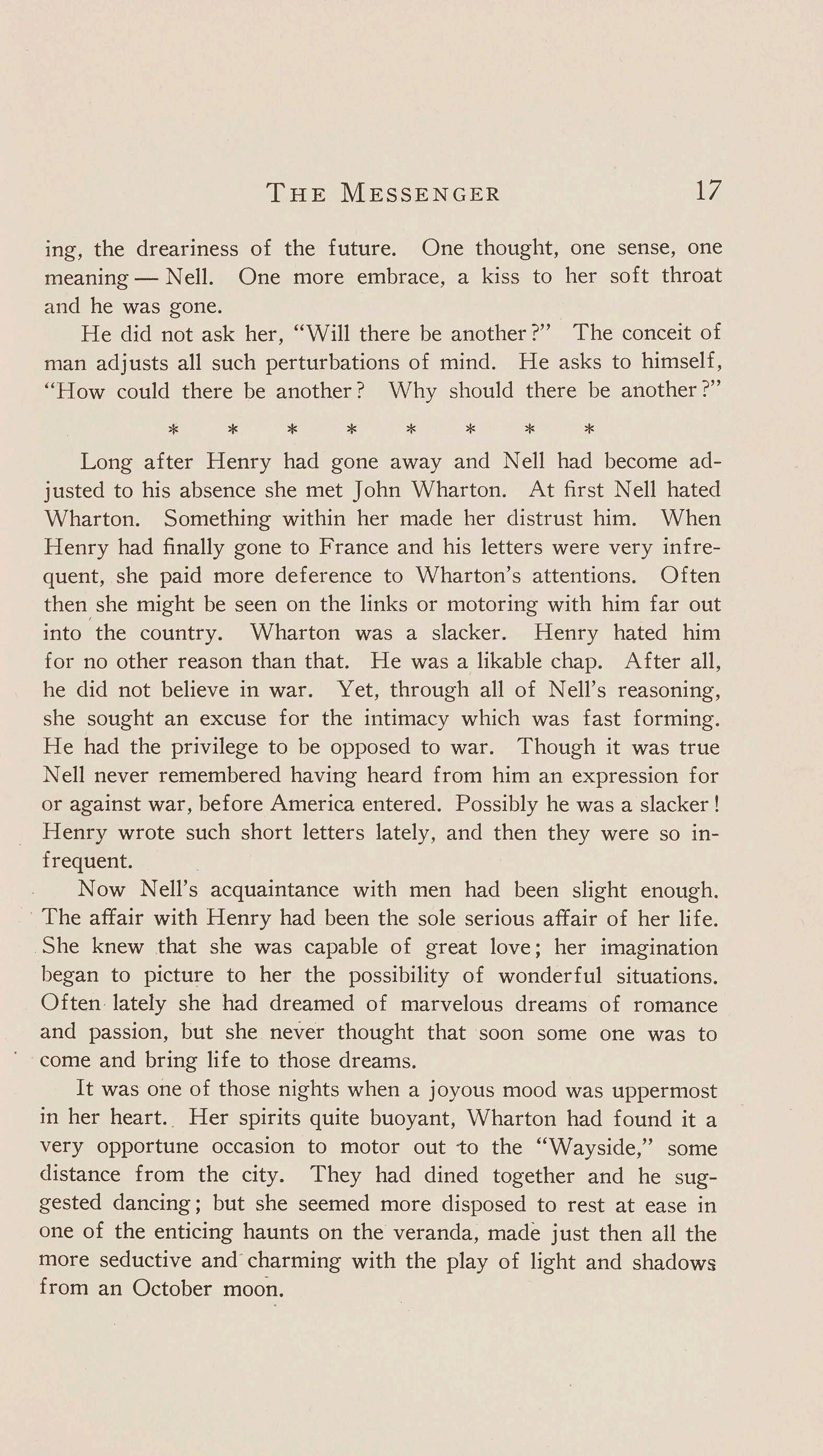
ing, the dreariness of the future. One thought, one sense, one meaning -Nell. One more embrace, a kiss to her soft throat and he was gone.
He did not ask her, "Will there be another?" The conceit of man adjusts all such perturbations of mind. He asks to himself, "How could there be another? Why should there be another ?"
Long after Henry had gone away and Nell had become adjusted to his absence she met John Wharton. At first Nell hated Wharton. Something within her made her distrust him. When Henry had finally gone to France and his letters were very infrequent, she paid more deference to Wharton's attentions. Often then she might be seen on the links or motoring with him far out into ' the country. Wharton was a slacker. Henry hated him for no other reason than that. He was a likable chap. After all, he did not believe in war. Yet, through all of Nell's reasoning, she sought an excuse for the intimacy which was fast forming. He had the privilege to be opposed to war. Though it was true Nell never remembered having heard from him an expression for or against war, before America entered. Possibly he was a slacker ! Henry wrote such short letters lately, and then they were so infrequent.
Now Nell's acquaintance with men had been slight enough. The affair with Henry had been the sole serious affair of her life. She knew that she was capable of great love; her imagination began to picture to her the possibility of wonderful situations. Often - lately she had dreamed of marvelous dreams of romance and passion, but she never thought that soon some one was to come and bring life to those dreams.
It was one of those nights when a joyous mood was uppermost in her heart. . Her spirits quite buoyant, Wharton had found it a very opportune occasion to motor out to the "Wayside," some distance from the city. They had dined together and he suggested dancing; but she seemed more disposed to rest at ease in one of the enticing haunts on the veranda, made just then all the more seductive and · charming with the play of light and shadows from an October moon.

THE MESSENGER
Nell was the per£ ection of a not unusual type. Many girls had the same brown eyes and brown hair. Wharton thought that he had never seen eyes so lovely or so wondrously set. Then her skin -girls of that coloring -so£tness of blossoms from an almond -were usually cold. Nell would not be cold to him. To him she was a living flower filled with the honey of life. To him she was a child. He could have picked her up and carried her as easily as he could pick up a child. Strength is instinctively drawn to weakness and so is worldly wiseness drawn to its opposite.
Wharton was irresistable. She was transported into the very regions of ecstasy, by his complimentary words. As he held her tiny hand in his she felt in a moment the whole of her soul's longing and love rushing to meet him -to meet him and to feel his strong arms -to feel with her body the thrill that his deep voice gave her. There was nothing but peace to her soul now. Wharton, his deep voice vibrant, eloquent, thrilled her. She felt his body tingle with the thrill her kisses gave him. "Sweet love," she whispered, "that came so suddenly-so swiftly-Oh John, this feeling is so strange. It is so different. Can it be real?"
Wharton was more experienced ; he knew why and understood why she thrilled, why her heart beat violently; he cared nothing for the ring on her tiny finger. The triumph was greater for that.
In swift succession followed other blissful days. He talked often of marriage to which she listened, attentive and eager. Then, too, followed days in which Henry was forgotten. Nell had outgrown him. It would be easy to explain to him when he came back. It would be better to tell him then. She and Wharton would be happy together before Henry returned. Early one morning a servant carried a large envelope to her room. A man with a strange, uncouth appearance had brought it to the door. No answer was expected. Its contents:
Darling Nell: By the time you receive this I shall be gone. They called my number and I have exhausted all means of evasion. I am going to Mexico. You meet me in Agua Prieta, April 11th. Come disguised. Until then, good - bye. John Wharton.
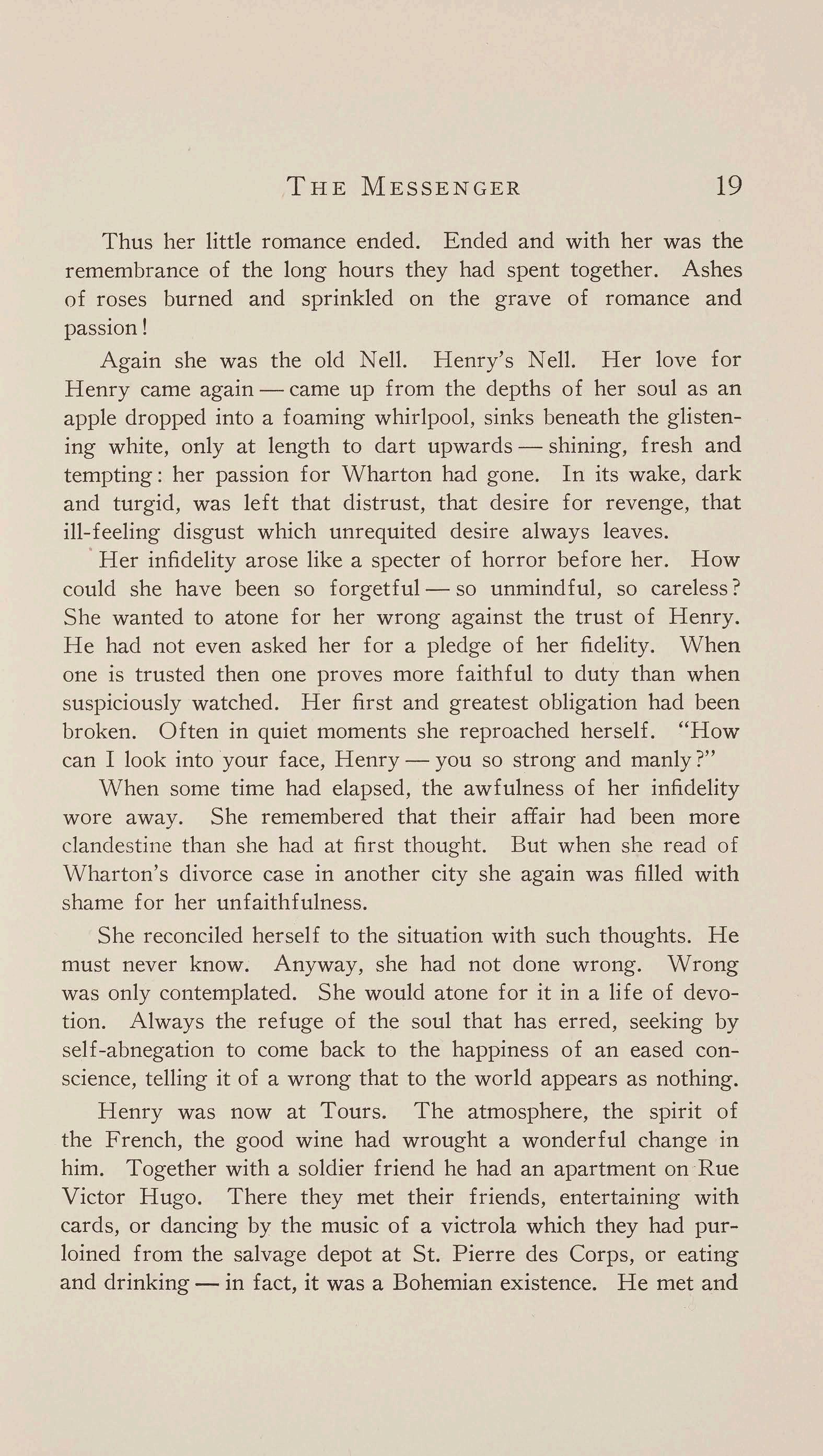
Thus her little romance ended. Ended and with her was the remembrance of the long hours they had spent together. Ashes of roses burned and sprinkled on the grave of romance and passion!
Again she was the old Nell. Henry's Nell. Her love for Henry came again -came up from the depths of her soul as an apple dropped into a foaming whirlpool, sinks beneath the glistening white, only at length to dart upwards -shining, fresh and tempting: her passion for Wharton had gone. In its wake, dark and turgid, was left that distrust, that desire for revenge, that ill-£ eeling disgust which unrequited desire always leaves.
· Her infidelity arose like a specter of horror before her. How could she have been so forgetful -so unmindful, so careless? She wanted to atone for her wrong against the trust of Henry. He had not even asked her for a pledge of her fidelity. When one is trusted then one proves more faithful to duty than when suspiciously watched. Her first and greatest obligation had been broken. Often in quiet moments she reproached herself. "How can I look into your face, Henry -you so strong and manly?"
When some time had elapsed, the awfulness of her infidelity wore away. She remembered that their affair had been more clandestine than she had at first thought. But when she read of Wharton's divorce case in another city she again was filled with shame for her unfaithfulness.
She reconciled herself to the situation with such thoughts. He must never know. Anyway, she had not done wrong. Wrong was only contemplated. She would atone for it in a life of devotion. Always the refuge of the soul that has erred, seeking by self-abnegation to come back to the happiness of an eased conscience, telling it of a wrong that to the world appears as nothing.
Henry was now at Tours. The atmosphere, the spirit of the French, the good wine had wrought a wonderful change in him. Together with a soldier friend he had an apartment on Rue Victor Hugo. There they met their friends, entertaining with cards, or dancing by the music of a victrola which they had purloined from the salvage depot at St. Pierre des Corps, or eating and drinking -in fact, it was a Bohemian existence. He met and
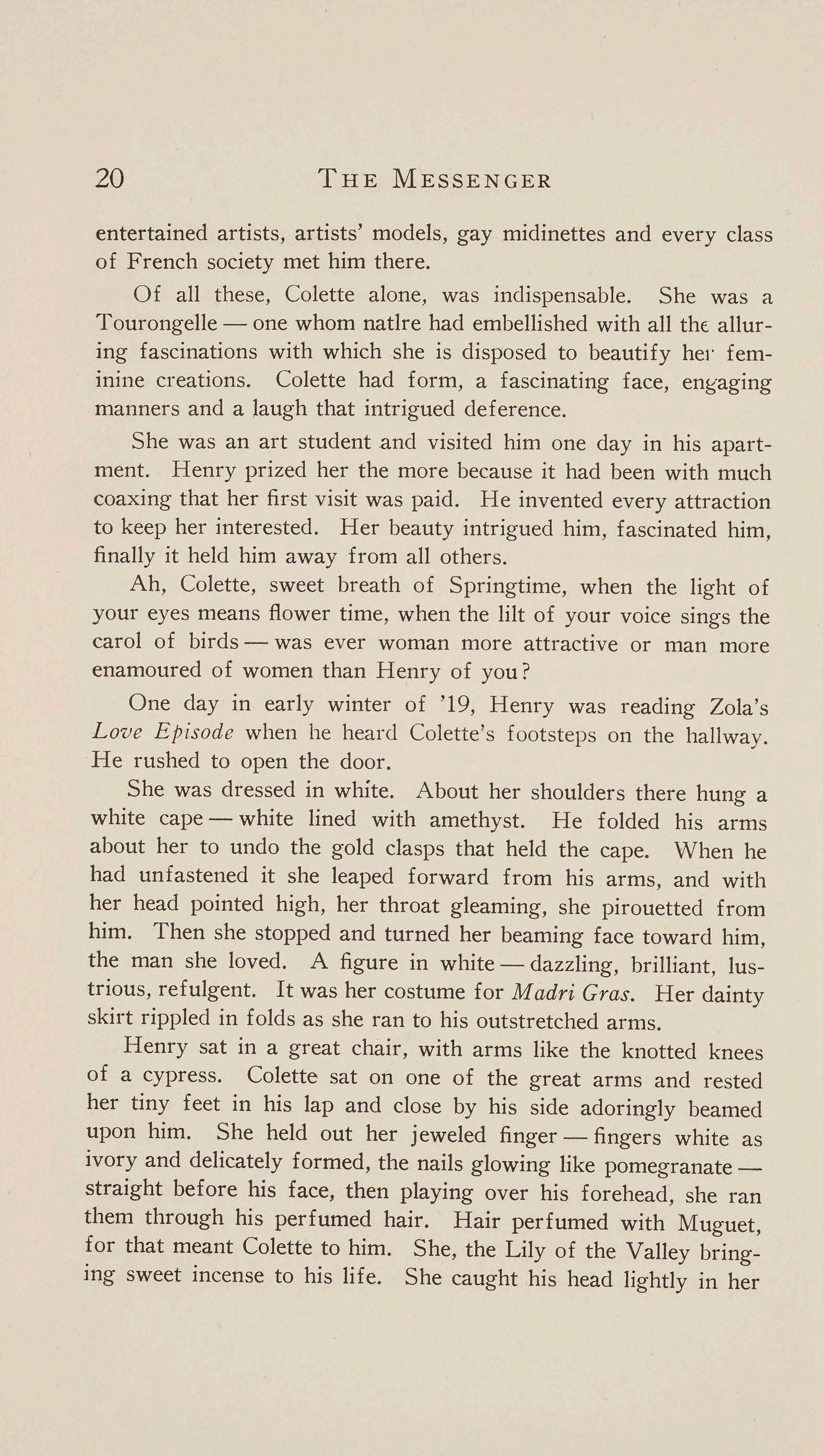
THE MESSENGER
entertained artists, artists' models, gay midinettes and every class of French society met him there.
Of all these, Colette alone, was indispensable. She was a Tourongelle -one whom natlre had embellished with all the: alluring fascinations with which she is disposed to beautify her femmme creations. Colette had form, a fascinating face, engaging manners and a laugh that intrigued deference.
She was an art student and visited him one day in his apartment. Henry prized her the more because it had been with much coaxing that her first visit was paid. He invented every attraction to keep her interested. Her beauty intrigued him, fascinated him, finally it held him away from all others.
Ah, Colette, sweet breath of Springtime, when the light of your eyes means flower time, when the lilt of your voice sings the carol of birds -was ever woman more attractive or man more enamoured of women than Henry of you?
One day in early winter of '19, Henry was reading Zola's Love Episode when he heard Colette 's footsteps on the hallway. He rushed to open the door.
She was dressed in white. About her shoulders there hung a white cape -white lined with amethyst. He folded his arms about her to undo the gold clasps that held the cape. When he had unfastened it she leaped forward from his arms, and with her head pointed high, her throat gleaming, she pirouetted from him. Then she stopped and turned her beaming face toward him, the man she loved. A figure in white -dazzling, brilliant, lustrious, refulgent. It was her costume for M adri Gras. Her dainty skirt rippled in folds as she ran to his outstretched arms.
Henry sat in a great chair, with arms like the knotted knees of a cypress. Colette sat on one of the great arms and rested her tiny feet in his lap and close by his side adoringly beamed upon him. She held out her jeweled finger -fingers white as ivory and delicately formed, the nails glowing like pomegranatestraight before his face, then playing over his forehead, she ran them through his perfumed hair. Hair perfumed with Muguet, for that meant Colette to him. She, the Lily of the Valley bringing sweet incense to his life. She caught his head lightly in her
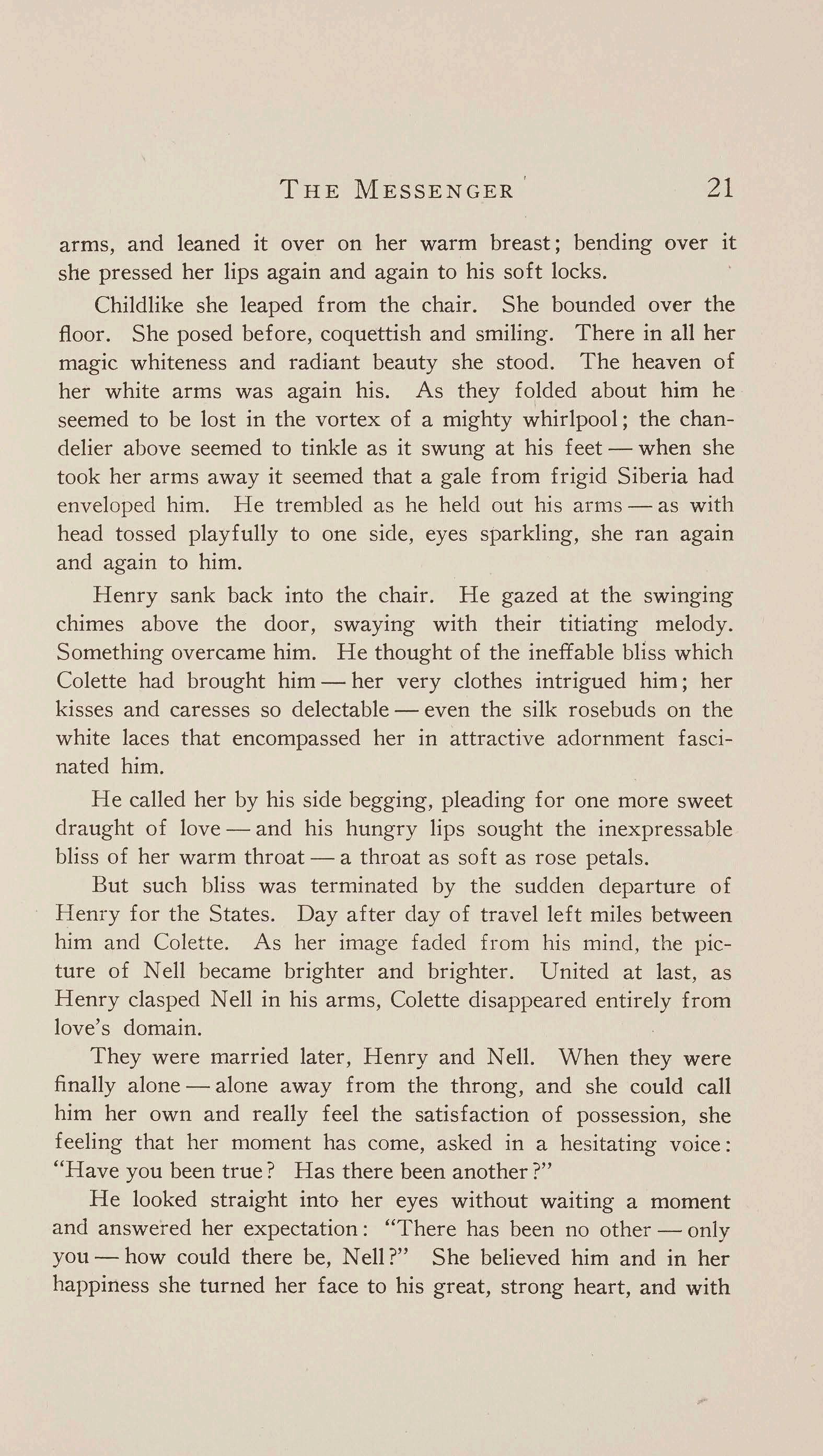
THE MESSENGER '
21 arms, and leaned it over on her warm breast; bending over it she pressed her lips again and again to his soft locks.
Childlike she leaped from the chair. She bounded over the floor. She posed before, coquettish and smiling. There in all her magic whiteness and radiant beauty she stood. The heaven of her white arms was again his. As they folded about him he seemed to be lost in the vortex of a mighty whirlpool; the chandelier above seemed to tinkle as it swung at his feet -when she took her arms away it seemed that a gale from frigid Siberia had enveloped him. He trembled as he held out his arms -as with head tossed playfully to one side, eyes sparkling, she ran again and again to him.
Henry sank back into the chair. He gazed at the swinging chimes above the door, swaying with their titiating melody. Something overcame him. He thought of the ineffable bliss which Colette had brought him -her very clothes intrigued him ; her kisses and caresses so delectable -even the silk rosebuds on the white laces that encompassed her in attractive adornment fascinated him.
He called her by his side begging, pleading for one more sweet draught of love -and his hungry lips sought the inexpressable bliss of her warm throat -a throat as soft as rose petals.
But such bliss was terminated by the sudden departure of Henry for the States. Day after day of travel le£t miles between him and Colette. As her image faded from his mind, the picture of Nell became brighter and brighter. United at last, as Henry clasped Nell in his arms, Colette disappeared entirely from love's domain.
They were married later, Henry and Nell. When they were finally alone -alone away from the throng, and she could call him her own and really feel the satisfaction of possession, she feeling that her moment has come, asked in a hesitating voice: "Have you been true? Has there been another?"
He looked straight into her eyes without waiting a moment and answered her expectation: "There has been no other -only you -how could there be, Nell?" She believed him and in her happiness she turned her face to his great, strong heart, and with
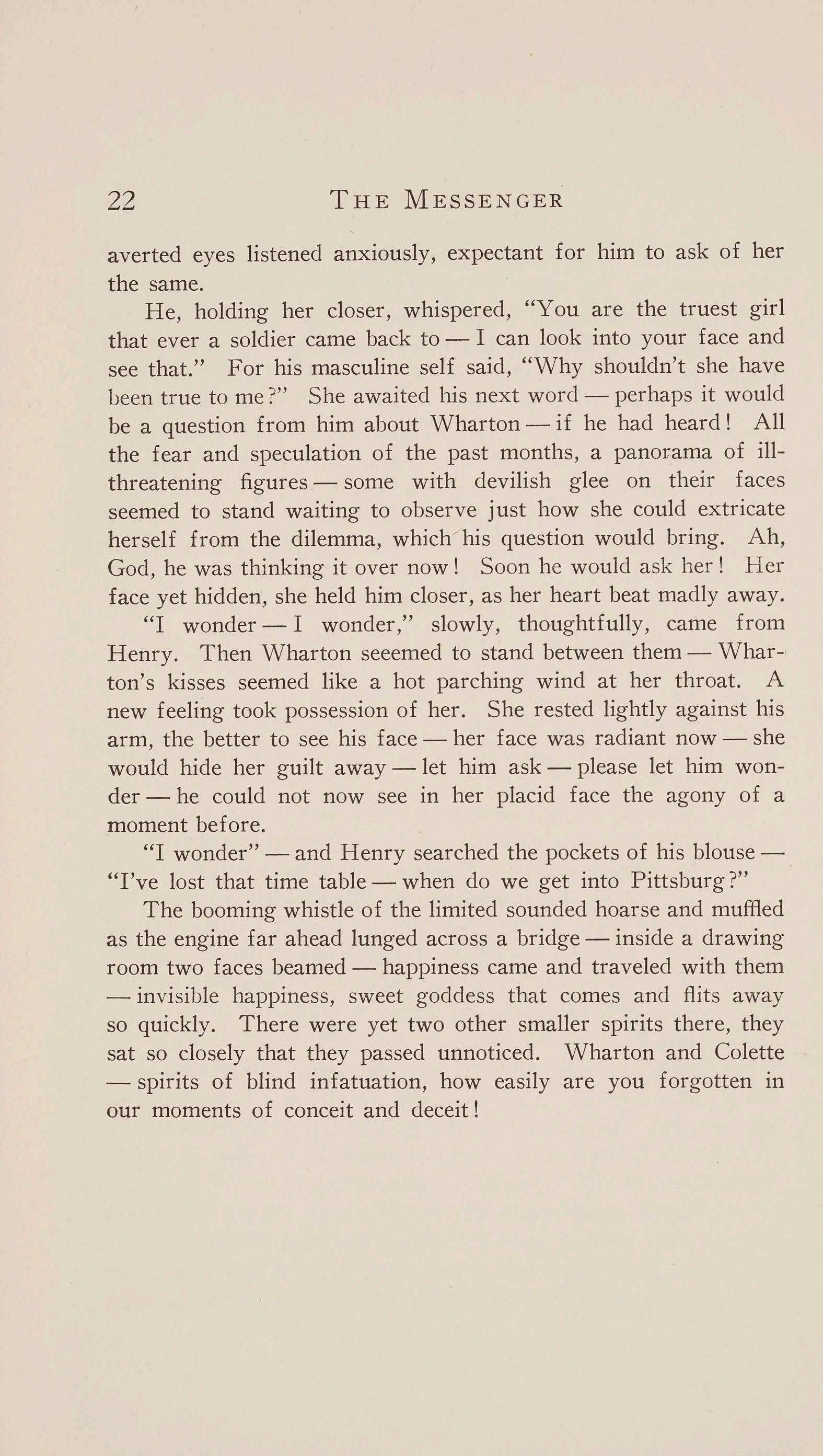
THE MESSENGER
averted eyes listened anxiously, expectant for him to ask of her the same.
He, holding her closer, whispered, "You are the truest girl that ever a soldier came back to -I can look into your face and see that." For his masculine self said, "Why shouldn't she have been true to me?" She awaited his next word -perhaps it would be a question from him about Wharton -if he had heard! All the fear and speculation of the past months, a panorama of illthreatening figures -some with devilish glee on their faces seemed to stand waiting to observe just how she could extricate herself from the dilemma, which his question would bring. Ah, God, he was thinking it over now! Soon he would ask her! Her face yet hidden, she held him closer, as her heart beat madly away.
"I wonder -I wonder," slowly, thoughtfully, came from Henry. Then Wharton seeemed to stand between them -Wharton's kisses seemed like a hot parching wind at her throat. A new feeling took possession of her. She rested lightly against his arm, the better to see his face -her face was radiant now -she would hide her guilt away -let him ask -please let him wonder -he could not now see in her placid face the agony of a moment before.
"I wonder" -and Henry searched the pockets of his blouse"I've lost that time table -when do we get into Pittsburg?"
The booming whistle of the limited sounded hoarse and muffled as the engine far ahead lunged across a bridge -inside a drawing room two faces beamed-happiness came and traveled with them -invi sible happiness, sweet goddess that comes and flits away so quickly. There were yet two other smaller spirits there, they sat so closely that they passed unnoticed. Wharton and Colette -spirits of blind infatuation, how easily are you forgotten in our moments of conceit and deceit!
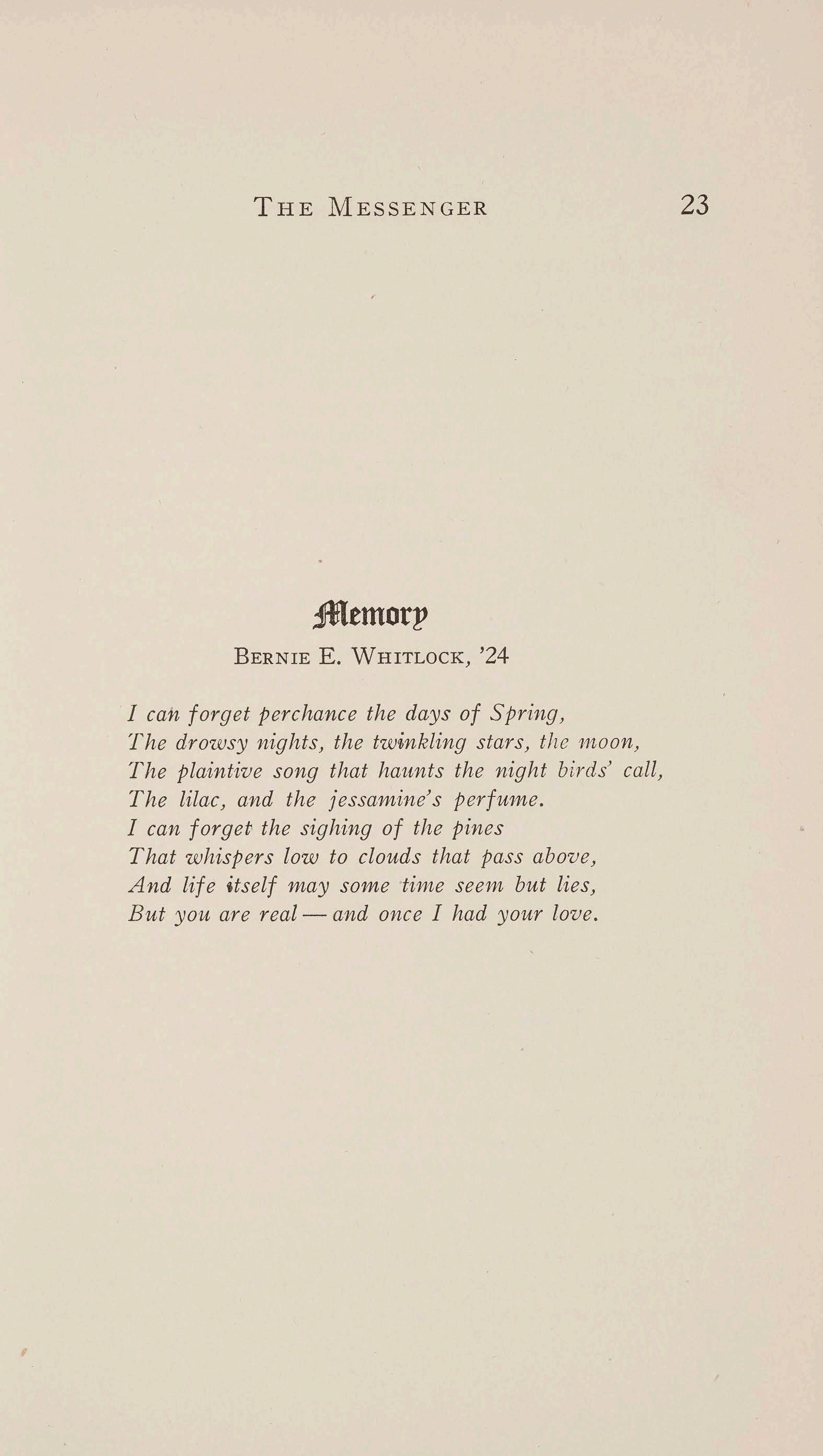
Jltmorp
BERNIE E. WHITLOCK, '24
I can forget perchance the days of Spring, The drowsy nights, the twinkling stars, tlze moon, The plaintive song that haunts the night birds' call, The lilac, and the jessamine's perfume. I can for get the sighing of the pines That whispers low to clouds that pass above, And life ttself may some time seem but lies, But you are real-and once I had your love.
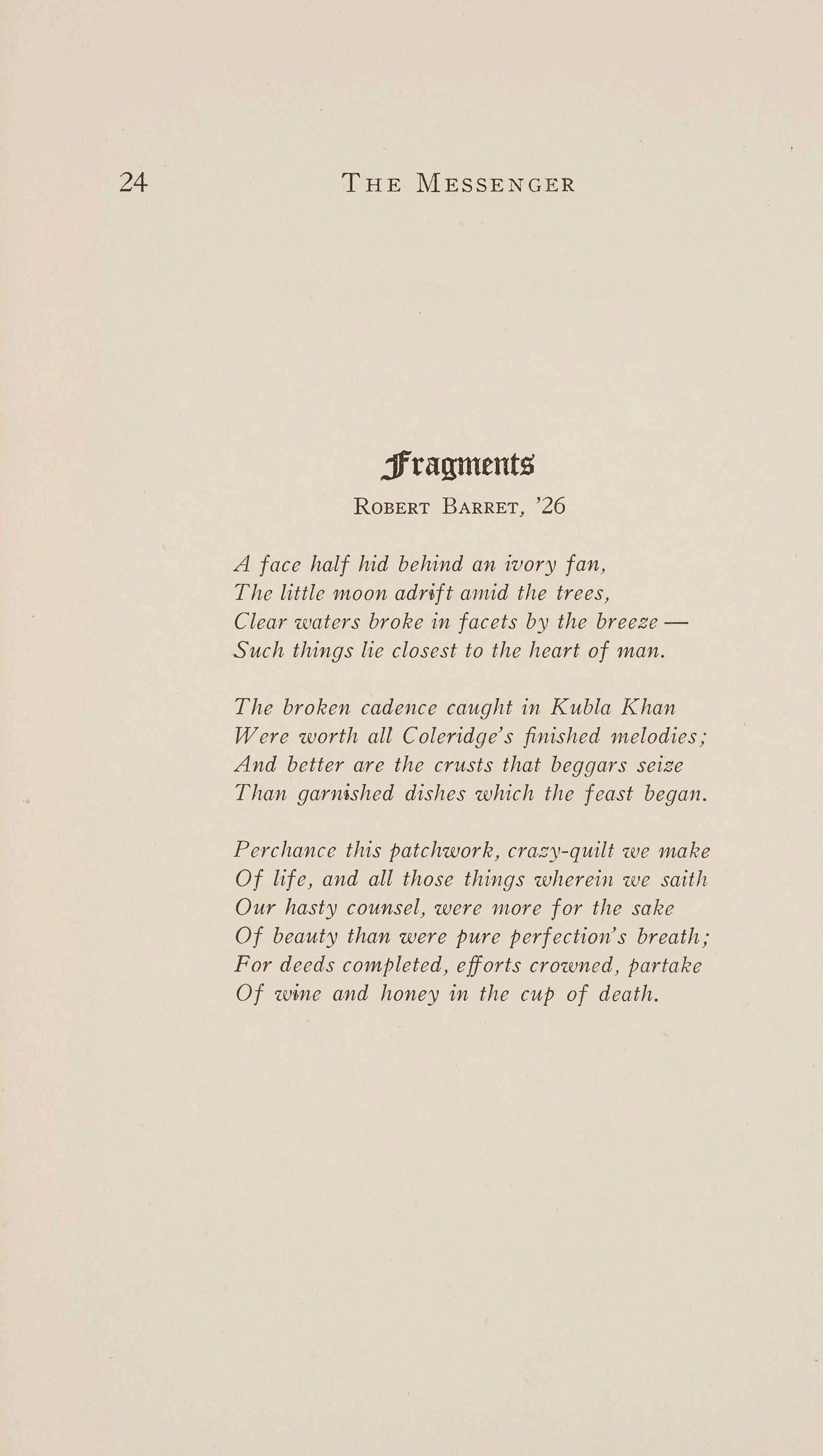
ROBERT BARRET, '26
A face half hid behind an ivory fan , The little moon adrift amid the trees, Clear waters broke in facets by the breezeSuch things lie closest to the heart of man.
The broken cadence caught in Kubla Khan Were worth all Coleridge's finished melodies; And better are the crusts that beggars seize Than garnished dishes which the feast began.
Perchance this patchwork, cra.zy-quilt we make Of life, and all those things wherein we saith Our hasty counsel, were more for the sake Of beauty than were pure perfection's breath; For deeds completed, efforts crowned, partake Of wine and honey in the cup of death.
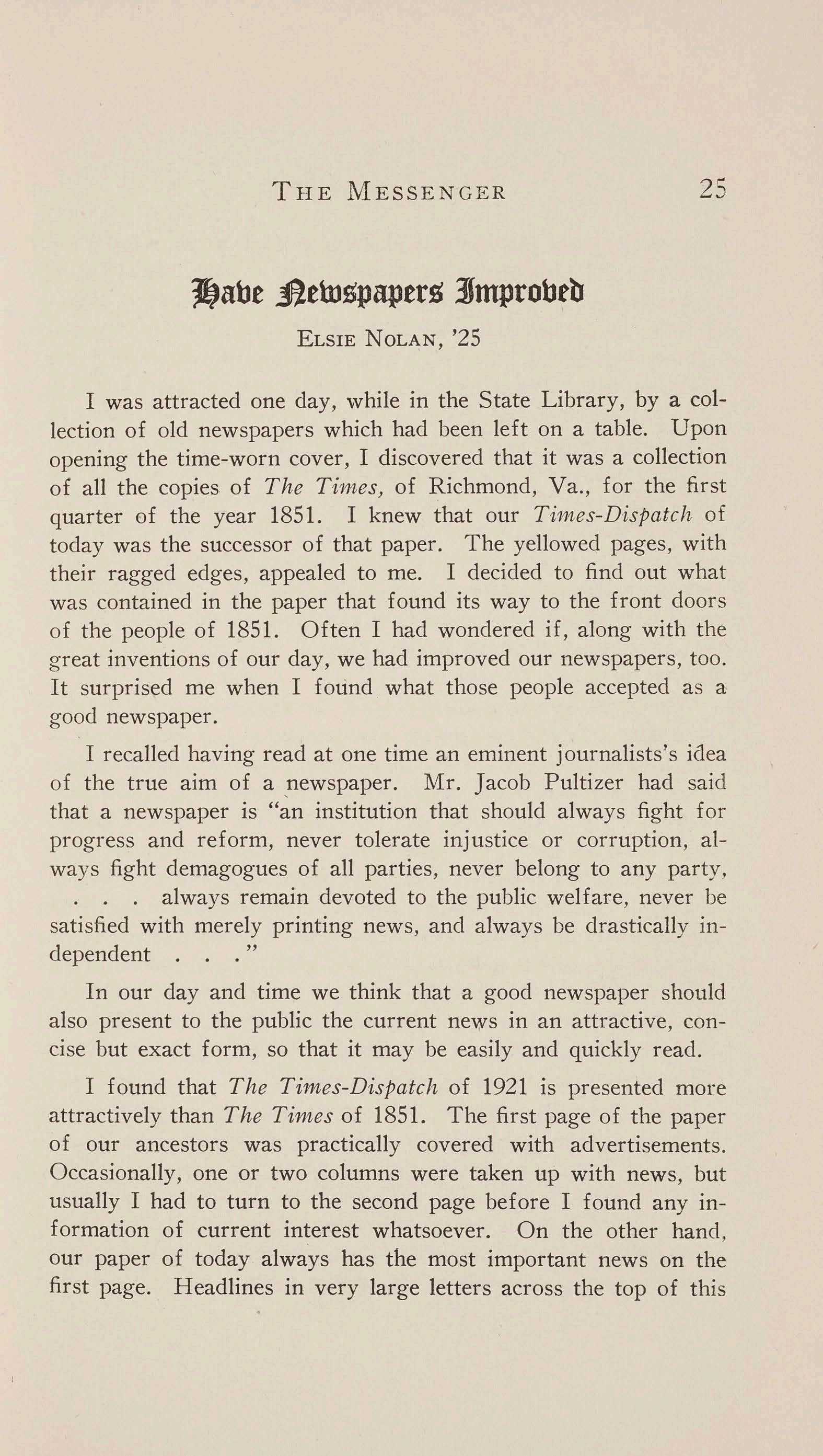
ELSIE NOLAN,
'25
I was attracted one day, while in the State Library, by a collection of old newspapers which had been left on a table. Upon opening the time-worn cover, I discovered that it was a collection of all the copies of The Times, of Richmond, Va., for the first quarter of the year 1851. I knew that our Times-Dispatch of today was the successor of that paper. The yellowed pages, with their ragged edges, appealed to me. I decided to find out what was contained in the paper that found its way to the front doors of the people of 1851. Often I had wondered if, along with the great inventions of our day, we had improved our newspapers, too. It surprised me when I found what those people accepted as a good newspaper.
I recalled having read at one time an eminent journalists's idea of the true aim of a newspaper. Mr. Jacob Pultizer had said that a newspaper is "an institution that should always fight for progress and reform, never tolerate injustice or corruption, always fight demagogues of all parties, never belong to any party, always remain devoted to the public welfare, never be satisfied with merely printing news, and always be drastically independent "
In our clay and time we think that a good newspaper should also present to the public the current news in an attractive, concise but exact form, so that it may be easily and quickly read.
I found that The Times-Dispatch of 1921 is presented more attractively than The Times of 1851. The first page of the paper of our ancestors was practically covered with advertisements. Occasionally, one or two columns were taken up with news, but usually I had to turn to the second page before I found any information of current interest whatsoever. On the other hand, our paper of today always has the most important news on the first page. Headlines in very large letters across the top of this
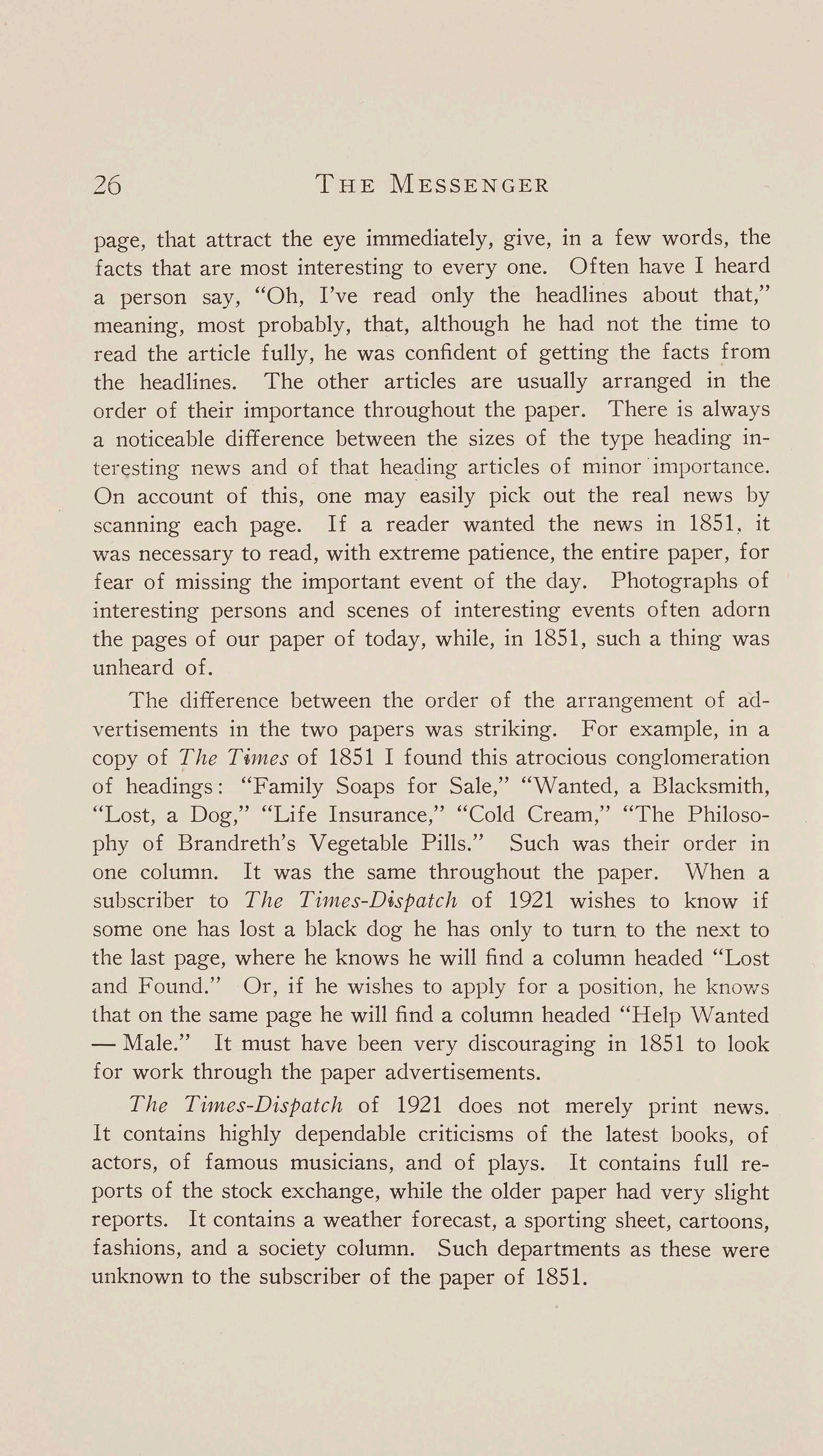
THE MESSENGER
page, that attract the eye immediately, give, in a few words, the facts that are most interesting to every one. Often have I heard a person say, "Oh, I've read only the headlines about that," meaning, most probably, that, although he had not the time to read the article fully, he was confident of getting the facts from the headlines. The other articles are usually arranged in the order of their importance throughout the paper. There is always a noticeable difference between the sizes of the type heading interesting news and of that heading articles of minor importance. On account of this, one may easily pick out the real news by scanning each page. If a reader wanted the news in 1851, it was necessary to read, with extreme patience, the entire paper, for fear of missing the important event of the day. Photographs of interesting persons and scenes of interesting events often adorn the pages of our paper of today, while, in 1851, such a thing was unheard of.
The difference between the order of the arrangement of advertisements in the two papers was striking. For example, in a copy of The Times of 1851 I found this atrocious conglomeration of headings: "Family Soaps for Sale," "Wanted, a Blacksmith, "Lost, a Dog," "Life Insurance," "Cold Cream," "The Philosophy of Brandreth's Vegetable Pills." Such was their order in one column. It was the same throughout the paper. When a subscriber to The Times-Dispatch of 1921 wishes to know if some one has lost a black dog he has only to turn to the next to the last page, where he knows he will find a column headed "Lost and Found." Or, if he wishes to apply for a position, he knows that on the same page he will find a column headed "Help Wanted -Male." It must have been very discouraging in 1851 to look for work through the paper advertisements.
The Times-Dispatch of 1921 does not merely print news. It contains highly dependable criticisms of the latest books, of actors, of famous musicians, and of plays. It contains full reports of the stock exchange, while the older paper had very slight reports. It contains a weather forecast, a sporting sheet, cartoons, fashions, and a society column. Such departments as these were unknown to the subscriber of the paper of 1851.
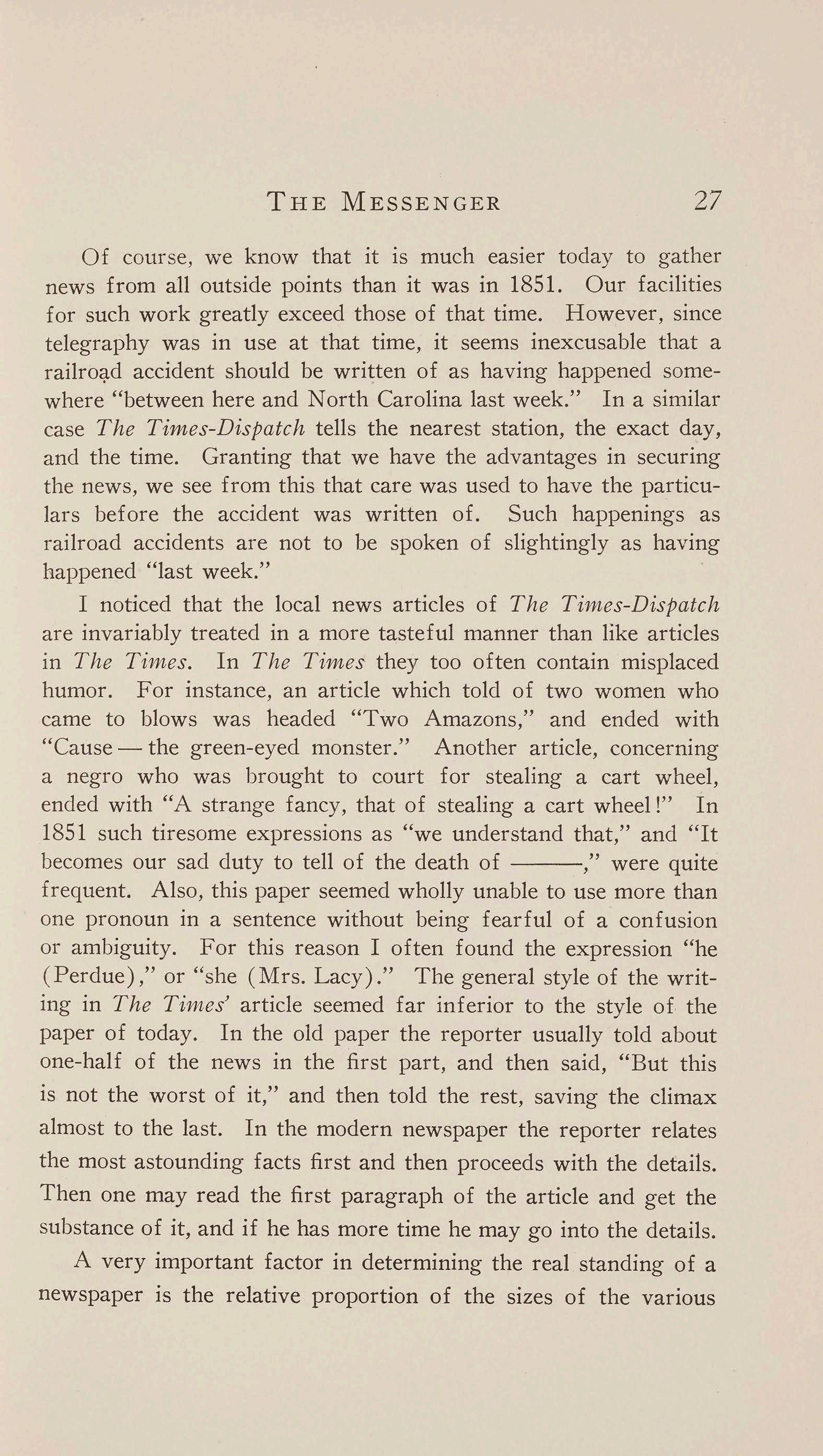
Of course, we know that it is much easier today to gather news from all outside points than it was in 1851. Our facilities for such work greatly exceed those of that time. However, since telegraphy was in use at that time, it seems inexcusable that a railro~d accident should be written of as having happened somewhere "between here and North Carolina last week." In a similar case The Times-Dispatch tells the nearest station, the exact day, and the time. Granting that we have the advantages in securing the news, we see from this that care was used to have the particulars before the accident was written of. Such happenings as railroad accidents are not to be spoken of slightingly as having happened "last week."
I noticed that the local news articles of The Times-Dispatch are invariably treated in a more tasteful manner than like articles in The Times. In The Times they too often contain misplaced humor. For instance, an article which told of two women who came to blows was headed "Two Amazons," and ended with "Cause - the green-eyed monster." Another article, concerning a negro who was brought to court for stealing a cart wheel, ended with "A strange fancy, that of stealing a cart wheel!" in 1851 such tiresome expressions as "we understand that," and "It becomes our sad duty to tell of the death of ---," were quite frequent. Also, this paper seemed wholly unable to use more than one pronoun in a sentence without being fearful of a confusion or ambiguity. For this reason I often found the expression "he (Perdue)," or "she ( Mrs. Lacy)." The general style of the writing in The Times' article seemed far inferior to the style of the paper of today. In the old paper the reporter usually told about one-half of the news in the first part, and then said, "But this is not the worst of it," and then told the rest, saving the climax almost to the last. In the modern newspaper the reporter relates the most astounding facts first and then proceeds with the details. Then one may read the first paragraph of the article and get the substance of it, and if he has more time he may go into the details.
A very important factor in determining the real standing of a newspaper is the relative proportion of the sizes of the various
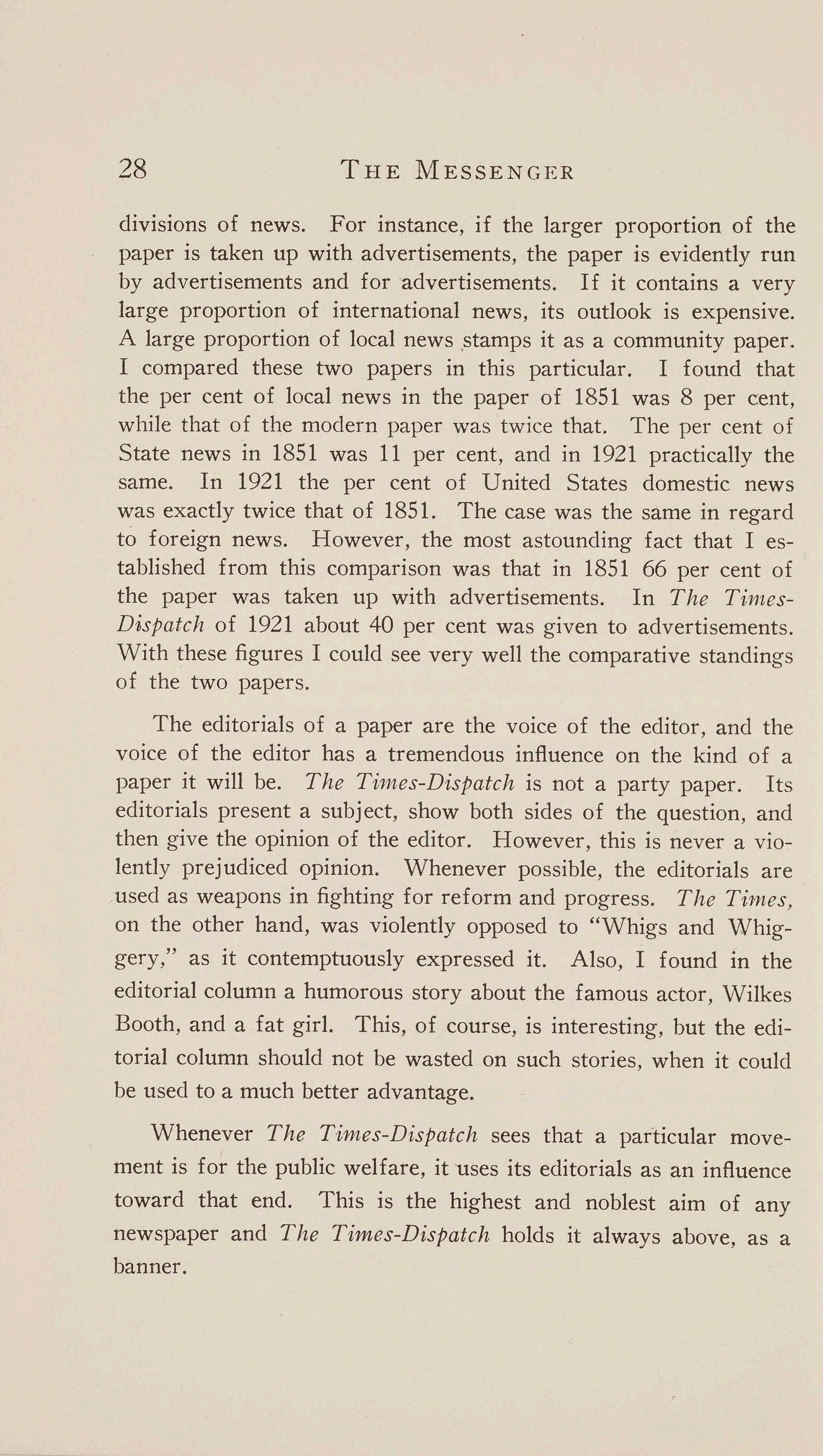
THE MESSENGER
divisions of news. For instance, if the larger proportion of the paper is taken up with advertisements, the paper is evidently run by advertisements and for advertisements. If it contains a very large proportion of international news, its outlook is expensive. A large proportion of local news .stamps it as a community paper. I compared these two papers in this particular. I found that the per cent of local news in the paper of 1851 was 8 per cent, while that of the modern paper was twice that. The per cent of State news in 1851 was 11 per cent, and in 1921 practically the same. In 1921 the per cent of United States domestic news was exactly twice that of 1851. The case was the same in regard to foreign news. However, the most astounding fact that I established from this comparison was that in 1851 66 per cent of the paper was taken up with advertisements. In The TimesDispatch of 1921 about 40 per cent was given to advertisements . With these figures I could see very well the comparative standings of the two papers.
The editorials of a paper are the voice of the editor, and the voice of the editor has a tremendous influence on the kind of a paper it will be. The Times-Dispatch is not a party paper. Its editorials present a subject, show both sides of the question, and then give the opinion of the editor. However, this is never a violently prejudiced opinion. Whenever possible, the editorials are used as weapons in fighting for reform and progress. The Times , on the other hand, was violently opposed to "Whigs and Whiggery," as it contemptuously expressed it. Also, I found in the editorial column a humorous story about the famous actor, Wilkes Booth, and a fat girl. This, of course, is interesting, but the editorial column should not be wasted on such stories, when it could be used to a much better advantage.
Whenever The Times-Dispatch sees that a par'ticular movement is for the public welfare, it uses its editorials as an influence toward that end. This is the highest and noblest aim of any newspaper and The Times-Dispatch holds it always above, as a banner.
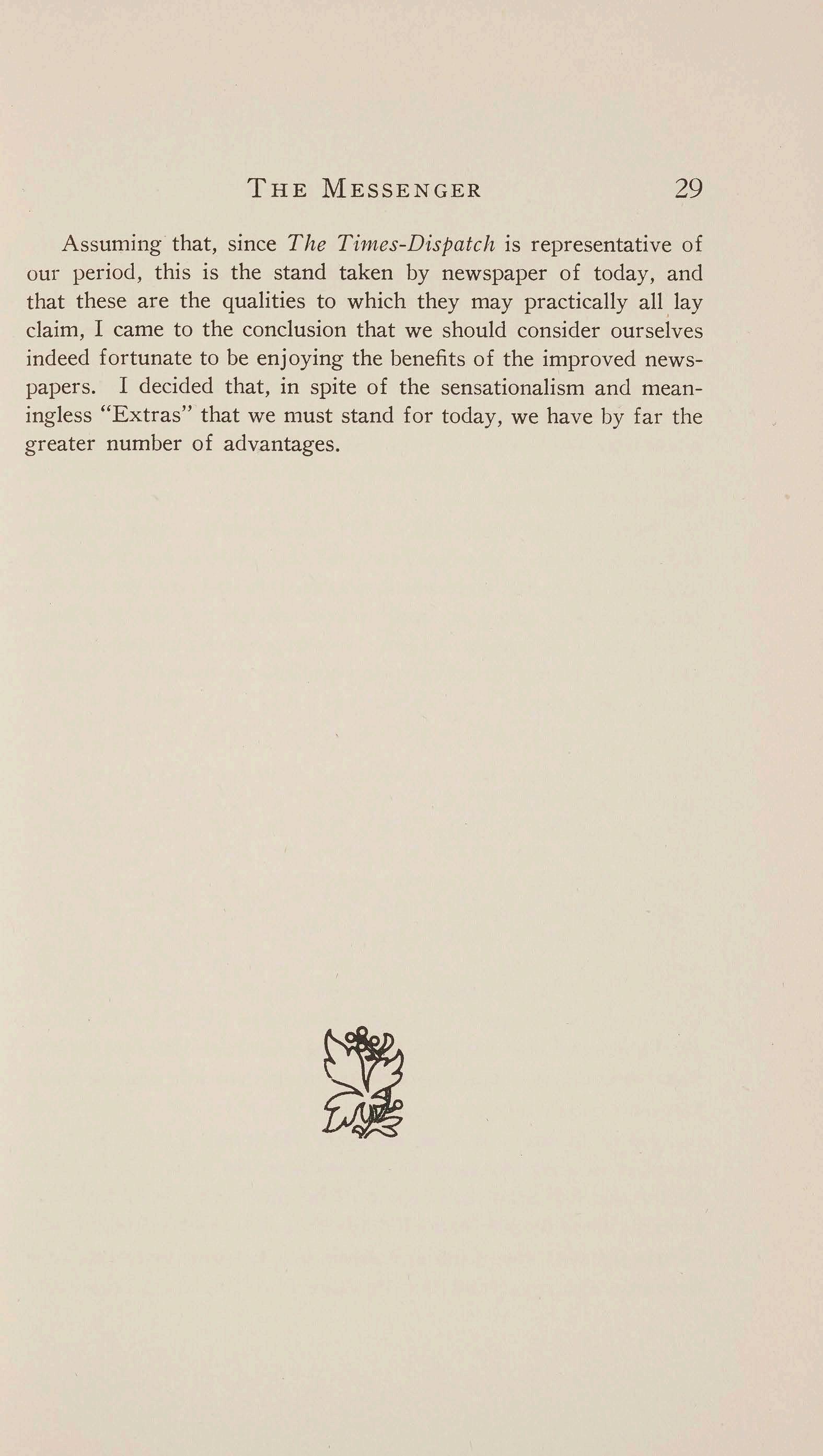
Assuming that, since The Times-Dispatch is representative of our period, this is the stand taken by newspaper of today, and that these are the qualities to which they may practically all . lay claim, I came to the conclusion that we should consider ourselves indeed fortunate to be enjoying the benefits of the improved newspapers. I decided that, in spite of the sensationalism and meaningless "Extras" that we must stand for today, we have by far the greater number of advantages.
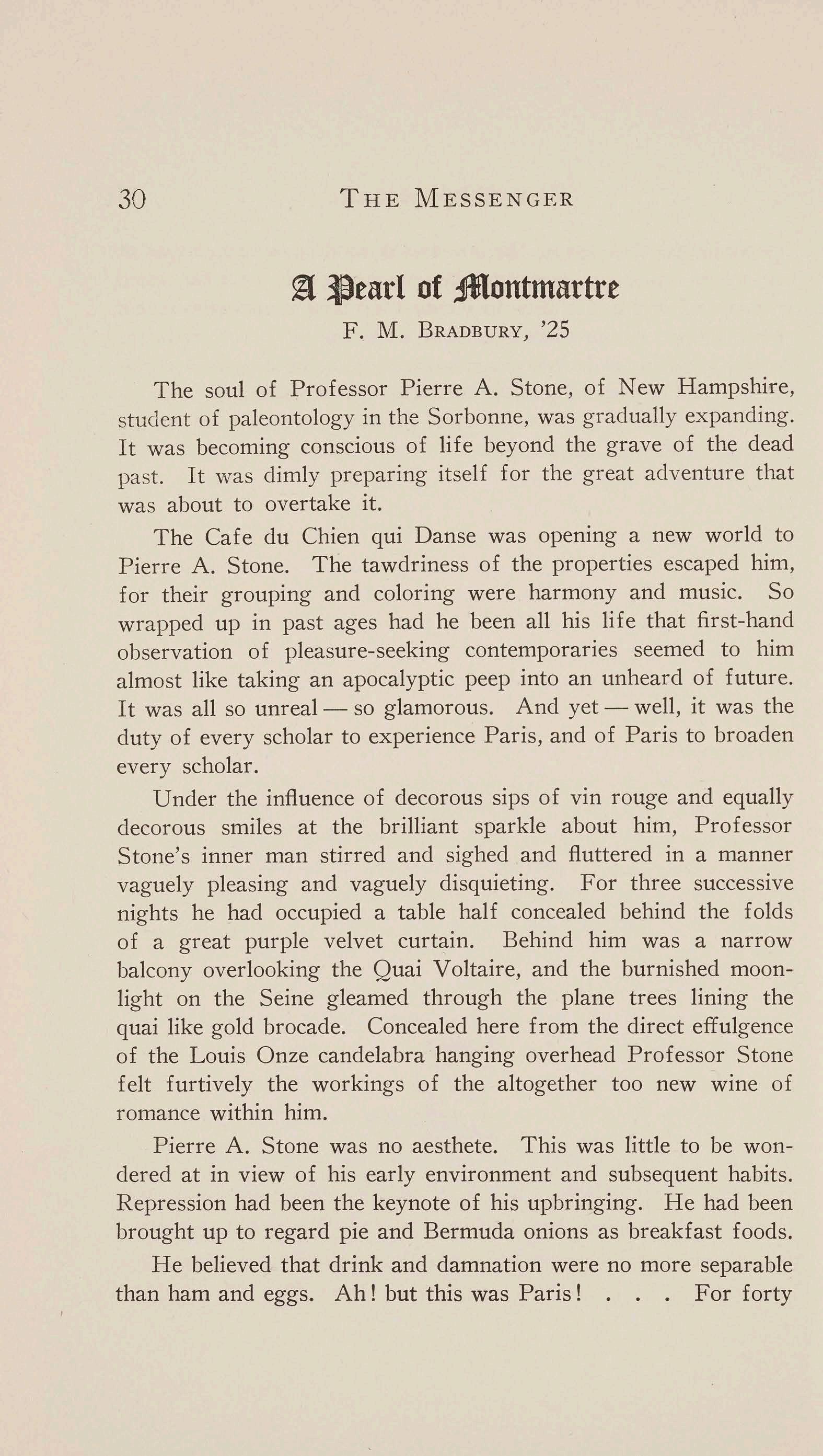
THE MESSENGER
l)earl of ~ontmartrt
F. M. BRADBURY, '25
The soul of Professor Pierre A. Stone, of New Hampshire, student of paleontology in the Sorbonne, was gradually expanding. It was becoming conscious of life beyond the grave of the dead pa st. It was dimly preparing itself for the great adventure that was about to overtake it.
The Cafe du Chien qui Danse was opening a new world to Pierre A. Stone. The tawdriness of the properties escaped him, for their grouping and coloring were harmony and music. So wrapped up in past ages had he been all his life that first-hand observation of pleasure-seeking contemporaries seemed to him almost like taking an apocalyptic peep into an unheard of future. It was all so unreal -so glamorous. And yet -well, it was the duty of every scholar to experience Paris, and of Paris to broaden every scholar.
Under the influence of decorous sips of vin rouge and equally decorous smiles at the brilliant sparkle about him, Professor Stone's inner man stirred and sighed and fluttered in a manner vaguely pleasing and vaguely disquieting. For three successive nights he had occupied a table half concealed behind the folds of a great purple velvet curtain. Behind him was a narrow balcony overlooking the Quai Voltaire, and the burnished moonlight on the Seine gleamed through the plane trees lining the quai like gold brocade. Concealed here from the direct effulgence of the Louis Onze candelabra hanging overhead Professor Stone felt furtively the workings of the altogether too new wine of romance within him.
Pierre A. Stone was no aesthete. This was little to be wondered at in view of his early environment and subsequent habits. Repression had been the keynote of his upbringing. He had been brought up to regard pie and Bermuda onions as breakfast foods. He believed that drink and damnation were no more separable than ham and eggs. Ah! but this was Paris! For forty
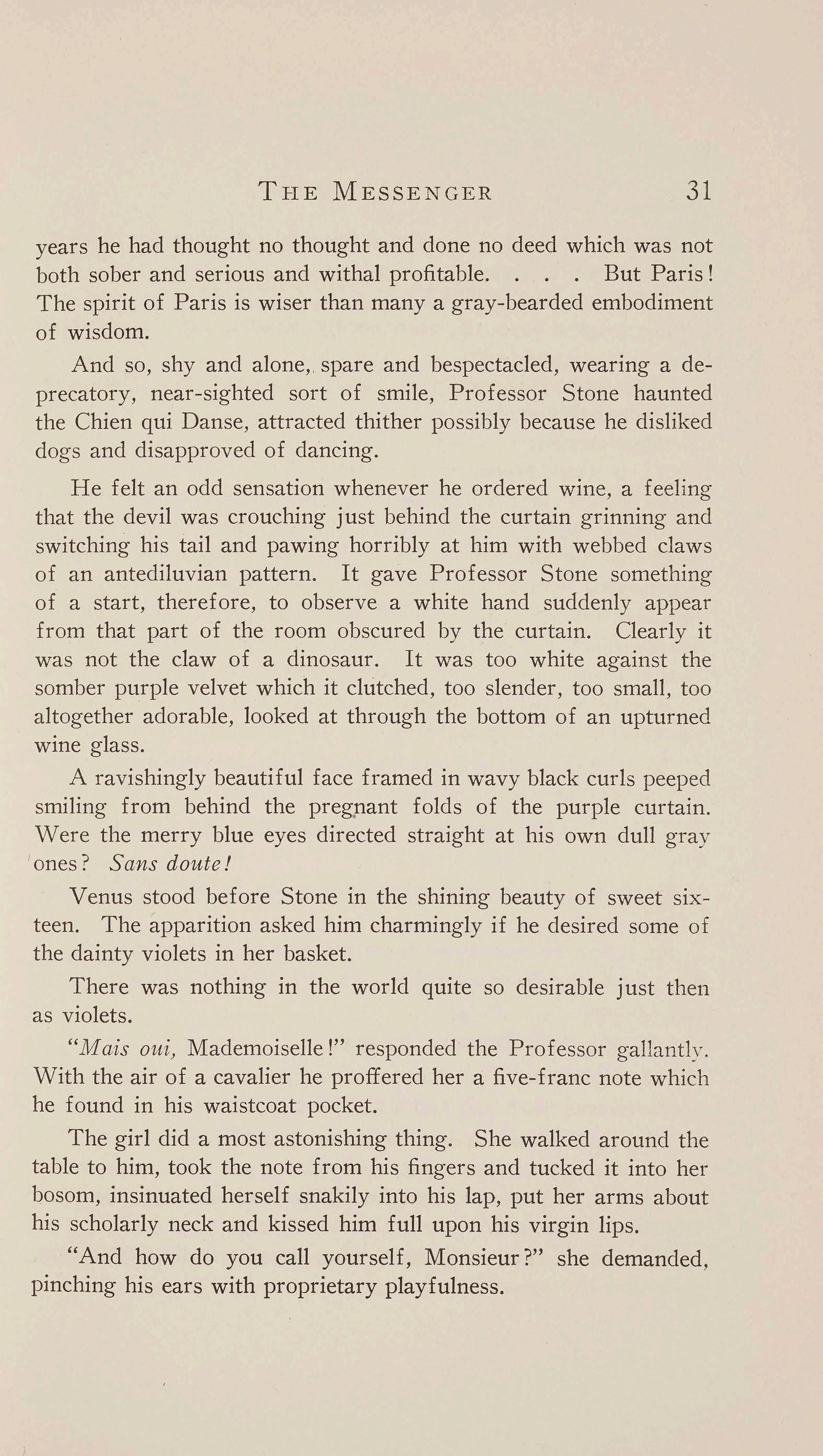
years he had thought no thought and done no deed which was not both sober and serious and withal profitable. But Paris! The spirit of Paris is wiser than many a gray-bearded embodiment of wisdom.
And so, shy and alone, , spare and bespectacled, wearing a deprecatory, near-sighted sort of smile, Professor Stone haunted the Chien qui Danse, attracted thither possibly because he disliked dogs and disapproved of dancing.
He felt an odd sensation whenever he ordered wine, a feeling that the devil was crouching just behind the curtain grinning and switching his tail and pawing horribly at him with webbed claws of an antediluvian pattern. It gave Professor Stone something of a start, therefore, to observe a white hand suddenly appear from that part of the room obscured by the curtain. Clearly it was not the claw of a dinosaur. It was too white against the somber purple velvet which it clutched, too slender, too small, too altogether adorable, looked at through the bottom of an upturned wine glass.
A ravishingly beautiful face framed in wavy black curls peeped smiling from behind the pregnant folds of the purple curtain. Were the merry blue eyes directed straight at his own dull gra y ' ones? Sans doute !
Venus stood before Stone in the shining beauty of sweet sixteen. The apparition asked him charmingly if he desired some of the dainty violets in her basket.
There was nothing in the world quite so desirable just then as violets.
"Mais oui, Mademoiselle!" responded the Professor gallantl y. With the air of a cavalier he proffered her a five-franc note which he found in his waistcoat pocket.
The girl did a most astonishing thing. She walked around the table to him, took the note from his fingers and tucked it into her bosom, insinuated herself snakily into his lap, put her arms about his scholarly neck and kissed him full upon his virgin lips.
"And how do you call yourself, Monsieur?" she demanded , pinching his ears with proprietary playfulness.
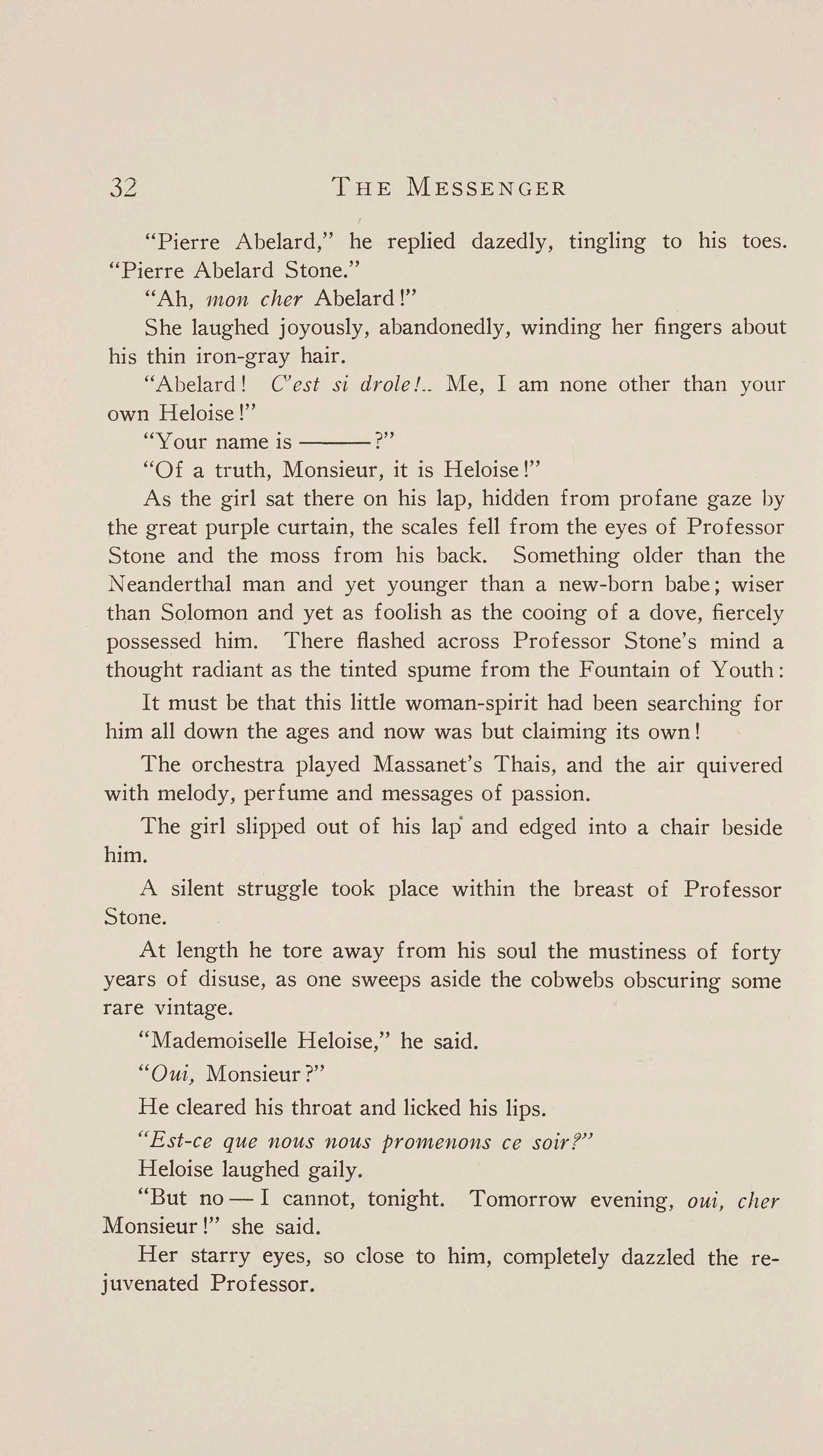
THE IVIESSENGER
"Pierre Abelard," he replied dazedly, tingling to his toes. "Pierre Abelard Stone."
"Ah, 1110ncher Abelard!"
She laughed joyously, abandonedly, winding her fingers about his thin iron-gray hair.
"Abelard! C est si drole !.. Me, I am none other than your own Heloise !"
"Your name is ---?"
"Of a truth, Monsieur, it is Heloise !"
As the girl sat there on his lap, hidden from profane gaze by the great purple curtain, the scales fell from the eyes of Professor Stone and the moss from his back. Something older than the Neanderthal man and yet younger than a new-born babe; wiser than Solomon and yet as foolish as the cooing of a dove, fiercely possessed him. There flashed across Professor Stone's mind a thought radiant as the tinted spume from the Fountain of Youth:
It must be that this little woman-spirit had been searching for him all down the ages and now was but claiming its own !
The orchestra played Massanet's Thais, and the air quivered with melody, perfume and messages of passion.
The girl slipped out of his lap· and edged into a chair beside him.
A silent struggle took place within the breast of Professor Stone.
At length he tore away from his soul the mustiness of forty years of disuse, as one sweeps aside the cobwebs obscuring some rare vintage.
"Mademoiselle Heloise," he said.
"Oui, Monsieur?"
He cleared his throat and licked his lips.
"Est-ce que nous nous promenons ce soir?"
Heloise laughed gaily.
"But no -I cannot, tonight. Tomorrow evening, oui, cher Monsieur!" she said.
Her starry eyes, so close to him, completely dazzled the rejuvenated Professor.
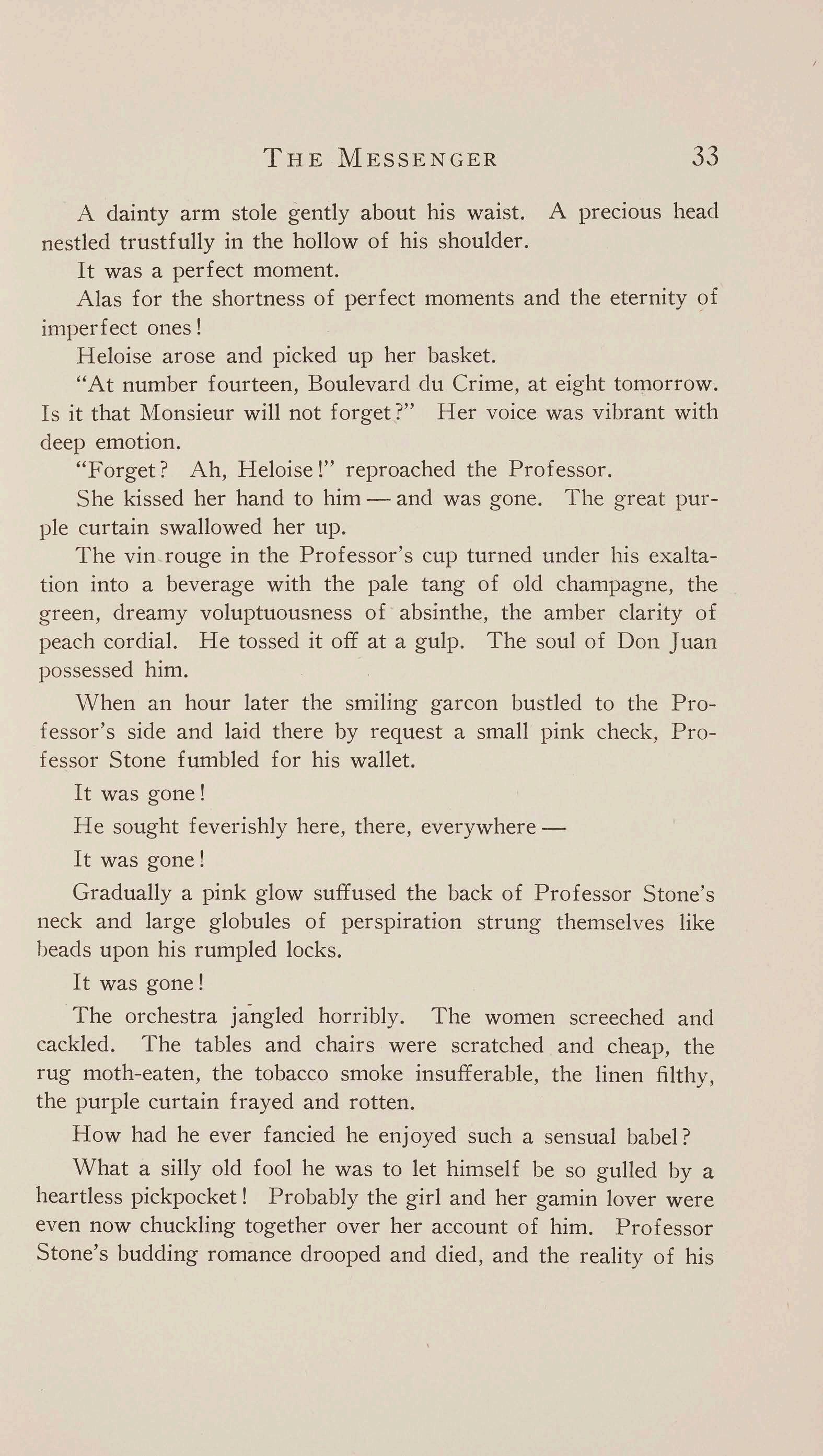
A dainty arm stole gently about his waist. A precious head nestled trustfully in the hollow of his shoulder. It was a perfect moment.
Alas for the shortness of perfect moments and the eternity of imperfect ones!
Heloise arose and picked up her basket.
"At number fourteen, Boulevard du Crime, at eight tomorrow. Is it that Monsieur will not forget?" Her voice was vibrant with deep emotion.
"Forget? Ah, Heloise !" reproached the Professor.
She kissed her hand to him - and was gone. The great purple curtain swallowed her up.
The vin rouge in the Professor's cup turned under his exaltation into a beverage with the pale tang of old champagne, the green, dreamy voluptuousness of absinthe, the amber clarity of peach cordial. He tossed it off at a gulp. The soul of Don Juan possessed him.
When an hour later the smiling garcon bustled to the Professor's side and laid there by request a small pink check, Professor Stone fumbled for his wallet.
It was gone!
He sought feverishly here, there, everywhereIt was gone!
Gradually a pink glow suffused the back of Professor Stone's neck and large globules of perspiration strung themselves like beads upon his rumpled locks.
It was gone!
The orchestra jangled horribly. The women screeched and cackled. The tables and chairs were scratched and cheap, the rug moth-eaten, the tobacco smoke insufferable, the linen filthy, the purple curtain frayed and rotten.
How had he ever fancied he enjoyed such a sensual babel?
What a silly old fool he was to let himself be so gulled by a heartless pickpocket ! Probably the girl and her gamin lover were even now chuckling together over her account of him. Professor Stone's budding romance drooped and died, and the reality of his
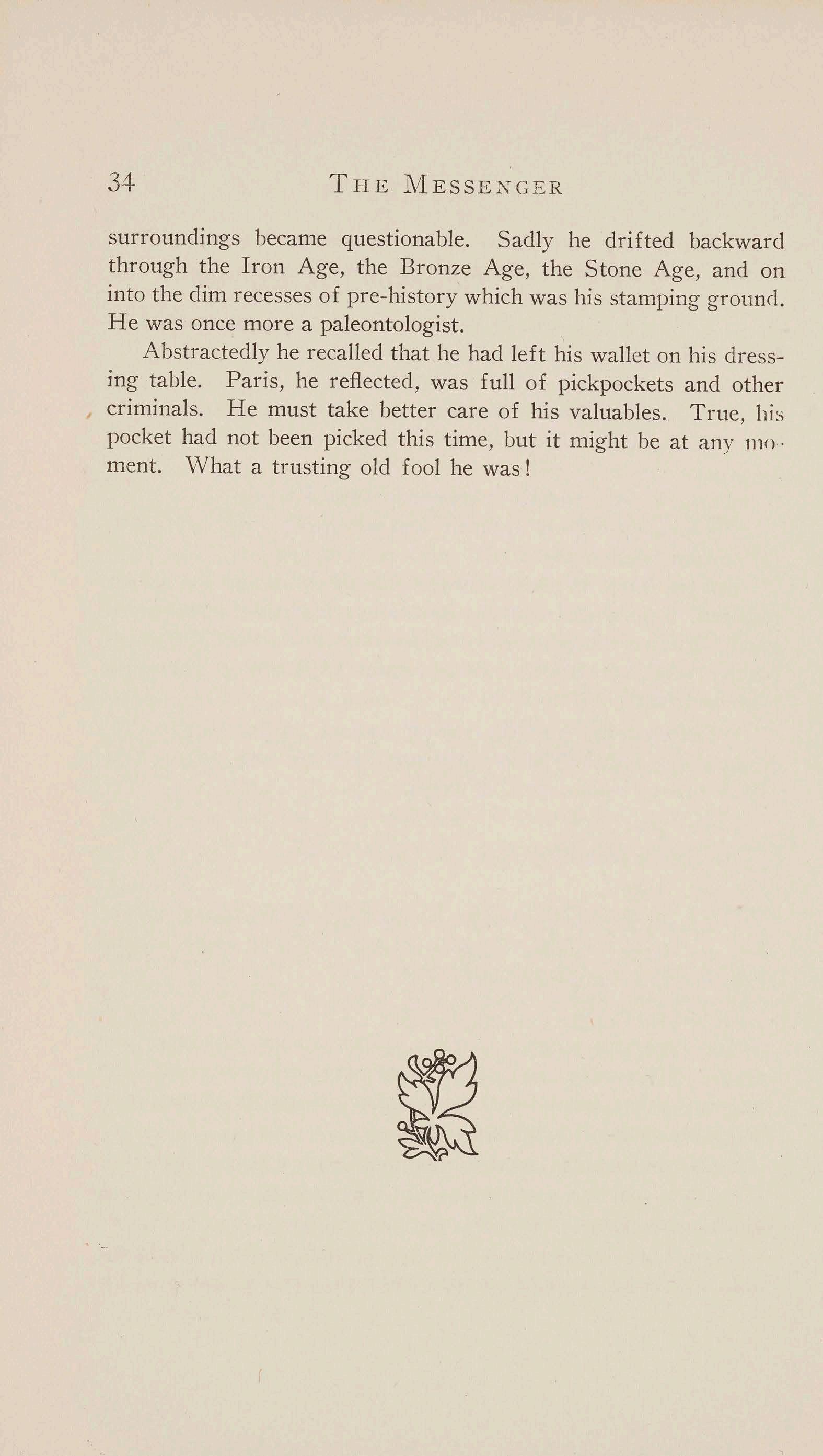
THE MESSENGER
surroundings became questionable. Sadly he drifted backward through the Iron Age, the Bronze Age, the Stone Age, and on into the dim recesses of pre-history which was his stamping ground. He was once more a paleontologist.
Abstractedly he recalled that he had left his wallet on his dressing table. Paris, he reflected, was full of pickpockets and other criminals. He must take better care of his valuables. True, his pocket had not been picked this time, but it might be at any mo• ment. ·what a trusting old fool he was!
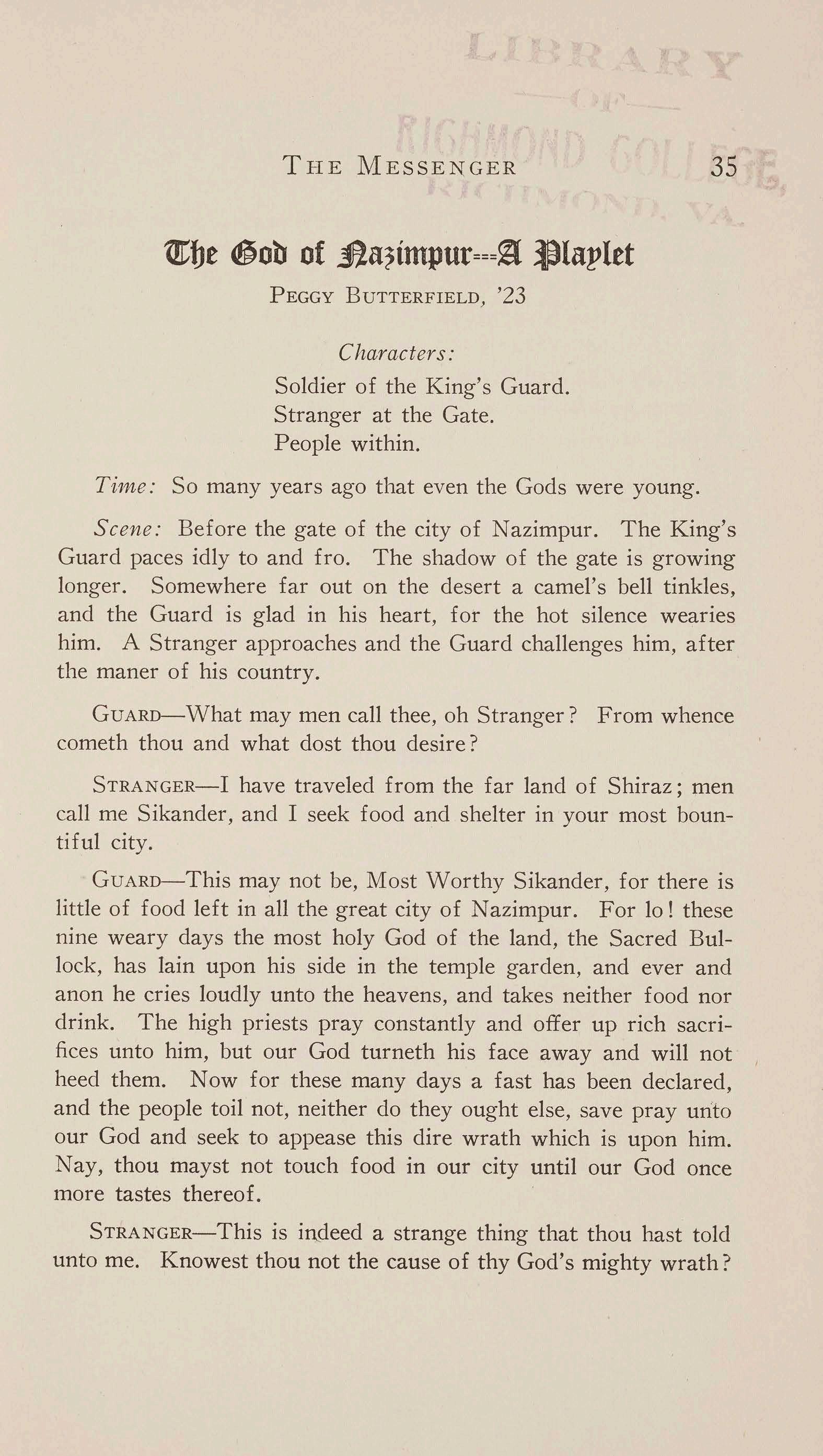
~be ~ob of Jla}impur===~lllapltt
PEGGYBUTTERFIELD,'23
Characters:
Soldier of the King's Guard. Stranger at the Gate. People within. 35
Time: So many years ago that even the Gods were young.
Scene: Before the gate of the city of Nazimpur. The King's Guard paces idly to and fro. The shadow of the gate is growing longer. Somewhere far out on the desert a camel's bell tinkles, and the Guard is glad in his heart, for the hot silence wearies him. A Stranger approaches and the Guard challenges him, after the maner of his country.
GuARD--What may men call thee, oh Stranger? From whence cometh thou and what dost thou desire?
STRANGER-I have traveled from the far land of Shiraz; men call me Sikander, and I seek food and shelter in your most bountiful city.
GUARD-This may not be, Most Worthy Sikander, for there is little of food left in all the great city of Nazimpur. For lo! these nine weary clays the most holy God of the land, the Sacred Bullock, has lain upon his side in the temple garden, and ever and anon he cries loudly unto the heavens, and takes neither food nor drink. The high priests pray constantly and offer up rich sacrifices unto him, but our God turneth his face away and will not heed them. Now for these many days a fast has been declared, and the people toil not, neither do they ought else, save pray unto our God and seek to appease this dire wrath which is upon him. Nay, thou mayst not touch food in our city until our God once more tastes thereof.
STRANGER-This is in_cleeda strange thing that thou hast told unto me. Knowest thou not the cause of thy God's mighty wrath?
THE MESSENGER
GuARD-O£ a truth it is that which the priests cannot explain. He has been a just and merciful God, and we have served him right gladly, but now--
(A cry rises from within the city, the last bit of the sun slips over the distant edge of the desert, and the world is smothered in twilight; the wail of the city rises higher and higher.)
PEOPLE-Our God is dead ! Our God is dead !
Gu ARD (falling on his face )-Our God is dead !
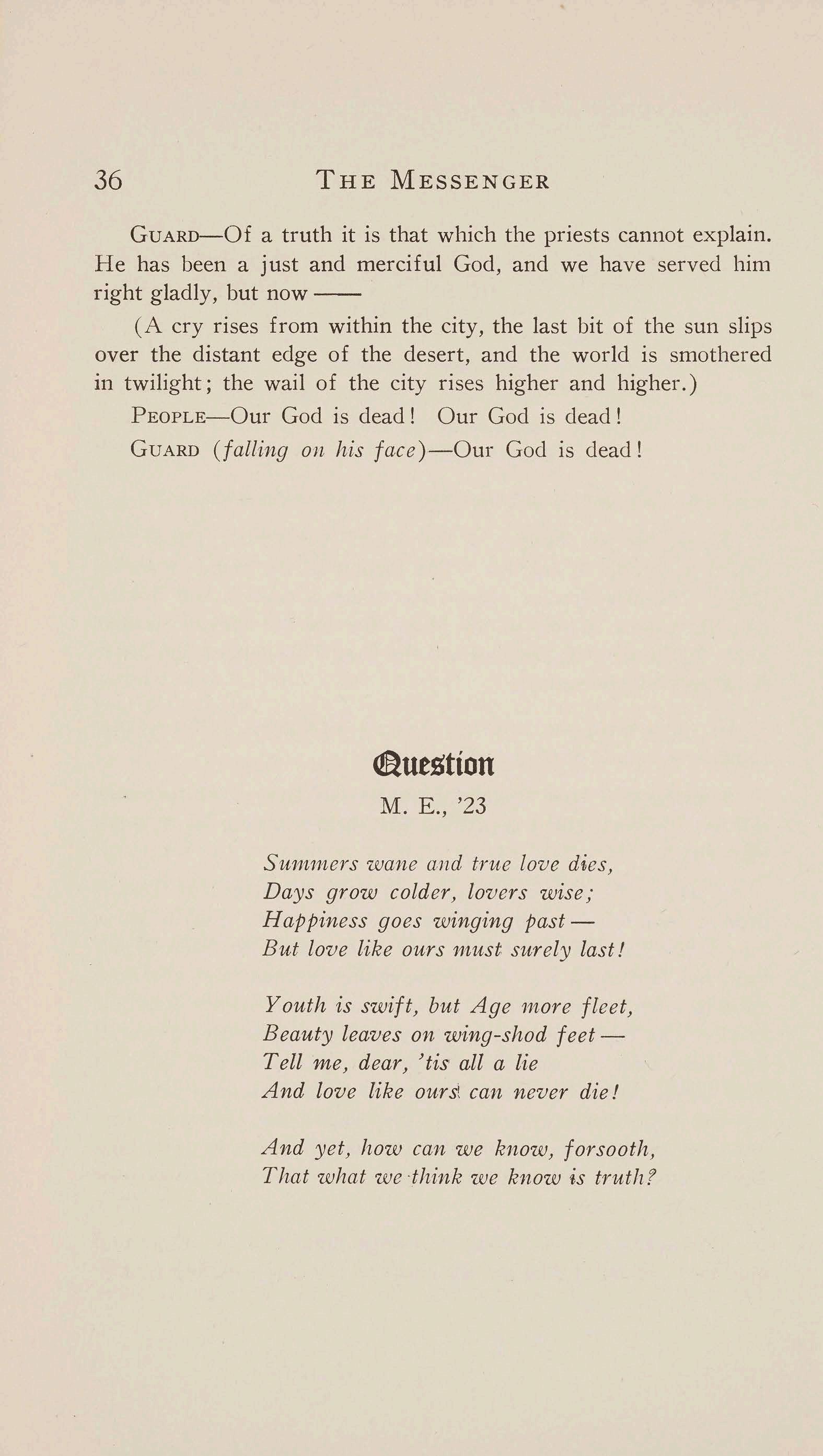
~ut~tion
M. E., '23
Sumwiers wane and true love dies, Days grow colder, lovers wise; Happiness goes winging pastBut love like ours must surely last!
Youth is swift, but Age niore fleet, Beauty leaves on wing-shod feetTell me, dear, 'tis all a lie And love like our st can never die!
And yet, how can we know, forsooth, That what we think we know is truth?
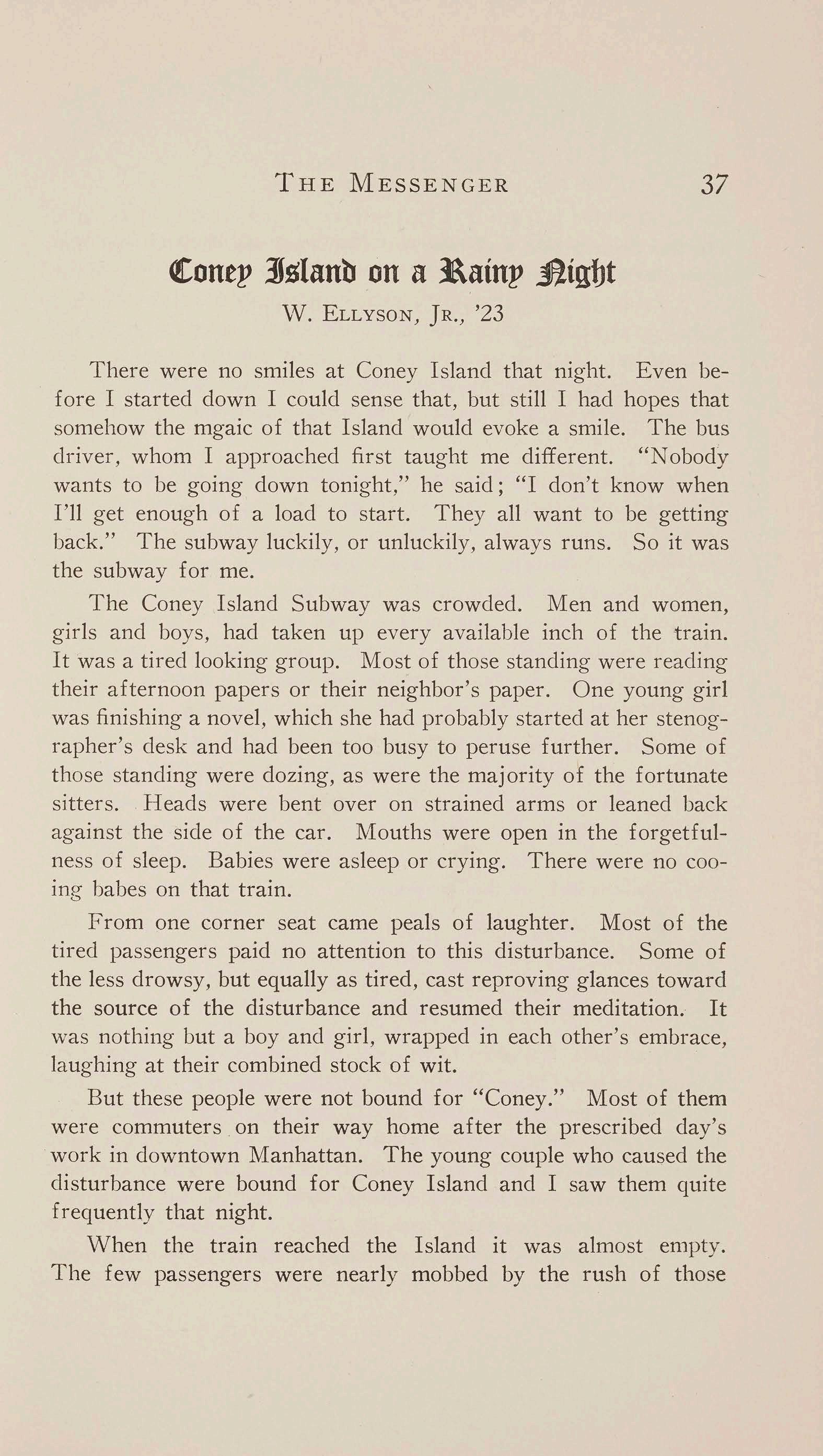
<tontp)$lanb on a l\ainp j}igbt
\V. ELLYSON, JR., '23
There were no smiles at Coney Island that night. Even before I started clown I could sense that, but still I had hopes that somehow the mgaic of that Island would evoke a smile. The bus driver, whom I approached first taught me different "Nobody wants to be going clown tonight," he said; "I don't know when I'll get enough of a load to start. They all want to be getting back." The subway luckily, or unluckily, always runs. So it was the subway for me.
The Coney Island Subway was crowded. Men and women, girls and boys , had taken up every available inch of the train. It was a tired looking group. Most of those standing were reading their afternoon papers or their neighbor's paper. One young girl was finishing a novel, which she had probably started at her stenographer's desk and had been too busy to peruse further. Some of those standing were dozing, as were the majority of the fortunate sitters. Heads were bent over on strained arms or leaned back against the side of the car. Mouths were open in the forgetfulness of sleep. Babies were asleep or crying. There were no cooing babes on that train.
From one corner seat came peals of laughter. Most of the tired passengers paid no attention to this disturbance. Some of the less drowsy, but equally as tired, cast reproving glances toward the source of the disturbance and resumed their meditation. It was nothing but a boy and girl, wrapped in each other's embrace, laughing at their combined stock of wit.
But these people were not bound for "Coney." Most of them were commuters . on their way home after the prescribed clay's work in downtown Manhattan. The young couple who caused the disturbance were bound for Coney Island and I saw them quite frequently that night.
When the train reached the Island it was almost empty. The few passengers were nearly mobbed by the rush of those
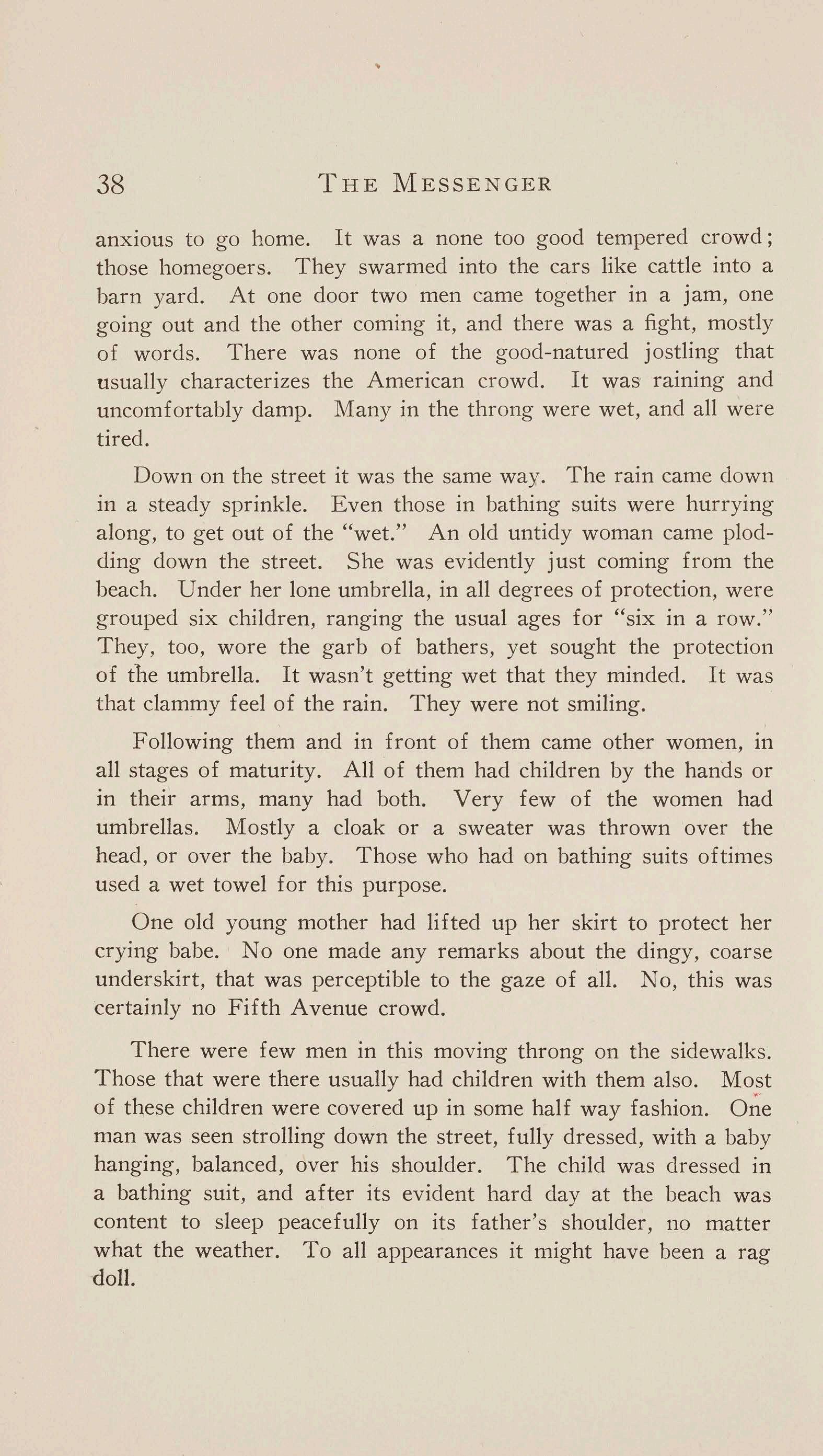
anxious to go home. It was a none too good tempered crowd; those homegoers. They swarmed into the cars like cattle into a barn yard. At one door two men came together in a jam, one going out and the other coming it, and there was a fight, mostly of words. There was none of the good-natured jostling that usually characterizes the American crowd. It was raining and uncomfortably damp. Many in the throng were wet, and all were tired.
Down on the street it was the same way. The rain came down in a steady sprinkle. Even those in bathing suits were hurrying along, to get out of the "wet." An old untidy woman came plodding down the street. She was evidently just coming from the beach. Under her lone umbrella, in all degrees of protection, were grouped six children, ranging the usual ages for "six in a row." They, too, wore the garb of bathers, yet sought the protection of the umbrella. It wasn't getting wet that they minded. It was that clammy feel of the rain. They were not smiling.
Following them and in front of them came other women, in all stages of maturity. All of them had children by the hands or in their arms, many had both. Very few of the women had umbrellas. Mostly a cloak or a sweater was thrown over the head, or over the baby. Those who had on bathing suits oftimes used a wet towel for this purpose.
One old young mother had lifted up her skirt to protect her crying babe. No one made any remarks about the dingy, coarse underskirt, that was perceptible to the gaze of all. No, this was certainly no Fifth Avenue crowd.
There were few men in this moving throng on the sidewalks. Those that were there usually had children with them also. Most of these children were covered up in some half way fashion. O~e man was seen strolling down the street, fully dressed, with a baby hanging, balanced, over his shoulder. The child was dressed in a bathing suit, and after its evident hard day at the beach was content to sleep peacefully on its father's shoulder, no matter what the weather. To all appearances it might have been a rag doll.
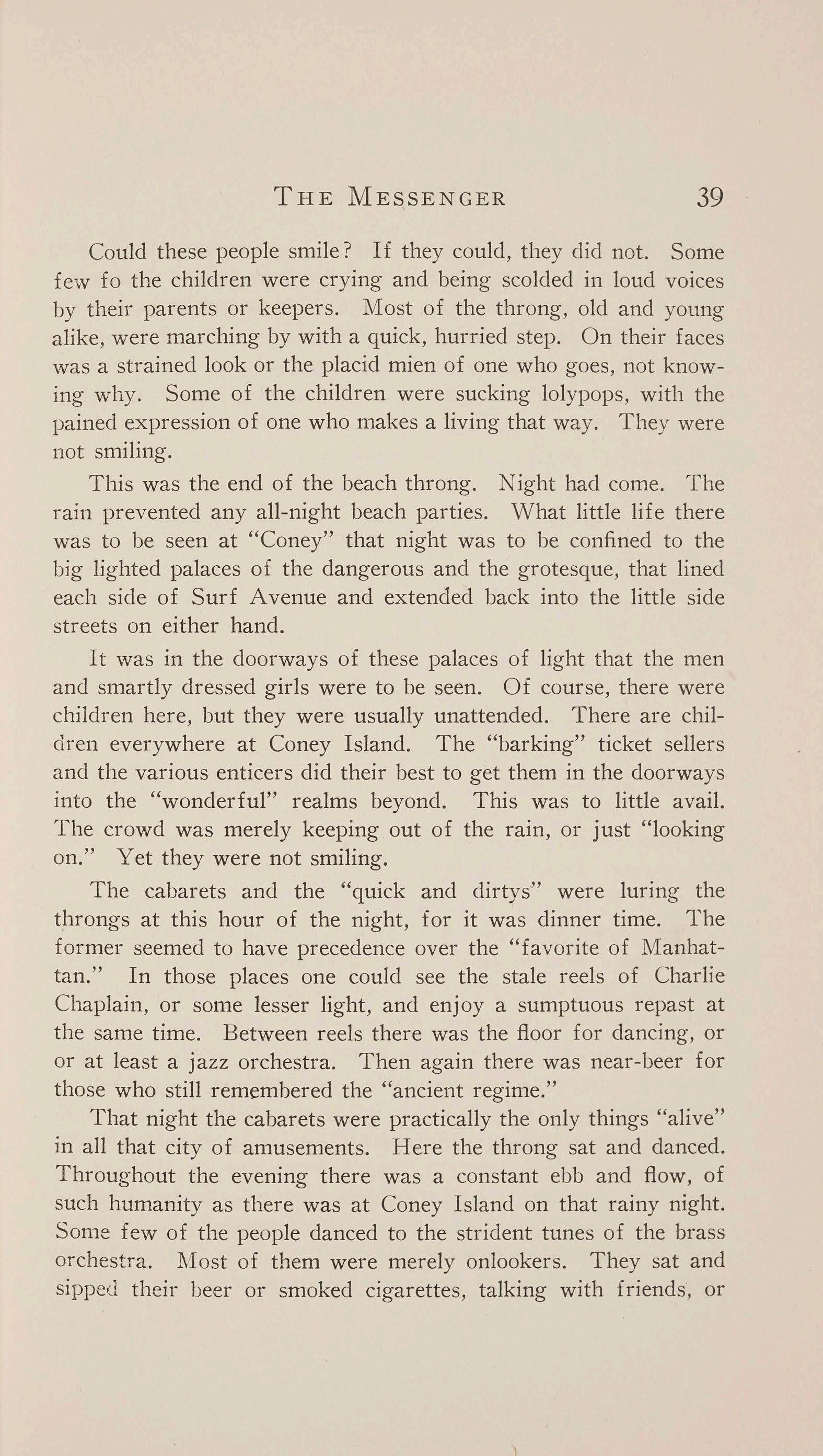
Could these people smile? If they could, they did not. Some few fo the children were crying and being scolded in loud voices by their parents or keepers. Most of the throng, old and young alike, were marching by with a quick, hurried step. On their faces was a strained look or the placid mien of one who goes, not knowing why. Some of the children were sucking lolypops, with the pained expression of one who makes a living that way. They were not smiling.
This was the encl of the beach throng. Night had come. The rain prevented any all-night beach parties. What little life there was to be seen at "Coney" that night was to be confined to the big lighted palaces of the dangerous and the grotesque, that lined each side of Surf A venue and extended back into the little side streets on either hand.
It was in the doorways of these palaces of light that the men and smartly dressed girls were to be seen. Of course, there were children here, but they were usually unattended. There are children everywhere at Coney Island. The "barking" ticket sellers and the various enticers did their best to get them in the doorways into the "wonderful" realms beyond. This was to little avail. The crowd was merely keeping out of the rain, or just "looking on." Yet they were not smiling.
The cabarets and the "quick and dirtys" were luring the throngs at this hour of the night, for it was dinner time. The former seemed to have precedence over the "favorite of Manhattan." In those places one could see the stale reels of Charlie Chaplain, or some lesser light, and enjoy a sumptuous repast at the same time. Between reels there was the floor for dancing, or or at least a jazz orchestra. Then again there was near-beer for those who still remembered the "ancient regime."
That night the cabarets were practically the only things "alive" in all that city of amusements. Here the throng sat and danced. Throughout the evening there was a constant ebb and flow, of such humanity as there was at Coney Island on that rainy night. Some few of the people danced to the strident tunes of the brass orchestra. Most of them were merely onlookers. They sat and sipped their beer or smoked cigarettes, talking with friends, or
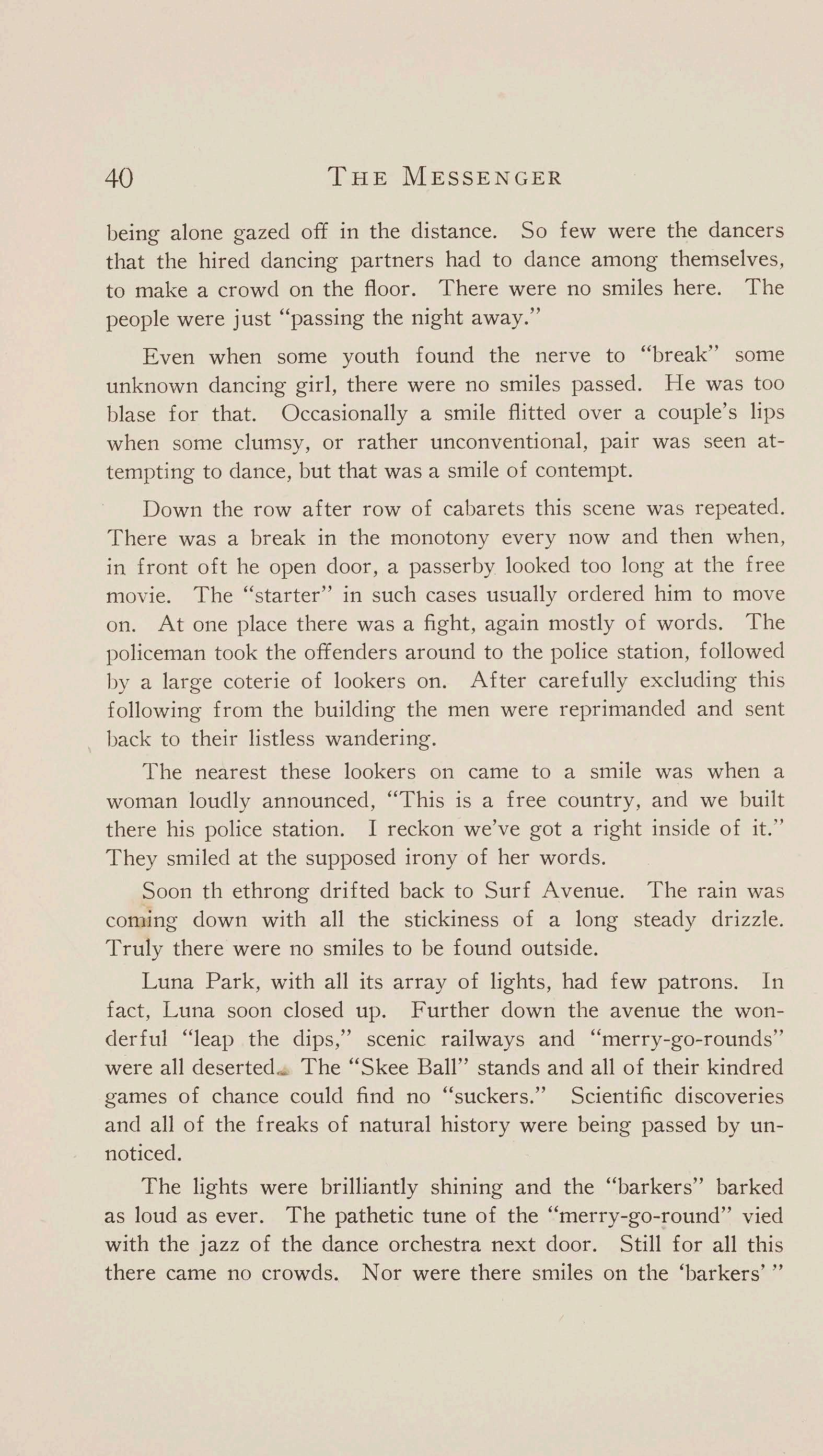
40 THE MESSENGER
being alone gazed off in the distance. So few were the dancers that the hired dancing partners had to dance among themselves, to make a crowd on the floor. There were no smiles here. The people were just "passing the night away."
Even when some youth found the nerve to "break" some unknown dancing girl, there were no smiles passed. He was too blase for that. Occasionally a smile flitted over a couple's lips when some clumsy, or rather unconventional, pair was seen attempting to dance, but that was a smile of contempt.
Down the row after row of cabarets this scene was repeated. There was a break in the monotony every now and then when, in front oft he open door, a passerby looked too long at the free movie. The "starter" in such cases usually ordered him to move on. At one place there was a fight, again mostly of words. The policeman took the offenders around to the police station, followed by a large coterie of lookers on. After carefully excluding this following from the building the men were reprimanded and sent back to their listless wandering.
The nearest these lookers on came to a smile was when a woman loudly announced, "This is a free country, and we built there his police station. I reckon we've got a right inside of it." They smiled at the supposed irony of her words.
Soon th ethrong drifted back to Surf Avenue. The rain was coming clown with all the stickiness of a long steady drizzle. Truly there were no smiles to be found outside.
Luna Park, with all its array of lights, had few patrons. In fact, Luna soon closed up. Further clown the avenue the wonderful "leap the clips," scenic railways and "merry-go-rounds" were all deserted - The "Skee Ball" stands and all of their kindred games of chance could find no "suckers." Scientific discoveries and all of the freaks of natural history were being passed by unnoticed.
The lights were brilliantly shining and the "barkers" barked as loud as ever. The pathetic tune of the "merry-go-round" vied with the jazz of the dance orchestra next door. Still for all this there came no crowds. Nor were there smiles on the 'barkers'"
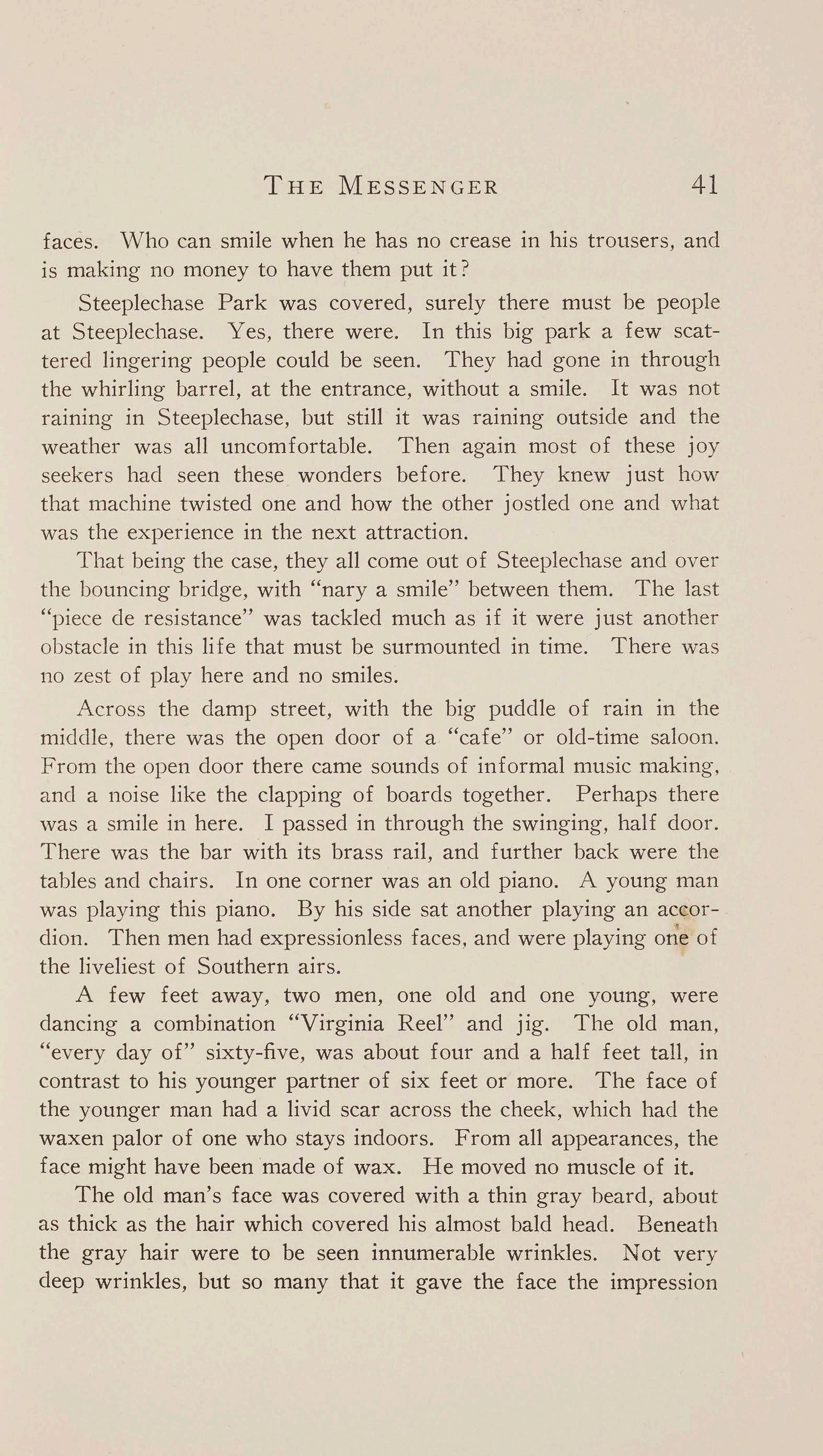
41 faces. \i\Tho can smile when he has no crease in his trousers, and is making no money to have them put it?
Steeplechase Park was covered, surely there must be people at Steeplechase. Yes, there were. In this big park a few scattered lingering people could be seen. They had gone in through the whirling barrel, at the entrance, without a smile. It was not raining in Steeplechase, but still it was raining outside and the weather was all uncomfortable. Then again most of these joy seekers had seen these wonders before. They knew just how that machine twisted one and how the other jostled one and what was the experience in the next attraction.
That being the case, they all come out of Steeplechase and over the bouncing bridge, with "nary a smile" between them. The last "piece de resistance" was tackled much as if it were just another obstacle in this life that must be surmounted in time. There was no zest of play here and no smiles.
Across the clamp street, with the big puddle of rain in the middle, there was the open door of a "cafe" or old-time saloon From the open door there came sounds of informal music making, and a noise like the clapping of boards together. Perhaps there was a smile in here. I passed in through the swinging, half door. There was the bar with its brass rail, and further back were the tables and chairs. In one corner was an old piano. A young man was playing this piano. By his side sat another playing an accordion. Then men had expressionless faces, and were playing orie of the liveliest of Southern airs.
A few feet away, two men, one old and one young, were dancing a combination "Virginia Reel" and jig. The old man, "every clay of" sixty-five, was about four and a half feet tall, in contrast to his younger partner of six feet or more. The face of the younger man had a livid scar across the cheek, which had the waxen palor of one who stays indoors. From all appearances, the face might have been made of wax. He moved no muscle of it.
The old man's face was covered with a thin gray beard, about as thick as the hair which covered his almost bald head. Beneath the gray hair were to be seen innumerable wrinkles. Not very deep wrinkles, but so many that it gave the face the impression
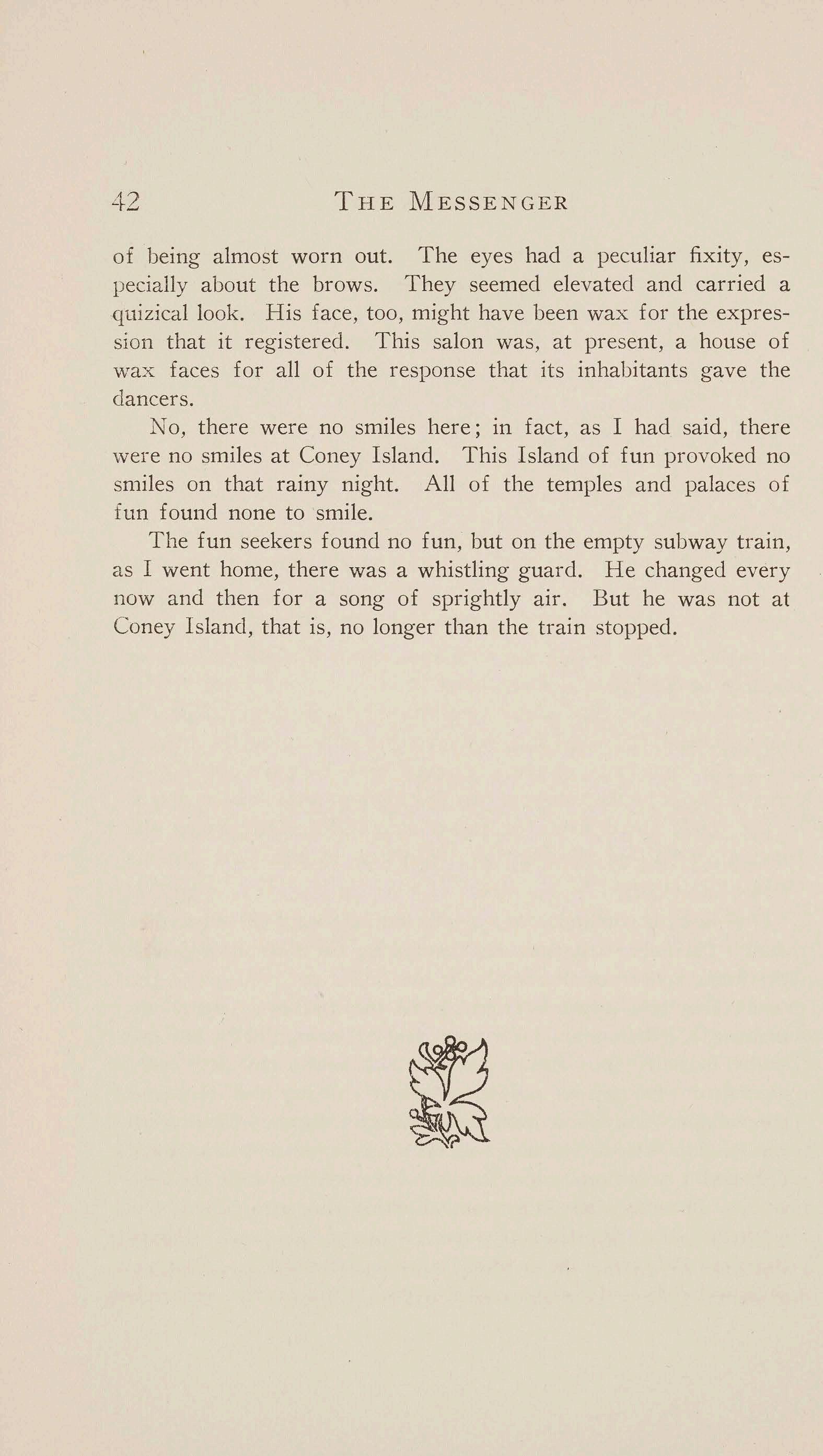
42 THE MESSENGER
of being almost worn out. The eyes had a peculiar fixity, especially about the brows. They seemed elevated and carried a quizical look. His face, too, might have been wax for the expression that it registered. This salon was, at present, a house of wax faces for all of the response that its inhabitants gave the dancers.
No, there were no smiles here; in fact, as I had said, there were no smiles at Coney Island. This Island of fun provoked no smiles on that rainy night. All of the temples and palaces of fun found none to smile.
The fun seekers found no fun, but on the empty subway train, as I went home, there was a whistling guard. He changed every now and then for a song of sprightly air. But he was not at Coney Island, that is, no longer than the train stopped.
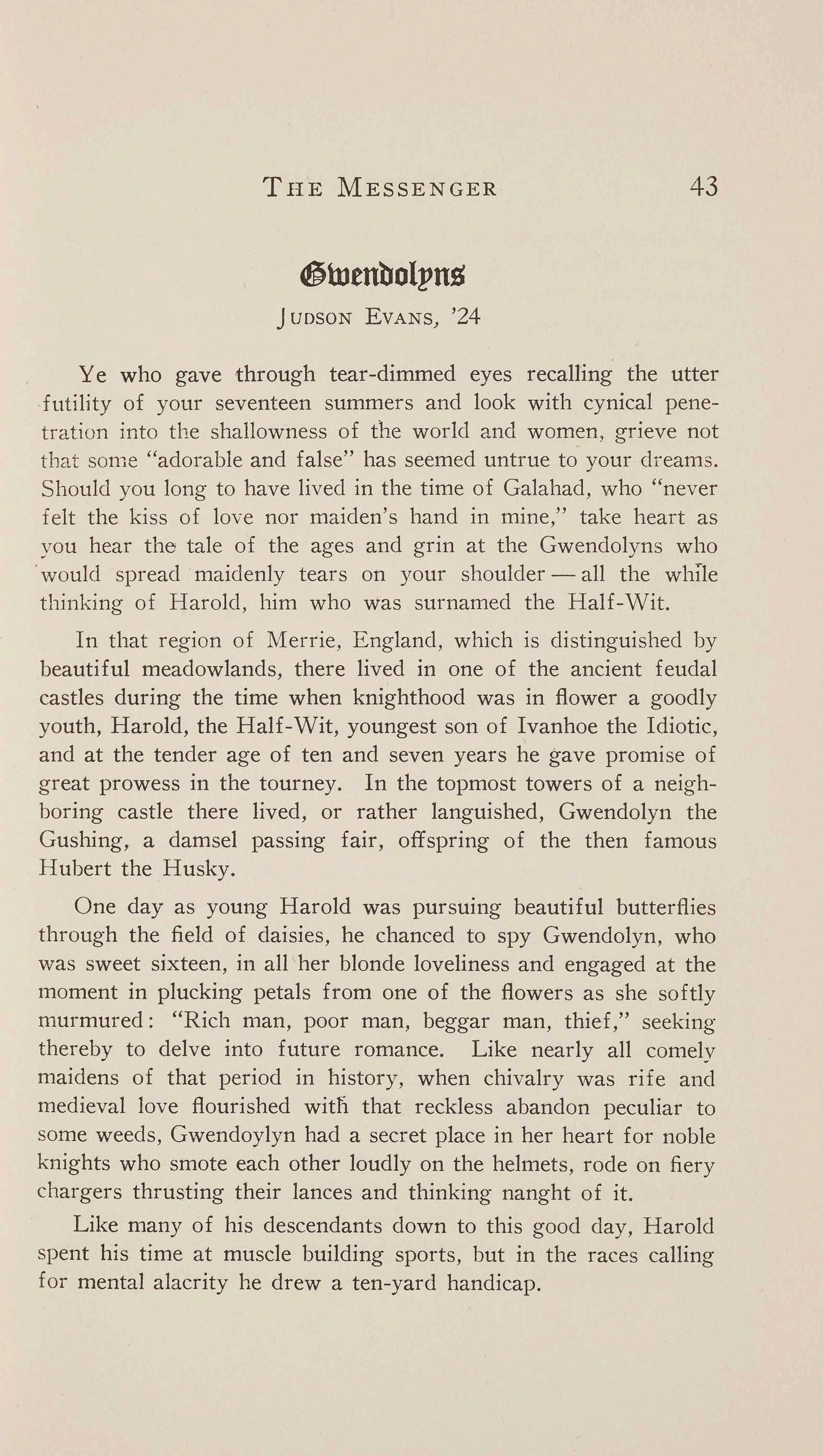
c!?hltnbolpn~
j UDSON EVANS, '24
Ye who gave through tear-dimmed eyes recalling the utter -futility of your seventeen summers and look with cynical penetration into the shallowness of the world and women , grieve not that some "adorable and false" has seemed untrue to your dreams. Should you long to have lived in the time of Galahad, who "never felt the kiss of love nor maiden's hand in mine," take heart as you hear the tale of the ages and grin at the Gwendolyns who ·would spread maidenly tears on your shoulder - all the whi1e thinking of Harold, him who was surnamed the Half-Wit.
In that region of Merrie, England, which is distinguished by beautiful meadowlands, there lived in one of the ancient feudal castles during the time when knighthood was in flower a goodly youth, Harold, the Half-Wit, youngest son of Ivanhoe the Idiotic, and at the tender age of ten and seven years he gave promise of great prowess in the tourney. In the topmost towers of a neighboring castle there lived, or rather languished, Gwendolyn the Gushing, a damsel passing fair, offspring of the then famous Hubert the Husky.
One day as young Harold was pursuing beautiful butterflies through the field of daisies, he chanced to spy Gwendolyn, who was sweet sixteen, in all her blonde loveliness and engaged at the moment in plucking petals from one of the flowers as she softly murmured : "Rich man, poor man, beggar man, thief," seeking thereby to delve into future romance. Like nearly all comely maidens of that period in history, when chivalry was rife and medieval love flourished witfi. that reckless abandon peculiar to some weeds, Gwendoylyn had a secret place in her heart for noble knights who smote each other loudly on the helmets, rode on fiery chargers thrusting their lances and thinking nanght of it.
Like many of his descendants down to this good clay, Harold spent his time at muscle building sports, but in the races calling for mental alacrity he drew a ten-yard handicap.
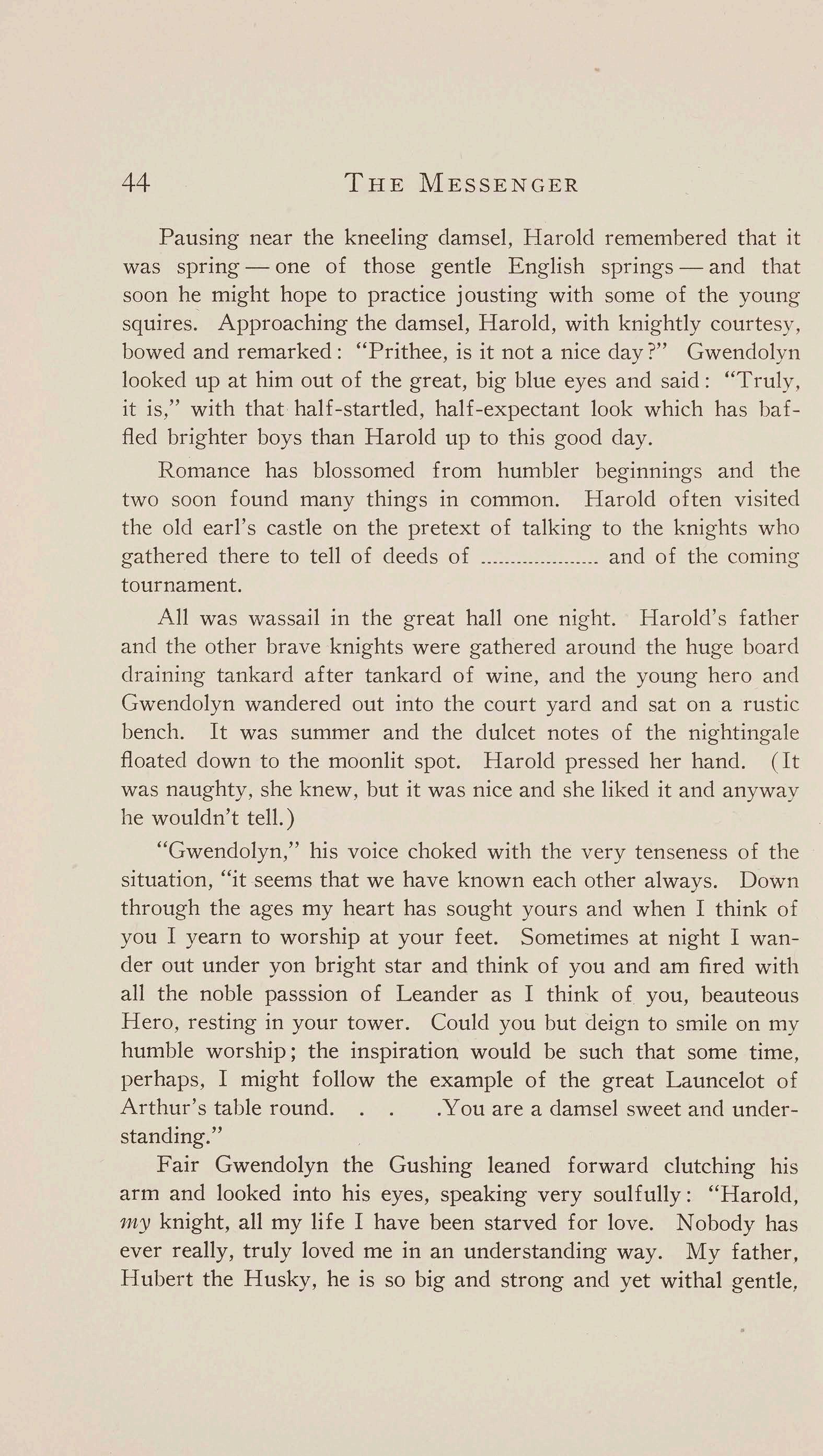
THE MESSENGER
Pausing near the kneeling damsel, Harold remembered that it was spring -one of those gentle English springs -and that soon he might hope to practice jousting with some of the young squires. Approaching the damsel, Harold, with knightly courtesy, bowed and remarked: "Prithee, is it not a nice day?" Gwendolyn looked up at him out of the great, big blue eyes and said: "Truly, it is," with that half-startled, half-expectant look which has baffled brighter boys than Harold up to this good day.
Romance has blossomed from humbler beginnings and the two soon found many things in common. Harold often visited the old earl's castle on the pretext of talking to the knights who gathered there to tell of deeds of ·····---··-·········and of the coming tournament.
All was wassail in the great hall one night. Harold's father and the other brave knights were gathered around the huge board draining tankard after tankard of wine, and the young hero and Gwendolyn wandered out into the court yard and sat on a rustic bench. It was summer and the dulcet notes of the nightingale floated down to the moonlit spot. Harold pressed her hand. ( It was naughty, she knew, but it was nice and she liked it and anyway he wouldn't tell.)
"Gwendolyn," his voice choked with the very tenseness of the situation, "it seems that we have known each other always. Down through the ages my heart has sought yours and when I think of you I yearn to worship at your feet. Sometimes at night I wander out under yon bright star and think of you and am fired with all the noble passsion of Leander as I think of you, beauteous Hero, resting in your tower. Could you but deign to smile on my humble worship; the inspiration would be such that some time, perhaps, I might follow the example of the great Launcelot of Arthur's table round. .You are a damsel sweet and understanding."
Fair Gwendolyn the Gushing leaned forward clutching his arm and looked into his eyes, speaking very soulfully: "Harold, my knight, all my life I have been starved for love. Nobody has ever really, truly loved me in an understanding way. My father, Hubert the Husky, he is so big and strong and yet withal gentle,
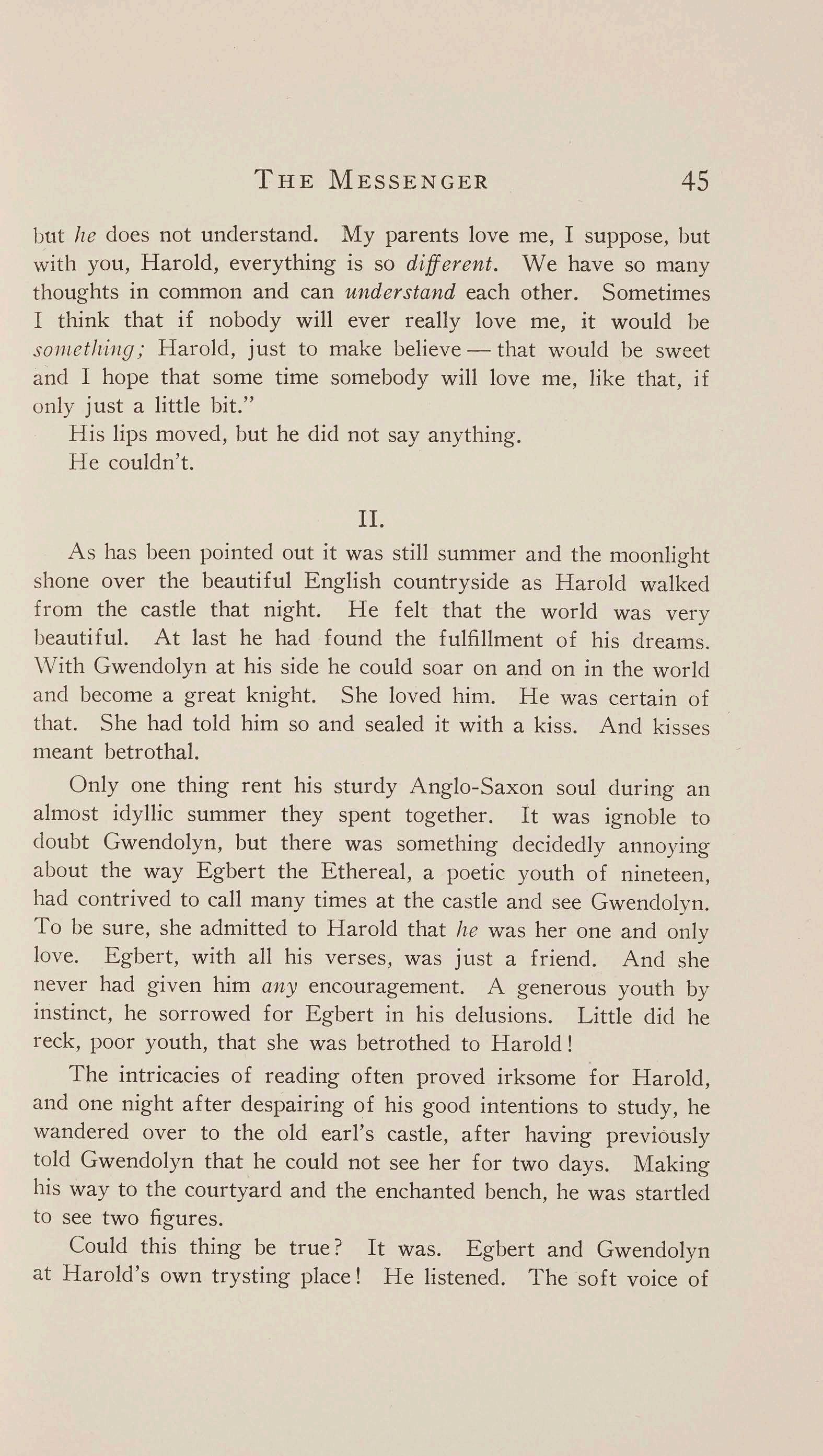
but he does not understand. My parents love me, I suppose, but with you, Harold, everything is so different. We have so many thoughts in common and can understand each other. Sometimes I think that if nobody will ever really love me, it would be so111ethi11g;Harold, just to make believe - that would be sweet and I hope that some time somebody will love me, like that, if only just a little bit."
His lips moved, but he did not say anything. He couldn't.
II.
As has been pointed out it was still summer and the moonlight shone over the beautiful English countryside as Harold walked from the castle that night. He felt that the world was very beautiful. At last he had found the fulfillment of his dreams. \Vith Gwendolyn at his side he could soar on and on in the world and become a great knight. She loved him. He was certain of that. She had told him so and sealed it with a kiss. And kisses meant betrothal.
Only one thing rent his sturdy Anglo-Saxon soul during an almost idyllic summer they spent together. It was ignoble to doubt Gwendolyn, but there was something decidedly annoying about the way Egbert the Ethereal, a poetic youth of nineteen, had contrived to call many times at the castle and see Gwendolyn. To be sure, she admitted to Harold that he was her one and only love. Egbert, with all his verses, was just a friend. And she never had given him any encouragement. A generous youth by instinct, he sorrowed for Egbert in his delusions. Little did he reek, poor youth, that she was betrothed to Harold !
The intricacies of reading often proved irksome for Harold, and one night after despairing of his good intentions to study, he wandered over to the old earl's castle, after having previously told Gwendolyn that he could not see her for two clays. Making his way to the courtyard and the enchanted bench, he was startled to see two figures.
Could this thing be true? It was. Egbert and Gwendolyn at Harold's own trysting place! He listened. The soft voice of
1-6 THE MESSENGER
the fairest of all the fair filled with trembling accents: "All my life I have been starved for love - (What? Strange, passing strange) - and just to make-believe that would be so111ething." Odds bodkins! Ten thousand deep and sulphurous curses! She had played him in the fog.
Fickle woman! Her betrothal kiss. Ugh! The revulsion was terrible.
Disillusionment, cynicism. He was forever through with the sex.
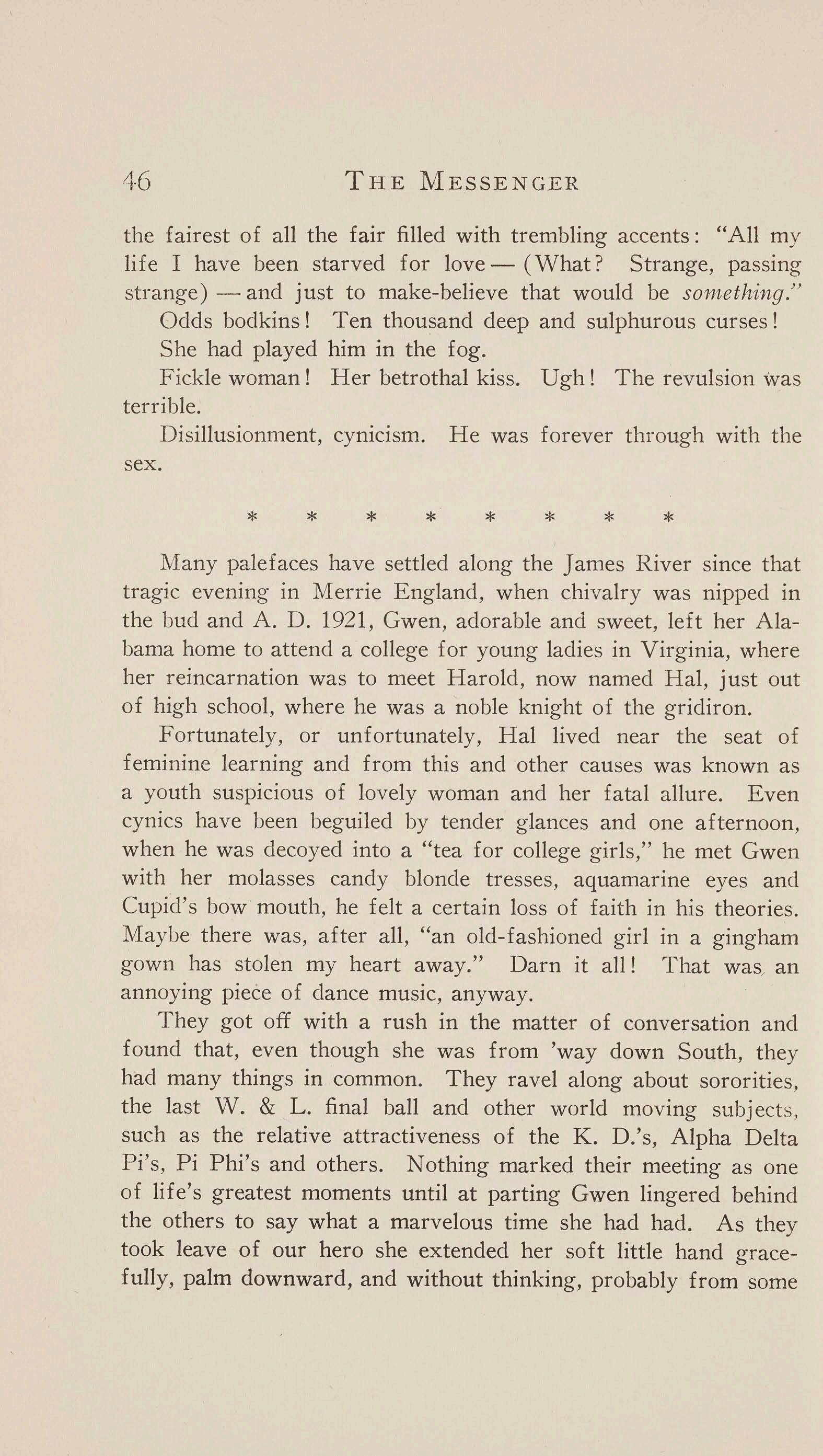
Many palefaces have settled along the James River since that tragic evening in Merrie England, when chivalry was nipped in the bud and A. D. 1921, Gwen, adorable and sweet, left her Alabama home to attend a college for young ladies in Virginia, where her reincarnation was to meet Harold, now named Hal, just out of high school, where he was a noble knight of the gridiron. Fortunately, or unfortunately, Hal lived near the seat of feminine learning and from this and other causes was known as a youth suspicious of lovely woman and her fatal allure. Even cynics have been beguiled by tender glances and one afternoon, when he was decoyed into a "tea for college girls," he met Gwen with her molasses candy blonde tresses, aquamarine eyes and Cupid's bow mouth, he felt a certain loss of faith in his theories. Maybe there was, after all, "an old-fashioned girl in a gingham gown has stolen my heart away." Darn it all! That was an annoying piece of dance music, anyway.
They got off with a rush in the matter of conversation and found that, even though she was from 'way down South, they had many things in common. They ravel along about sororities, the last W. & L. final ball and other world moving subjects, such as the relative attractiveness of the K. D.'s, Alpha Delta Pi's, Pi Phi's and others. Nothing marked their meeting as one of life's greatest moments until at parting Gwen lingered behind the others to say what a marvelous time she had had. As they took leave of our hero she extended her soft little hand gracefully, palm downward, and without thinking, probably from some
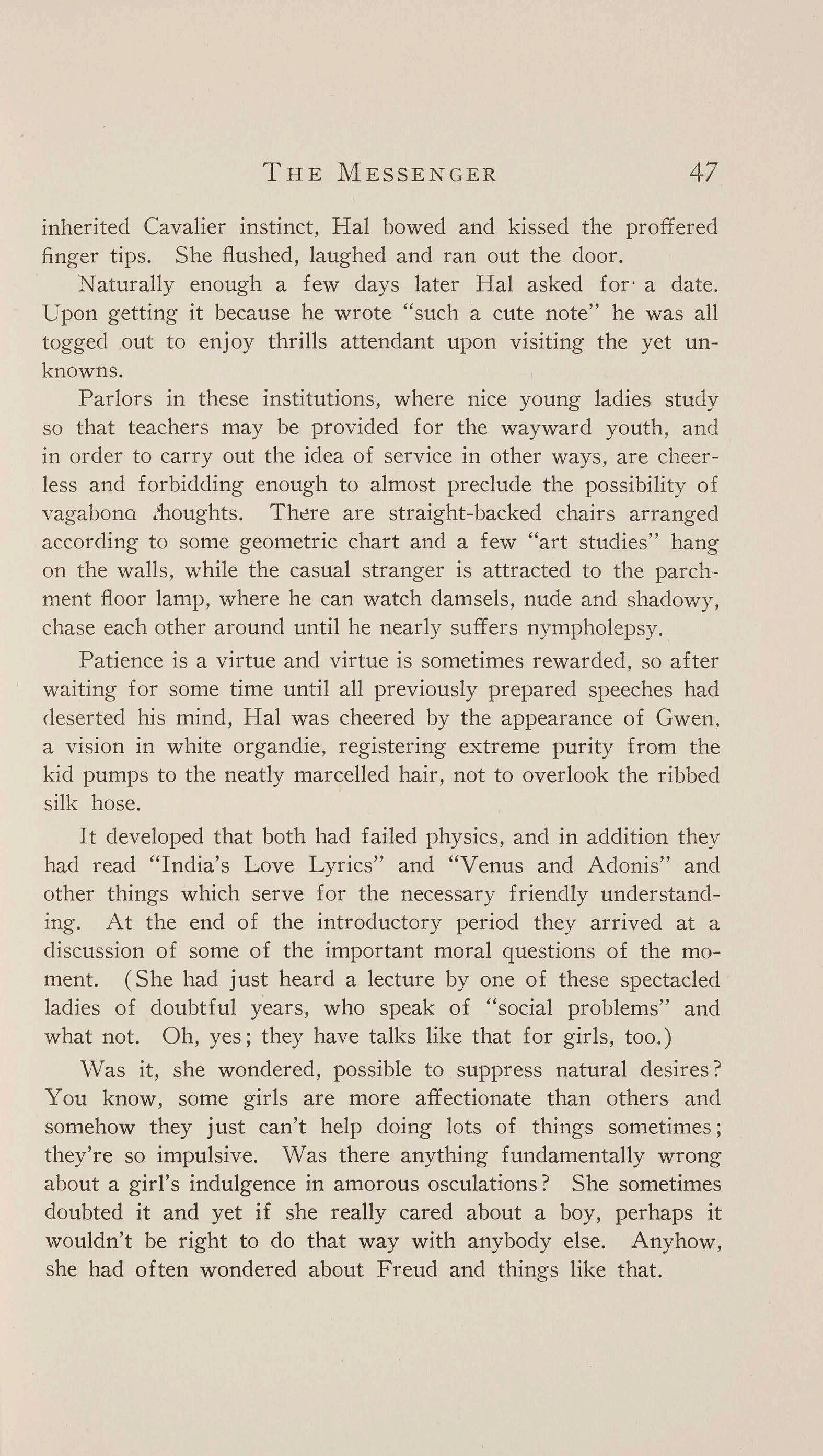
inherited Cavalier instinct, Hal bowed and kissed the proffered finger tips. She flushed, laughed and ran out the door.
Naturally enough a few clays later Hal asked for· a date. Upon getting it because he wrote "such a cute note" he was all togged out to enjoy thrills attendant upon visiting the yet unknowns.
Parlors in these institutions, where nice young ladies study so that teachers may be provided for the wayward youth, and in order to carry out the idea of service in other ways, are cheerless and forbidding enough to almost preclude the possibility of vagabono :houghts. There are straight-backed chairs arranged according to some geometric chart and a few "art studies" hang on the walls, while the casual stranger is attracted to the parchment floor lamp, where he can watch damsels, nude and shadowy, chase each other around until he nearly suffers nympholepsy.
Patience is a virtue and virtue is sometimes rewarded, so after waiting for some time until all previously prepared speeches had deserted his mind, Hal was cheered by the appearance of Gwen, a vision in white organdie, registering extreme purity from the kid pumps to the neatly marcellecl hair, not to overlook the ribbed silk hose.
It developed that both had failed physics, and in addition they had read "India's Love Lyrics" and "Venus and Adonis" and other things which serve for the necessary friendly understanding. At the end of the introductory period they arrived at a discussion of some of the important moral questions of the moment. ( She had just heard a lecture by one of these spectacled ladies of doubtful years, who speak of "social problems" and what not. Oh, yes; they have talks like that for girls, too.)
vVas it, she wondered, possible to suppress natural desires? You know, some girls are more affectionate than others and somehow they just can't help doing lots of things sometimes; they're so impulsive. Vvas there anything fundamentally wrong about a girl's indulgence in amorous osculations? She sometimes doubted it and yet if she really cared about a boy, perhaps it wouldn't be right to do that way with anybody else. Anyhow, she had of ten wondered about Freud and things like that.
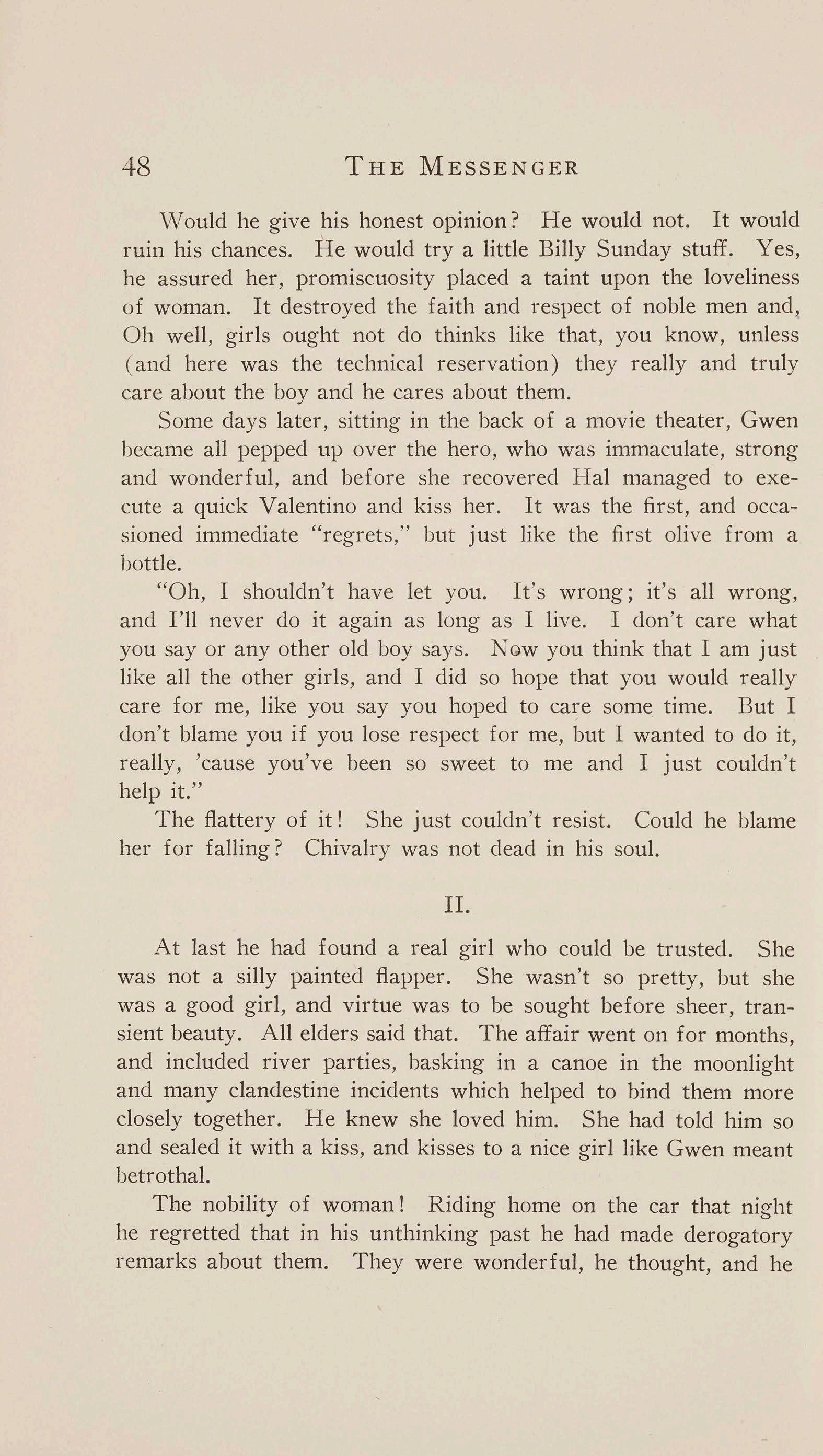
THE MESSENGER
Would he give his honest opinion? He would not. It would ruin his chances. He would try a little Billy Sunday stuff. Yes, he assured her, promiscuosity placed a taint upon the loveliness of woman. It destroyed the faith and respect of noble men and, Oh well, girls ought not do thinks like that, you know, unless ( and here was the technical reservation) they really and truly care about the boy and he cares about them.
Some clays later, sitting in the back of a movie theater, Gwen became all pepped up over the hero, who was immaculate, strong and wonderful, and before she recovered Hal managed to execute a quick Valentino and kiss her. It was the first, and occasioned immediate "regrets," but just like the first olive from a bottle.
"Oh, I shouldn't have let you. It ' s wrong; it's all wrong, and I'll never do it again as long as I live. I don't care what you say or any other old boy says. N Gw you think that I am just like all the other girls, and I did so hope that you would really care for me, like you say you hoped to care some time. But I don't blame you if you lose respect for me, but I wanted to do it, really, 'cause you've been so sweet to me and I just couldn't help it."
The flattery of it! She just couldn't resist. Could he blame her for falling? Chivalry was not dead in his soul.
II.
At last he had found a real girl who could be trusted. She was not a silly painted flapper. She wasn't so pretty, but she was a good girl, and virtue was to be sought before sheer, transient beauty. All elders said that. The affair went on for months, and included river parties, basking in a canoe in the moonlight and many clandestine incidents which helped to bind them more closely together. He knew she loved him. She had told him so and sealed it with a kiss, and kisses to a nice girl like Gwen meant betrothal.
The nobility of woman! Riding home on the car that night he regretted that in his unthinking past he had made derogatory remarks about them. They were wonderful, he thought, and he
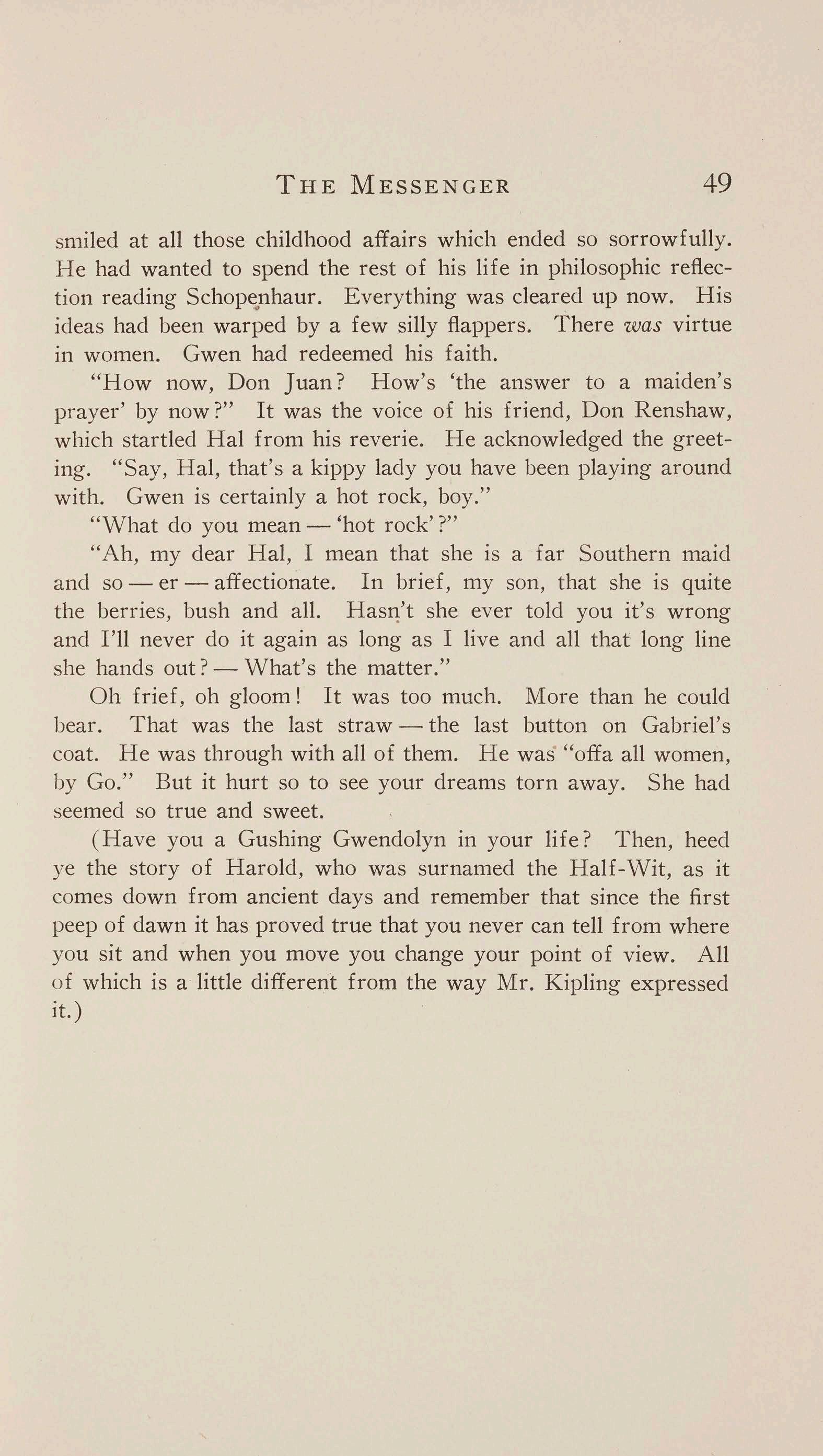
smiled at all those childhood affairs which ended so sorrowfully. He had wanted to spend the rest of his life in philosophic reflection reading Schop~nhaur. Everything was cleared up now. His ideas had been warped by a few silly flappers. There was virtue in women. Gwen had redeemed his faith.
"How now, Don Juan? How's 'the answer to a maiden's prayer' by now?" It was the voice of his friend, Don Renshaw, which startled Hal from his reverie. He acknowledged the greeting. "Say, Hal, that's a kippy lady you have been playing around with. Gwen is certainly a hot rock, boy."
"What do you mean -'hot rock' ?"
"Ah, my dear Hal, I mean that she is a far Southern maid and so -er -affectionate. In brief, my son, that she is quite the berries, bush and all. Hasrft she ever told you it's wrong and I'll never do it again as long as I live and all that long line she hands out?-What's the matter."
Oh frief, oh gloom! It was too much. More than he could bear. That was the last straw -the last button on Gabriel's coat. He was through with all of them. He was· "offa all women, by Go." But it hurt so to see your dreams torn away. She had seemed so true and sweet.
(Have you a Gushing Gwendolyn in your life? Then, heed ye the story of Harold, who was surnamed the Half-Wit, as it comes down from ancient days and remember that since the first peep of dawn it has proved true that you never can tell from where you sit and when you move you change your point of view. All o f which is a little different from the way Mr. Kipling expressed it.)
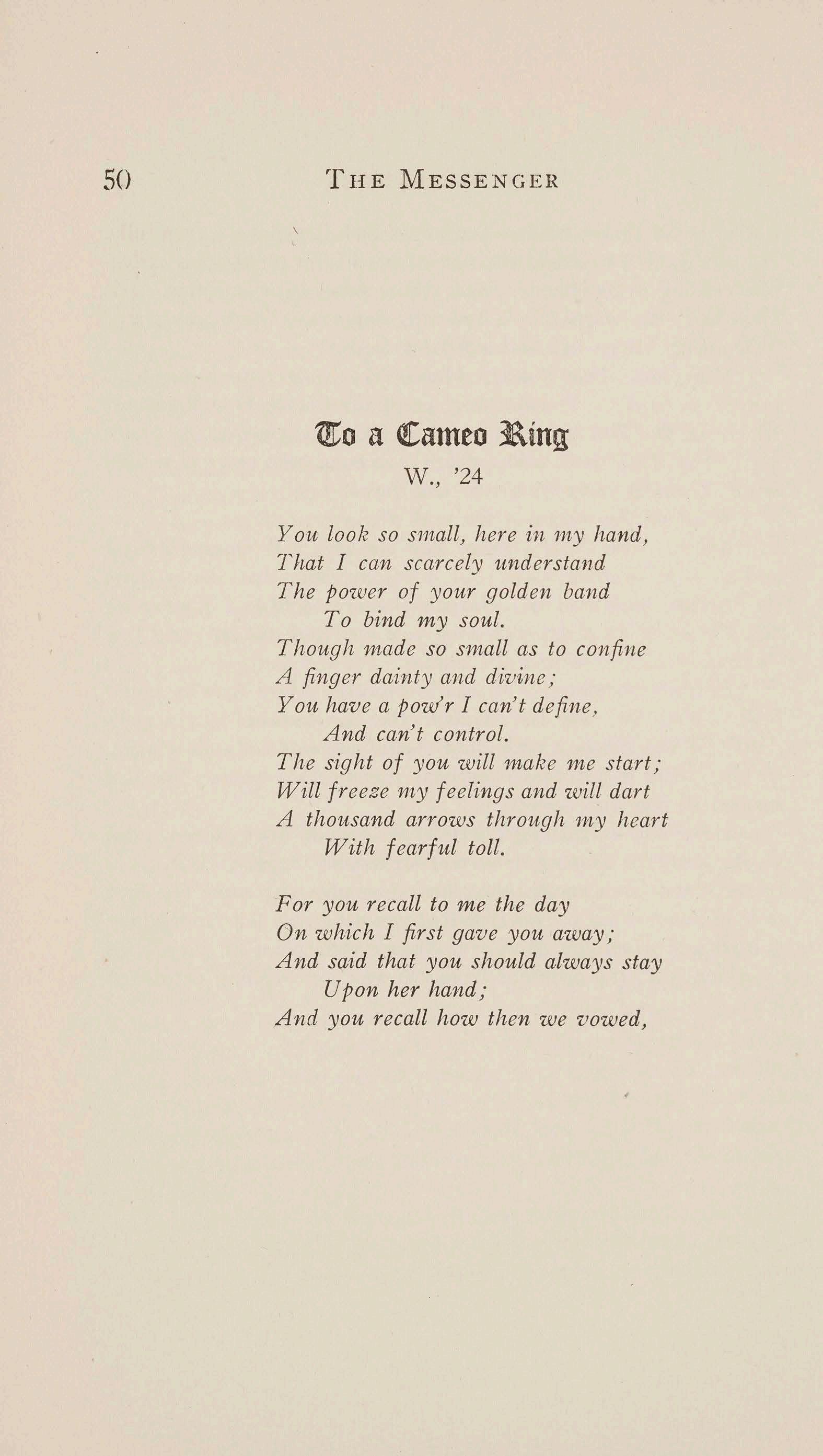
~o a Ql:ameol\ing vV., '24
You loo!? so small, here in my hand, That I can scarcely understand The power of your golden band To bind my soul. Though made so small as to confi11e A finger dainty and divine; You have a powr I can't define , And can't control. The sight of you will nwke me start; Will freeze my feelings and will dart A thousand arrows through 111yheart With fearful toll.
For you recall to me the day On which I first gave you away; And said that you should always stay Upan her hand; And you recall how then we vowed,
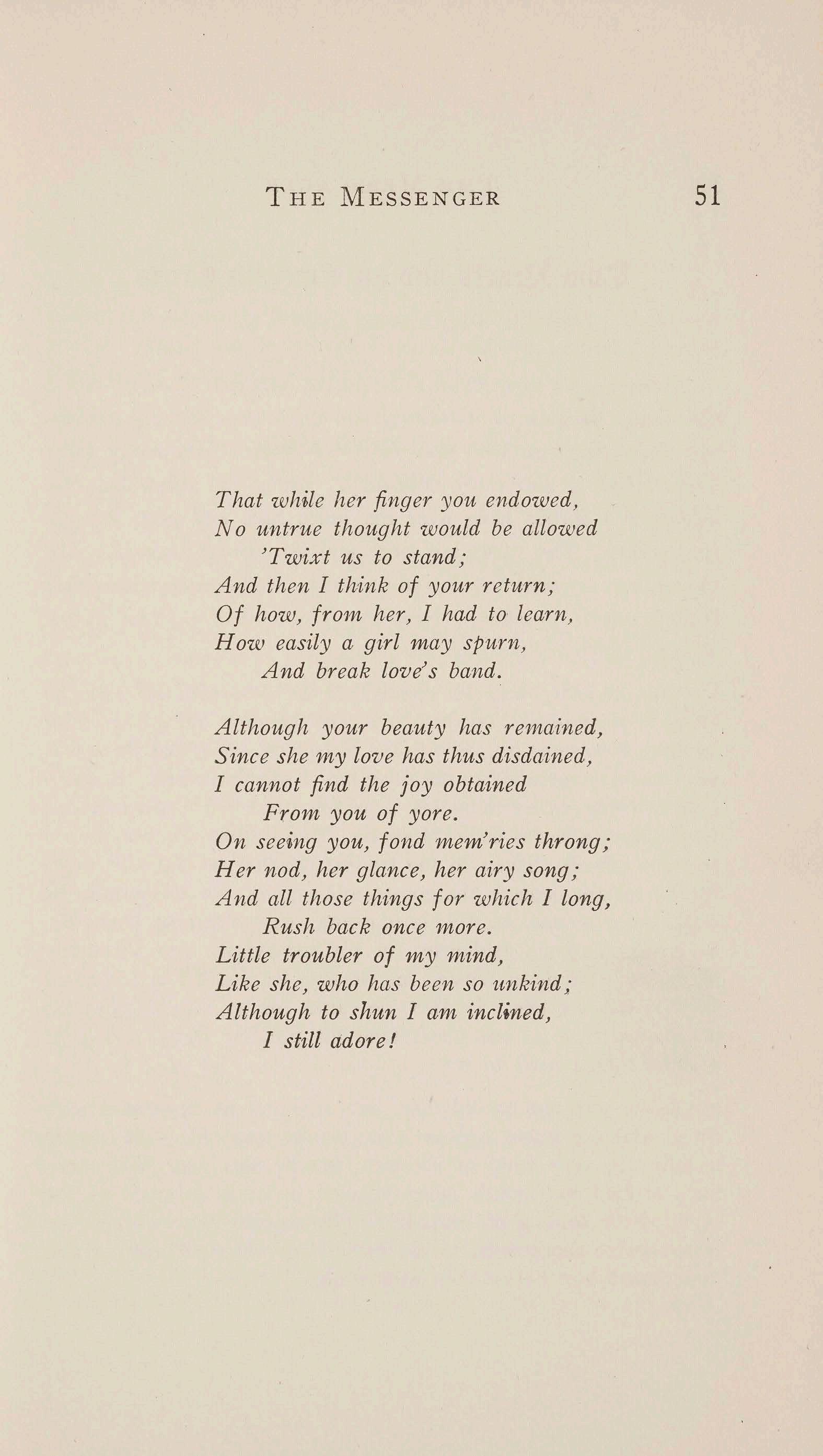
That while her finger you endowed, No untrue thought would be allowed 'Twixt us to stand; And then I think of your return; Of how, from her, I had to learn, How easily a girl may spurn, And break love's band.
Although your beauty has remained, Since she my love has thus disdained, I cannot find the joy obtained From you of yore.
On seeing you, fond mem'ries throng; Her nod, her glance, her airy song; And all those things for which I long, Rush back once more. Little troubler of my mind, Like she, who has been so unkind; Although to shun I am incltned, I still adore!
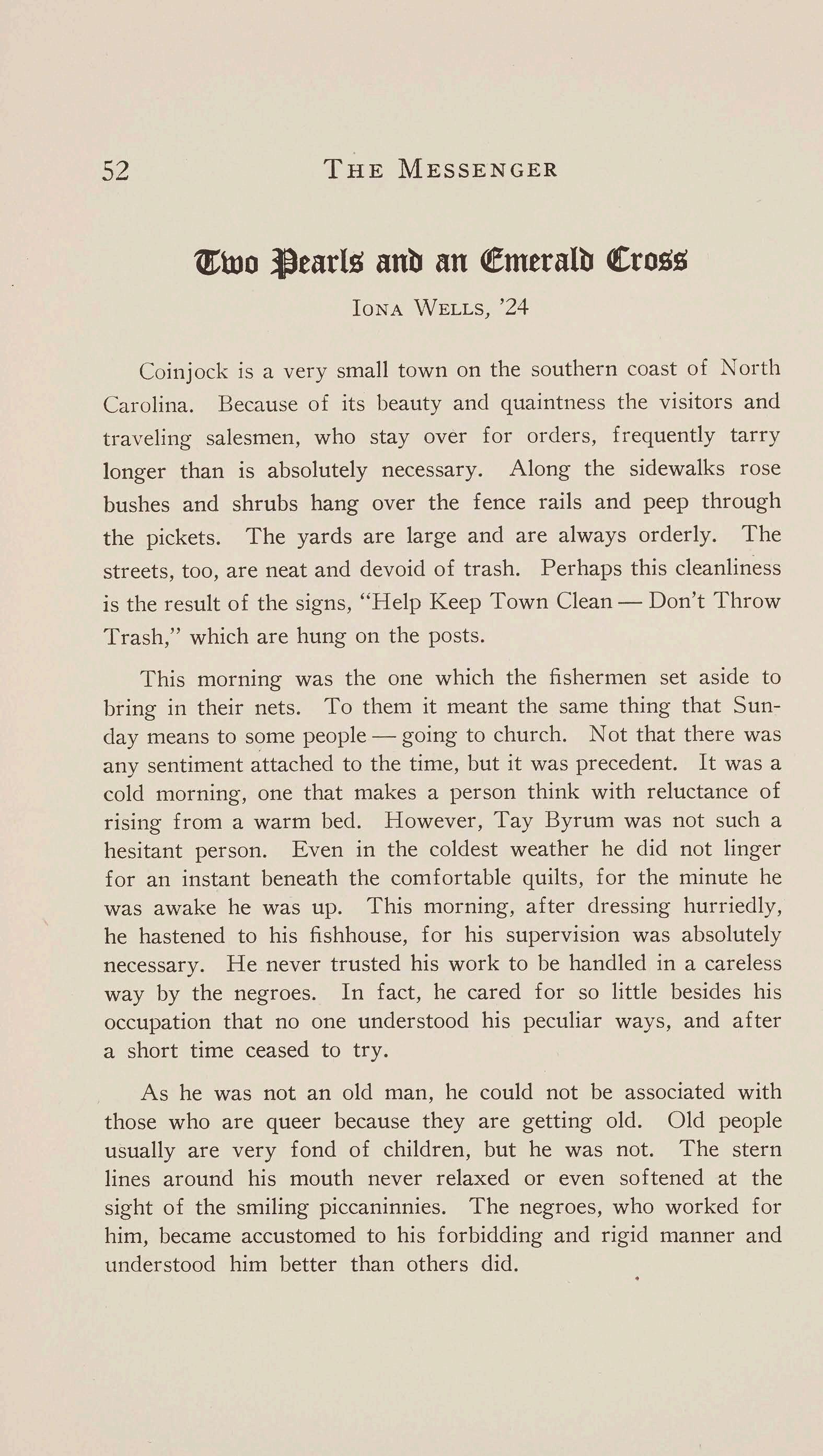
1iwo lQearlsanban Ql:meralbC!ross
loNA WELLS, '24
Coinj ock is a very small town on the southern coast of N orth Carolina. Because of its beauty and quaintne s s the visitors and traveling salesmen, who stay over for orders, frequently tarry longer than is absolutely necessary. Along the sidewalks rose bushes and shrubs hang over the fence rails and peep through the pickets. The yards are large and are always orderly. The streets, too, are neat and devoid of trash. Perhaps this cleanliness is the result of the sign s , "Help Keep Town Clean - Don't Throw Trash," which are hung on the posts.
This morning was the one which the fishermen set aside to bring in their nets. To them it meant the same thing that Sunday means to some people -going to church. N ot that there was any sentiment attached to the time, but it was precedent. It was a cold morning, one that makes a person think with reluctance of rising from a warm bed. However, Tay Byrum was not such a hesitant person. Even in the coldest weather he did not linger for an instant beneath the comfortable quilts, for the minute he was awake he was up. This morning, after dressing hurriedly, he hastened to his fishhouse, for his supervision was absolutely necessary. He never trusted his work to be handled in a careless way by the negroes. In fact, he cared for so little besides his occupation that no one understood his peculiar ways, and after a short time ceased to try.
As he was not an old man, he could not be associated with those who are queer because they are getting old. Old people usually are very fond of children, but he was not. The stern lines around his mouth never relaxed or even so£tened at the sight of the smiling piccaninnies. The negroes, who worked for him, became accustomed to his forbidding and rigid manner and understood him better than others did.
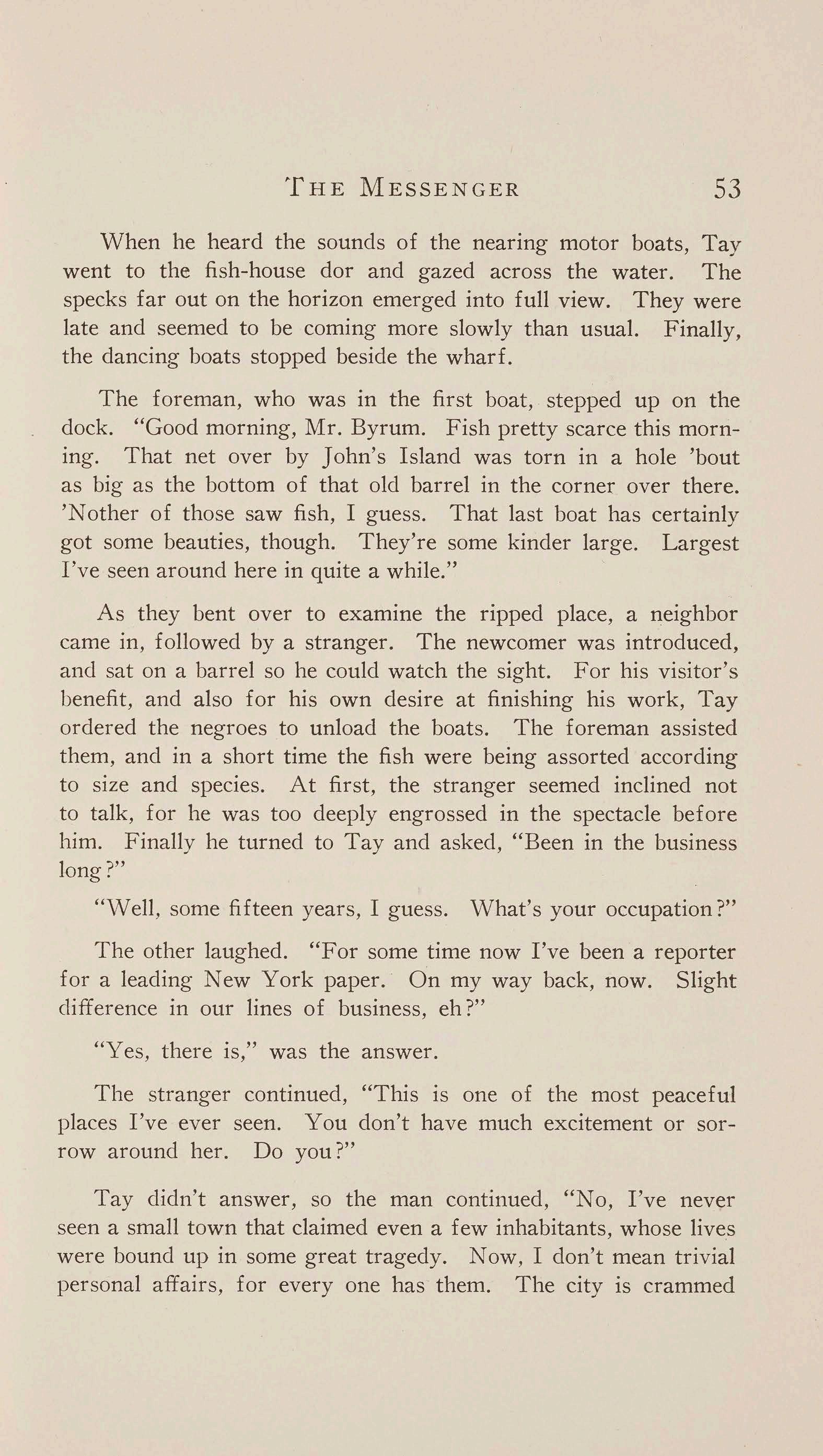
When he heard the sounds of the nearing motor boats, Tay went to the fish-house clor and gazed across the water. The specks far out on the horizon emerged into full view. They were late and seemed to be coming more slowly than usual. Finally, the dancing boats stopped beside the wharf.
The foreman, who was in the first boat, stepped up on the clock. "Good morning, Mr. Byrum. Fish pretty scarce this morning. That net over by John's Island was torn in a hole 'bout as big as the bottom of that old barrel in the corner over there. 'Nother of those saw fish, I guess. That last boat has certainly got some beauties, though. They're some kinder large. Largest I've seen around here in quite a while."
As they bent over to examine the ripped place, a neighbor came in, followed by a stranger. The newcomer was introduced, and sat on a barrel so he could watch the sight. For his visitor's benefit, and also for his own desire at finishing his work, Tay ordered the negroes to unload the boats. The foreman assisted them, and in a short time the fish were being assorted according to size and species. At first, the stranger seemed inclined not to talk, for he was too deeply engrossed in the spectacle before him. Finally he turned to Tay and asked, "Been in the business long?"
"Well, some fifteen years, I guess. What's your occupation?"
The other laughed. "For some time now I've been a reporter for a leading New York paper. On my way back, now. Slight difference in our lines of business, eh?"
"Yes, there is," was the answer.
The stranger continued, "This is one of the most peaceful places I've ever seen. You don't have much excitement or sorrow around her. Do you ?"
Tay didn't answer, so the man continued, "No, I've never seen a small town that claimed even a few inhabitants, whose live.s were bound up in some great tragedy. Now, I don't mean trivial personal affairs, for every one has them. The city is crammed
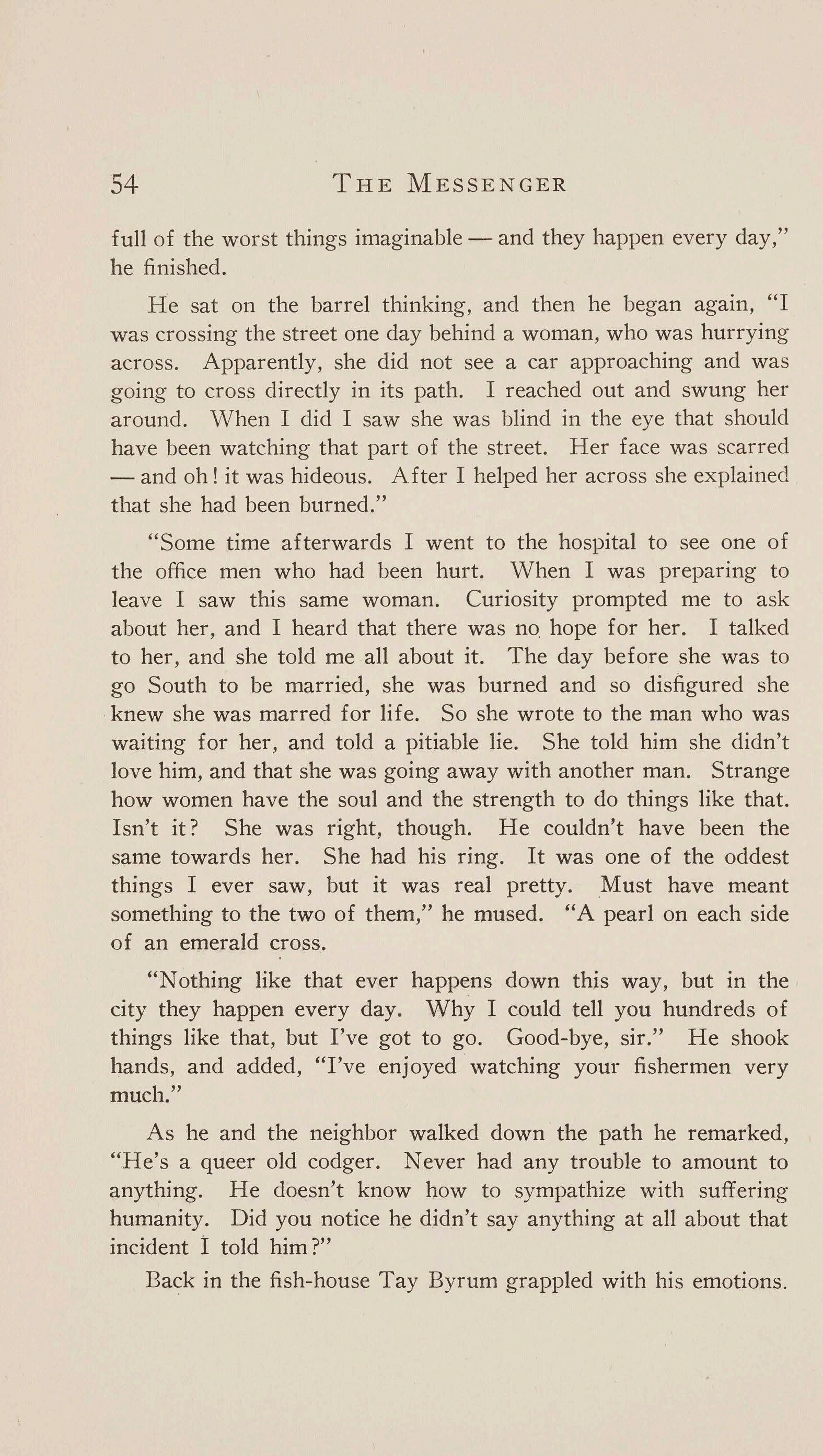
THE MESSENGER
full of the worst things imaginable -and they happen every day," he finished.
He sat on the barrel thinking, and then he began again, "I was crossing the street one day behind a woman, who was hurrying across. Apparently, she did not see a car approaching and was going to cross directly in its path. I reached out and swung her around. ·when I did I saw she was blind in the eye that should have been watching that part of the street. Her face was scarred -and oh! it was hideous. After I helped her across she explained that she had been burned."
"Some time afterwards I went to the hospital to see one of the office men who had been hurt. When I was preparing to leave I saw this same woman. Curiosity prompted me to ask about her, and I heard that there was no_hope for her. I talked to her, and she told me all about it. The day before she was to go South to be married, she was burned and so disfi.gured she knew she was marred for life. So she wrote to the man who was waiting for her, and told a pitiable lie. She told him she didn't love him, and that she was going away with another man. Strange how women have the soul and the strength to do things like that. Isn't it? She was right, though. He couldn't have been the same towards her. She had his ring. It was one of the oddest things I ever saw, but it was real pretty. Must have meant something to the two of them," he mused. "A pearl on each side of an emerald cross.
"Nothing like that ever happens down this way, but in the city they happen every day. Why I could tell you hundreds of things like that, but I've got to go. Good-bye, sir." He shook hands, and added, "I've enjoyed ·watching your fishermen very much."
As he and the neighbor walked down the path he remarked, "He's a queer old codger. Never had any trouble to amount to anything. He doesn't know how to sympathize with suffering humanity. Did you notice he didn't say anything at all about that incident i told him?"
Back in the fish-house Tay Byrum grappled with his emotions
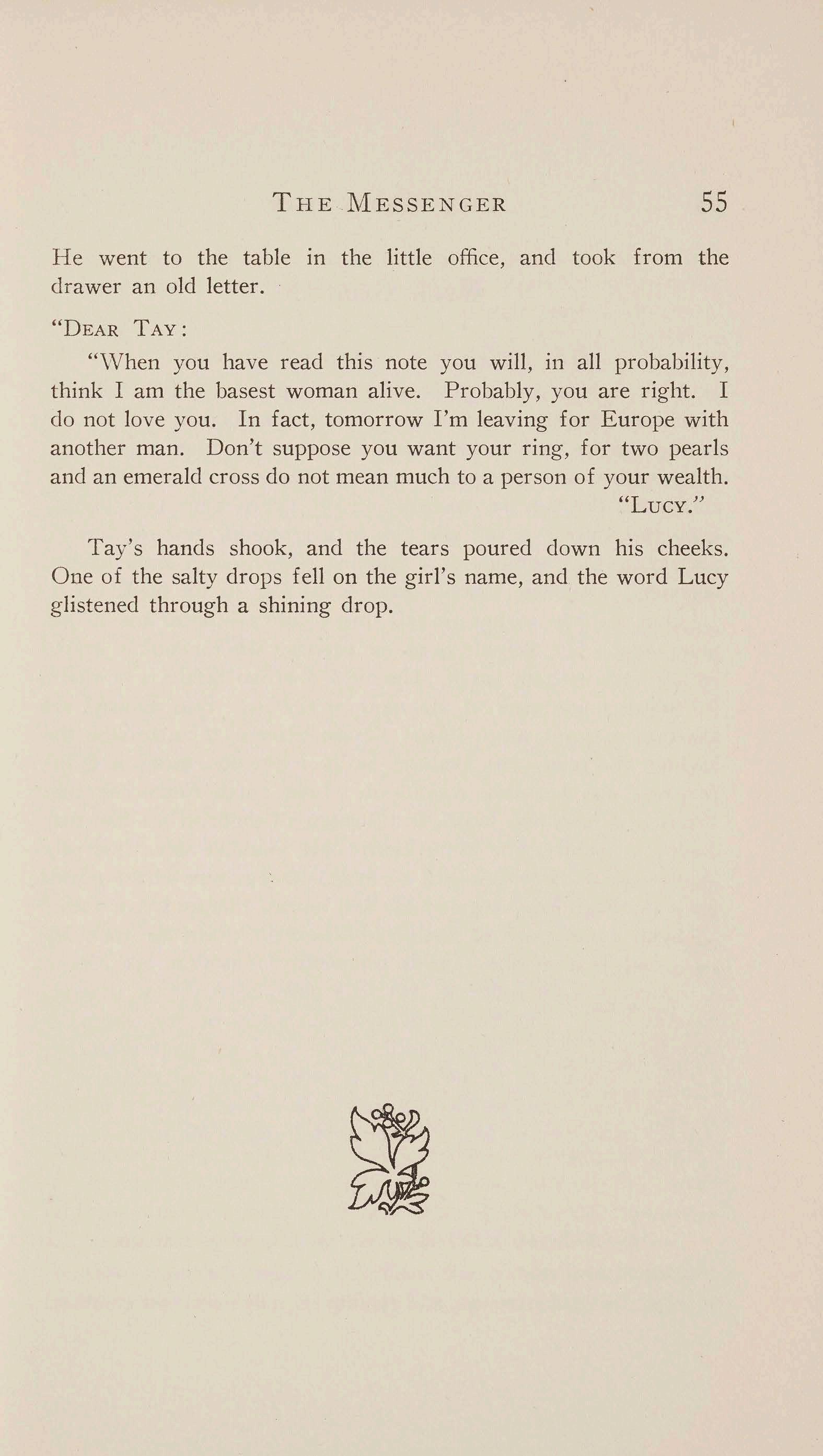
He went to the table in the little office, and took from the drawer an old letter.
"DEAR TAY:
"When you have read this note you will, in all probability, think I am the basest woman alive. Probably, you are right. I do not love you. In fact, tomorrow I'm leaving for Europe with another man. Don't suppose you want your ring, for two pearls and an emerald cross do not mean much to a person of your wealth.
"Lucv."
Tay's hands shook, and the tears poured clown his cheeks. One of the salty drops fell on the girl's name, and the word Lucy glistened through a shining drop.
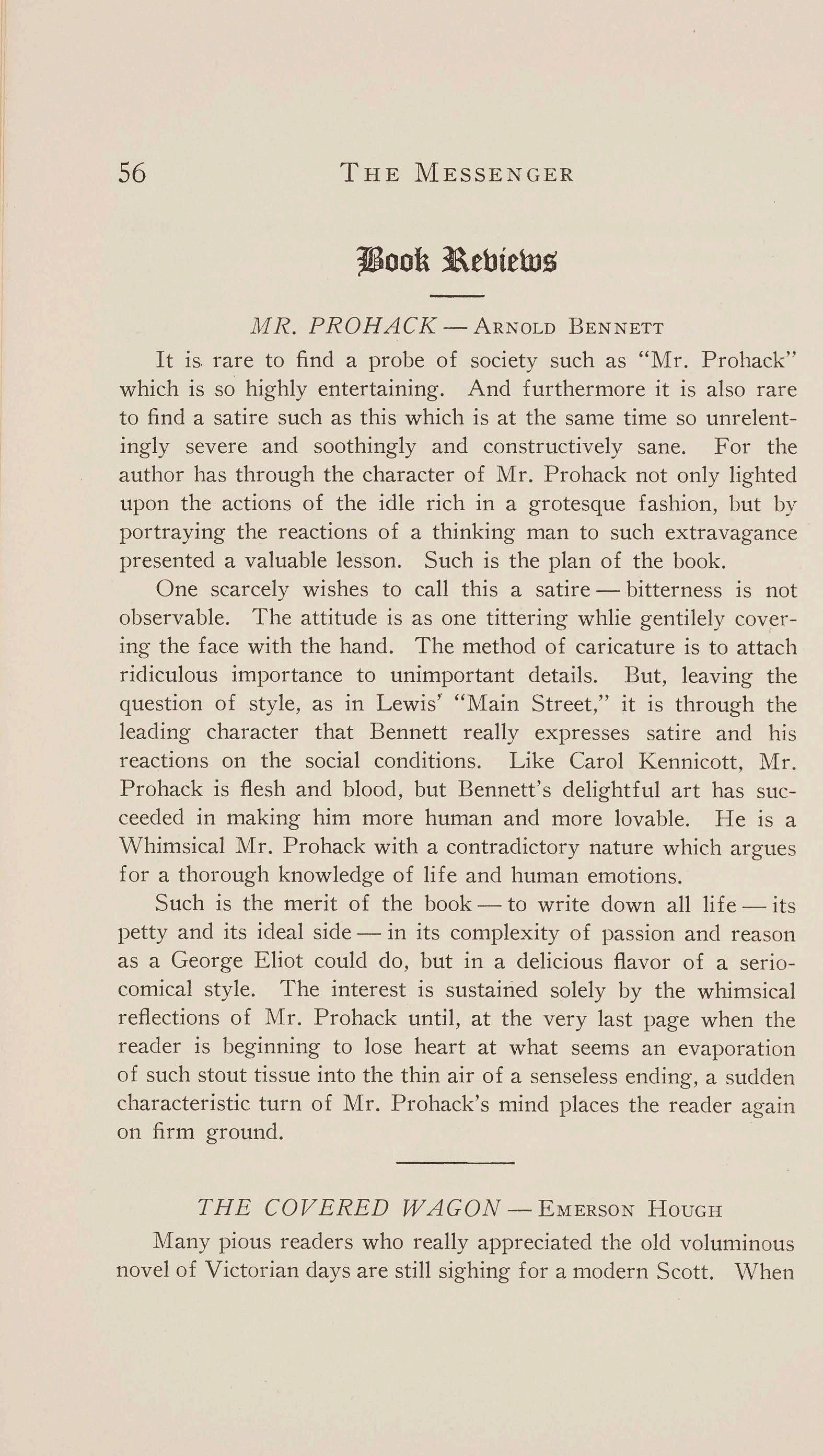
MR. PROHACK -ARNOLD BENNETT
It is. rare to find a probe of society such as "Mr. Prohack" which is so highly entertaining. And furthermore it is also rare to find a satire such as this which is at the same time so unrelentingly severe and soothingly and constructively sane. For the author has through the character of Mr. Prohack not only lighted upon the actions of the idle rich in a grotesque fashion, but by portraying the reactions of a thinking man to such extravagance presented a valuable lesson. Such is the plan of the book.
One scarcely wishes to call this a satire -bitterness is not observable. The attitude is as one tittering whlie gentilely covering the face with the hand. The method of caricature is to attach ridiculous importance to unimportant details. But, leaving the question of style, as in Lewis' "Main Street," it is through the leading character that Bennett really expresses satire and his reactions on the social conditions. Like Carol Kennicott, Mr. Prohack is flesh and blood, but Bennett's delightful art has succeeded in making him more human and more lovable. He is a Whimsical Mr. Prohack with a contradictory nature which argues for a thorough knowledge of life and human emotions.
Such is the merit of the book-to write down all life -its petty and its ideal side -in its complexity of passion and reason as a George Eliot could do, but in a delicious flavor of a seriocomical style. The interest is sustained solely by the whimsical reflections of Mr. Prohack until, at the very last page when the reader is beginning to lose heart at what seems an evaporation of such stout tissue into the thin air of a senseless ending, a sudden characteristic turn of Mr. Prohack's mind places the reader again on firm ground.
THE COVERED WAGON -EMERSON HOUGH
Many pious readers who really appreciated the old voluminous novel of Victorian days are still sighing for a modern Scott. vVhen
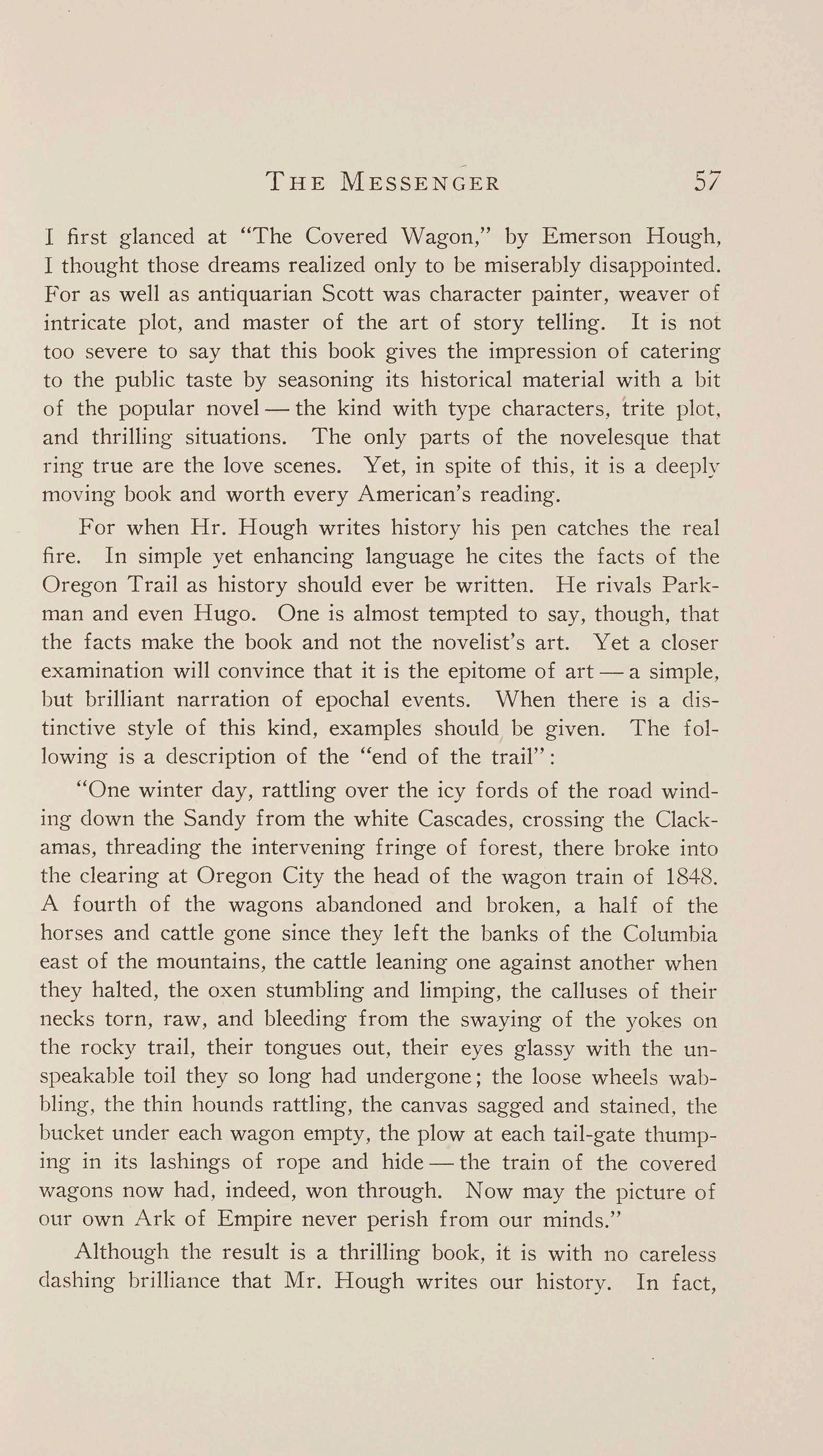
I first glanced at "The Covered vVagon," by Emerson Hough, I thought those dreams realized only to be miserably disappointed. For as well as antiquarian Scott was character painter, weaver of intricate plot, and master of the art of story telling. It is not too severe to say that this book gives the impression of catering to the public taste by seasoning its historical material with a bit of the popular novel -the kind with type characters, trite plot, and thrilling situations. The only parts of the novelesque that ring true are the love scenes. Yet, in spite of this, it is a deeply moving book and worth every American's reading.
For when Hr. Hough writes history his pen catches the real fire. In simple yet enhancing language he cites the facts of the Oregon Trail as history should ever be written. He rivals Parkman and even Hugo. One is almost tempted to say, though, that the facts make the book and not the novelist's art. Yet a closer examination will convince that it is the epitome of art -a simple, but brilliant narration of epochal events. When there 1s a distinctive style of this kind, examples should be given. The following is a description of the "end of the trail" : "One winter day, rattling over the icy fords of the road winding clown the Sandy from the white Cascades, crossing the Clackamas, threading the intervening fringe of forest, there broke into the clearing at Oregon City the head of the wagon train of 1848. A fourth of the wagons abandoned and broken, a half of the horses and cattle gone since they left the banks of the Columbia east of the mountains, the cattle leaning one against another when they halted, the oxen stumbling and limping, the calluses of their necks torn, raw, and bleeding from the swaying of the yokes on the rocky trail, their tongues out, their eyes glassy with the unspeakable toil they so long had undergone; the loose wheels wabbling, the thin hounds rattling, the canvas sagged and stained , the bucket under each wagon empty, the plow at each tail-gate thumping in its lashings of rope and hide -the train of the covered wagons now had, indeed, won through. Now may the picture of our own Ark of Empire never perish from our minds."
Although the result is a thrilling book, it is with no careless clashing brilliance that Mr. Hough writes our history. In fact,
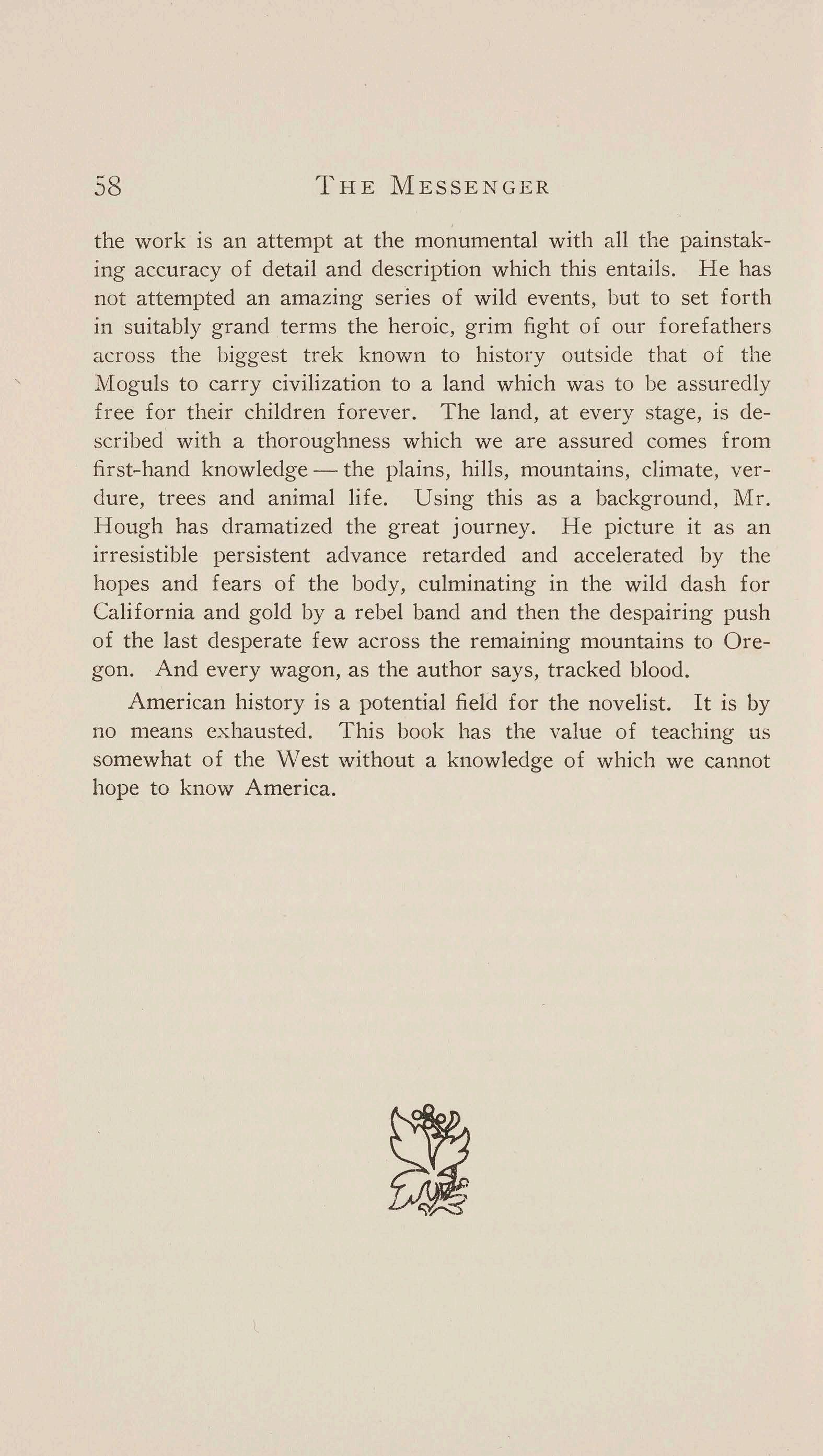
THE MESSENGER
the work is an attempt at the monumental with all the painstaking accuracy of detail and description which this entails. He has not attempted an amazing series of wild events, but to set forth in suitably grand terms the heroic, grim fight of our forefathers across the biggest trek known to history outside that of the Moguls to carry civilization to a land which was to be assuredly free for their children forever. The land, at every stage, is described with a thoroughness which we are assured comes from first-hand knowledge -the plains, hills, mountains, climate, verdure, trees and animal life. Using this as a background, Mr. Hough has dramatized the great journey. He picture it as an irresistible persistent advance retarded and accelerated by the hopes and fears of the body, culminating in the wild dash for California and gold by a rebel band and then the despairing push of the last desperate few across the remaining mountains to Oregon. And every wagon, as the author says, tracked blood. American history is a potential field for the novelist. It is by no means exhausted. This book has the value of teaching us somewhat of the West without a knowledge of which we cannot hope to know America.
